Oct 26, 2015 | Non categorizzato
His Holiness Bartholomew I, Ecumenical Patriarch of Constantinople, a pioneer in ecumenical dialogue and a peacemaker, will be receiving the first honory doctoral degree in the Culture of unity conferred by the Sophia University Institute, situated in Loppiano (Florence) and founded by Chiara Lubich to deal competently and effectively with the cultural transition taking place. The theologian Piero Coda, President of the University Institute said: “Today, the world needs people who seek the unity of the human family, and the Patriarch is constantly rendering a valuable service towards a culture that aims at placing fraternity at the heart of human history”. […]. Diretta streaming See more: Patriarch Bartholomew I visits the Focolare’s little town of Loppiano
![At the conclusion of the Synod on the Family]()
Oct 26, 2015 | Focolare Worldwide, Senza categoria
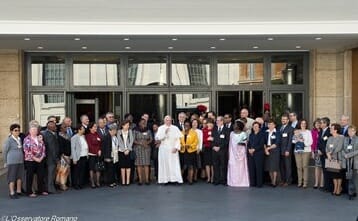 It was a living experience of the Church that was very important for them, a unique experience in their life that they will always carry in their hearts. That is how the family from Colombia described their experience – María Angélica, a dentist, and Luis, Director of the Ethics Department at the University of Gran Colombia, and their two sons of 18 and 20 years. From October 4th to the 25th, they attended the Ordinary Synod on the Family “The vocation and mission of the family in the Church and the contemporary world.” They have been working for families for over 20 years in connection with the Focolare Movement, accompanying couples in the process of preparing for marriage, and for the years that follow when the inevitable crises threaten to deteriorate the sacrament and the love. You had an active role in the work of the small groups. Which moments seemed important to you in making a contribution to the Synod? The experience in the small groups was quite beautiful, because we were able to offer our own experience and that of other families, presenting what we wish to live as a family: the dynamic of love that is lived in the Trinity – in which each of the Three Divine Persons is Love for the other. This is one thing we were able to contribute. Also: emphasising the importance of the Eucharist; we highlighted the need for the presence of Jesus amongst families through mutual love; and so we shared with them about the times we have asked forgiveness of one another when there was not full unity. Another contribution was the point about divorced and remarried couples. It is important to feel a particular love for these families. And that according to the measure in which the experience of faith in them begins to grow – accompanying them to the point that they feel that Jesus is also in their neighbour, in the Word of the Gospel that is meant to be lived, in the community that lives in mutual love – their nearness to Jesus grows. We felt that one important point to be presented to the Synod fathers was Jesus crucified and forsaken, since He took upon Himself the sufferings of humanity. In Him we see the one who was betrayed, humiliated, feeling alone, abandoned, culpable, left without an answer to His question. We are all joined in Him because He lived through all that, and in Him we can have this unique communion wherein all are contained in this yes to Him. This was our proposal: that there is no difference between the family that has not suffered failure and the one that has, because we have all feel accepted by Him. We described the experience of many families, also in the Movement, in which they had said this yes with the pain of not being able to receive the Eucharist, but still knowing that they were called to holiness. Therefore, they are not excluded from the invitation to holiness. As Pope Benedict once remarked: they highlight the beauty of the indissolubility of marriage; they are also builders of this indissolubility, so they make a huge contribution as they grow in this yes.
It was a living experience of the Church that was very important for them, a unique experience in their life that they will always carry in their hearts. That is how the family from Colombia described their experience – María Angélica, a dentist, and Luis, Director of the Ethics Department at the University of Gran Colombia, and their two sons of 18 and 20 years. From October 4th to the 25th, they attended the Ordinary Synod on the Family “The vocation and mission of the family in the Church and the contemporary world.” They have been working for families for over 20 years in connection with the Focolare Movement, accompanying couples in the process of preparing for marriage, and for the years that follow when the inevitable crises threaten to deteriorate the sacrament and the love. You had an active role in the work of the small groups. Which moments seemed important to you in making a contribution to the Synod? The experience in the small groups was quite beautiful, because we were able to offer our own experience and that of other families, presenting what we wish to live as a family: the dynamic of love that is lived in the Trinity – in which each of the Three Divine Persons is Love for the other. This is one thing we were able to contribute. Also: emphasising the importance of the Eucharist; we highlighted the need for the presence of Jesus amongst families through mutual love; and so we shared with them about the times we have asked forgiveness of one another when there was not full unity. Another contribution was the point about divorced and remarried couples. It is important to feel a particular love for these families. And that according to the measure in which the experience of faith in them begins to grow – accompanying them to the point that they feel that Jesus is also in their neighbour, in the Word of the Gospel that is meant to be lived, in the community that lives in mutual love – their nearness to Jesus grows. We felt that one important point to be presented to the Synod fathers was Jesus crucified and forsaken, since He took upon Himself the sufferings of humanity. In Him we see the one who was betrayed, humiliated, feeling alone, abandoned, culpable, left without an answer to His question. We are all joined in Him because He lived through all that, and in Him we can have this unique communion wherein all are contained in this yes to Him. This was our proposal: that there is no difference between the family that has not suffered failure and the one that has, because we have all feel accepted by Him. We described the experience of many families, also in the Movement, in which they had said this yes with the pain of not being able to receive the Eucharist, but still knowing that they were called to holiness. Therefore, they are not excluded from the invitation to holiness. As Pope Benedict once remarked: they highlight the beauty of the indissolubility of marriage; they are also builders of this indissolubility, so they make a huge contribution as they grow in this yes.  At times, it’s a matter of understanding the deep meaning of the sacrament. For many people of our day the sacrament of matrimony doesn’t say much, also because the couple has not been provided with an adequate formation, neither by parish nor ecclesial movement; whereas, it is a part of the journey of every human being to understand how to be human and to discover the transcendent dimension within oneself. It needs to be discovered how this sacrament can help in forming a family and why, through the family, we are responsible for children.” One day, coming out of the small group session, you felt the wish that the bishops would comprehend your deep love for the Church. . . “The relationship and the dialogue with the bishops has been drawing us closer and closer over the past few weeks, closer in knowing one another, listening to one another, also in trying to be ‘mothers’ towards them. For example, if they had a cough, a cold . . . we wished that they would be able to feel that we families also love the Church as they do; that we suffer for the Church as they do; that we also give our life for the Church. We’re on the same journey. As Chiara Lubich once told us: each one of us is like a piece of a mosaic, so our value lies in helping to create the beautiful reality that is the Church. It was very important that this was said – and heard.” One of your own offerings was included in the final document. “Yes, in the final small group meeting the relator asked if we would describe our experience as a family. Then, what was proposed for the final document also contained what each one of us had said. You can’t even tell, really, what was proposed by a family and what was proposed by a Synod father: it was everyone’s proposal, unanimously agreed upon.” What would your wish be for the conclusion of the Synod? “Many best wishes! The hope that, little by little, all families will discover the richness contained in them, no matter what their situation – ‘regular’ or ‘irregular’ – if they live as a real family, to make society better: for the growth of humanity.”
At times, it’s a matter of understanding the deep meaning of the sacrament. For many people of our day the sacrament of matrimony doesn’t say much, also because the couple has not been provided with an adequate formation, neither by parish nor ecclesial movement; whereas, it is a part of the journey of every human being to understand how to be human and to discover the transcendent dimension within oneself. It needs to be discovered how this sacrament can help in forming a family and why, through the family, we are responsible for children.” One day, coming out of the small group session, you felt the wish that the bishops would comprehend your deep love for the Church. . . “The relationship and the dialogue with the bishops has been drawing us closer and closer over the past few weeks, closer in knowing one another, listening to one another, also in trying to be ‘mothers’ towards them. For example, if they had a cough, a cold . . . we wished that they would be able to feel that we families also love the Church as they do; that we suffer for the Church as they do; that we also give our life for the Church. We’re on the same journey. As Chiara Lubich once told us: each one of us is like a piece of a mosaic, so our value lies in helping to create the beautiful reality that is the Church. It was very important that this was said – and heard.” One of your own offerings was included in the final document. “Yes, in the final small group meeting the relator asked if we would describe our experience as a family. Then, what was proposed for the final document also contained what each one of us had said. You can’t even tell, really, what was proposed by a family and what was proposed by a Synod father: it was everyone’s proposal, unanimously agreed upon.” What would your wish be for the conclusion of the Synod? “Many best wishes! The hope that, little by little, all families will discover the richness contained in them, no matter what their situation – ‘regular’ or ‘irregular’ – if they live as a real family, to make society better: for the growth of humanity.”
Oct 25, 2015 | Non categorizzato
“God created the family, and he formed it in this way. He wants there to be love between husband and wife. If love is missing, there’s no marriage, no matrimony. Unfortunately, because of sin, this love has been spoiled to some extent. This love has been clouded over because sin entered humanity. So Jesus came and healed the situation, bringing a stronger love, a greater love, the very love that comes from God, the love which is God himself. So, we must take advantage of what Jesus brought, use this love in order to maintain natural love as well. For example, if you didn’t love your husband any more, you would have to love him because he is Jesus, because he is another Jesus, because you have to be the first to love, because you have to love everyone, because you have to make yourself one, because you have to love him as yourself. In other words, you bring supernatural love into the situation, with all that it means, in order to safeguard human love too. This is what to do and this way of doing things is the foundation of our New Families Movement.” Source: Chiara Lubich Center Video (italian soundtrack) https://vimeo.com/142517715
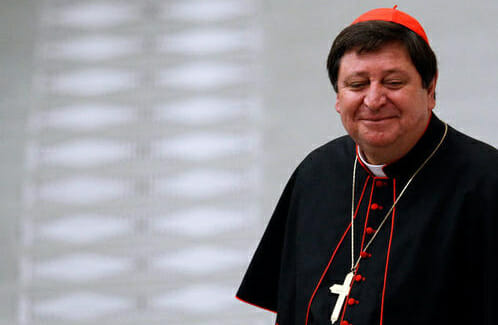
Oct 25, 2015 | Non categorizzato
 “It was the Son of God, Jesus Christ who revealed to us the true image of God and the true image of man and woman. God is Father, Son and Holy Spirit. We are, therefore, not dealing with three gods but one God in three Persons, as lengthily described in the doctrine of the Trinity. The Church has deepened and preserved this doctrine in all its integrity throughout the centuries. Besides finding the correct language in its profession of faith, the Church has always adored the Three Divine Persons. Up to the present, the spiritual Trinitarian doctrine has shown us the deep relationship the disciples of Jesus had with each of these Three Divine Persons. The Word of God does not present God only as a perfect Spirit, creator of heaven and earth, (as declared in the Christian Doctrine’s Second Catechism), but affirms that “God is love” (1 John 4,8.16). Saint Augustine tried to delve deeper into the path of love in God and reached the point of affirming that God is the Lover, the Beloved, and Love itself. However, he felt incapable of pursuing this path and bequeathed to us the deepening of this mystery in man and woman, in the three qualities of intelligence, memory and will. But what remained to be fully developed was the deeper understanding of the mystery of God who is Love. In our time, in which culture affirms the individual up to the point of falling into an exasperated individualism, and we struggle to make the synthesis between unity and diversity in the human relationships in this globalised world where human relationships are still re-evaluated in all senses, it would be opportune to seek in the Holy Trinity, that essentially Christian foundation, the path towards the fulfillment of love as a human identity. What is love? How can we understand and experience love? Our pathway must be found in the pathway of He who came to us from the womb of the Father, that is, the Son. To meet man, God who is love made himself nothing (Nazareth, Maria, Joseph, Bethlehem, the flight to Egypt. The Cross) (cfr text of Paul to the Philppians 2,5-11). Love passes through the incarnation and the mystery of the resurrection. Love makes itself nothing to be able to meet the other. This is the Kenotic dimension of love. Without this path it would be difficult for man and woman to find that relationship with God, but also with each other, whether man or woman. In this sense I think we could find the Trinitarian path of anthropology, not only theoretically but concretely.”
“It was the Son of God, Jesus Christ who revealed to us the true image of God and the true image of man and woman. God is Father, Son and Holy Spirit. We are, therefore, not dealing with three gods but one God in three Persons, as lengthily described in the doctrine of the Trinity. The Church has deepened and preserved this doctrine in all its integrity throughout the centuries. Besides finding the correct language in its profession of faith, the Church has always adored the Three Divine Persons. Up to the present, the spiritual Trinitarian doctrine has shown us the deep relationship the disciples of Jesus had with each of these Three Divine Persons. The Word of God does not present God only as a perfect Spirit, creator of heaven and earth, (as declared in the Christian Doctrine’s Second Catechism), but affirms that “God is love” (1 John 4,8.16). Saint Augustine tried to delve deeper into the path of love in God and reached the point of affirming that God is the Lover, the Beloved, and Love itself. However, he felt incapable of pursuing this path and bequeathed to us the deepening of this mystery in man and woman, in the three qualities of intelligence, memory and will. But what remained to be fully developed was the deeper understanding of the mystery of God who is Love. In our time, in which culture affirms the individual up to the point of falling into an exasperated individualism, and we struggle to make the synthesis between unity and diversity in the human relationships in this globalised world where human relationships are still re-evaluated in all senses, it would be opportune to seek in the Holy Trinity, that essentially Christian foundation, the path towards the fulfillment of love as a human identity. What is love? How can we understand and experience love? Our pathway must be found in the pathway of He who came to us from the womb of the Father, that is, the Son. To meet man, God who is love made himself nothing (Nazareth, Maria, Joseph, Bethlehem, the flight to Egypt. The Cross) (cfr text of Paul to the Philppians 2,5-11). Love passes through the incarnation and the mystery of the resurrection. Love makes itself nothing to be able to meet the other. This is the Kenotic dimension of love. Without this path it would be difficult for man and woman to find that relationship with God, but also with each other, whether man or woman. In this sense I think we could find the Trinitarian path of anthropology, not only theoretically but concretely.”

Oct 24, 2015 | Focolare Worldwide
 “We also felt the need to do something for all the poor families in our city. And we discovered that here in Teramo (Italy), the Caritas association runs an emporium where they collect basic goods for those in need. And so, with our parents, we visited this emporium and having discovered – to our great joy – that some bakers in the city donate not only the leftovers but also fresh bread, we decided to take eggs, jam, toilet paper, and refreshing tissues (since, as they said, they work like water). We filled up three trolleys with gifts!!! We all, kids and adults were all very happy, because we discovered a way of helping people who have nothing to eat. Now that we know about this special supermarket, we shall return and try to involve all our friends.” (The gen4 and gen3 boys and girls of Teramo, Italy)
“We also felt the need to do something for all the poor families in our city. And we discovered that here in Teramo (Italy), the Caritas association runs an emporium where they collect basic goods for those in need. And so, with our parents, we visited this emporium and having discovered – to our great joy – that some bakers in the city donate not only the leftovers but also fresh bread, we decided to take eggs, jam, toilet paper, and refreshing tissues (since, as they said, they work like water). We filled up three trolleys with gifts!!! We all, kids and adults were all very happy, because we discovered a way of helping people who have nothing to eat. Now that we know about this special supermarket, we shall return and try to involve all our friends.” (The gen4 and gen3 boys and girls of Teramo, Italy)
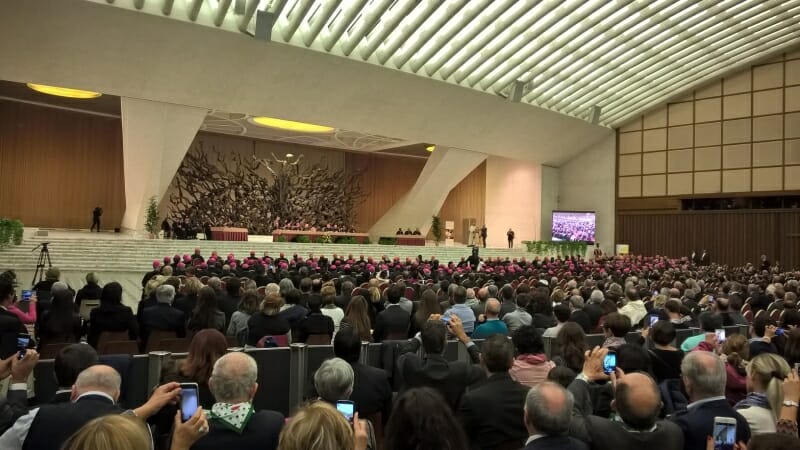
Oct 24, 2015 | Senza categoria
 It was a solemn celebration in the presence of all the synod Fathers, delegations, ambassadors and Pope Francis – who gave one of the most important speeches of his pontificate – on 17 October in the Nervi Hall, to commemorate 50 years since the institution of the Bishops’ Synod by Pope Paul VI. Focolare President, Maria Voce defined it, “a masterpiece”, when asked to comment on the spur of the moment, on the Pope’s speech. “He illustrated that there cannot be a progress of the Church if not as a synodal body. I was struck when he underlined the importance of the sensus fidei, that is, the sense of faith, and the infallibility of the people of God, who together listen to the Holy Spirit, thus expressing the faith of the Church. And this starts always from the base. In this manner, with all the juridical collegiate figures that emerged after the Second Vatican Council – Pope Francis makes us see – that if we don’t live this synodal spirit, starting from the people it addresses, they will not serve to enhance communion. They would all be just masks.” And regarding the primacy of service: “Let us never forget this!” the Pope exclaimed. “For the disciples of Jesus, of the past, today and for always, the only authority is that of service, the sole power is the cross, in the Master’s words: ”’You know that the governors of the nations rule over them and the leaders oppress them. Among you it will not be so; whoever wishes to be great among you, will be your servant and whoever wants to be first among you, will be your slave’ (Mt 20,25-27). Among you it will not be so: in this expression we reach that very heart in which we have been trying for some time now to reflect ourselves, exactly in the sense which he explained: “the top is found below the base. Due to this, those who exert authority are called ‘ministers’ because, according to the original meaning of the word, they are the smallest among all.” What comes out once more in his speech is the same wavelength between Pope Francis and Patriarch Bartholomew I: “The commitment to build a synodal Church – a mission to which we are all called, each in the role the Lord entrusted us with – is burdened by ecumenical implications. Due to this, in speaking to a delegation of the Patriarchate of Costantinople, I recently stressed the conviction that ‘the careful examination of how the principle of synodality is expressed in the life of the church and the service of he who presides it, will offer an important contribution to the progress of relationships between our Churches.” Maria Voce also underlined, “It is a synergy – that not only regards the problems of creation expressed in the encyclical Laudato si’; it is precisely this feeling of synodality of the Church that pushes Pope Francis to open a door to say: we must get together as one. It is a responsibility that urges him to find a way of getting down to concrete steps towards a full communion among Christians, because only in this can the synodal spirit of the Church be seen.” Lastly, Maria Voce continued, “The effort is not to seek compromises, but that which the Holy Spirit wants to say to us, which is a challenge that requires a strong unity of the entire Church. We spoke with various participants of the Synod for Families in the past days, and also with the family of married focolarini from Colombia, María Angélica and Luis Rojas, and all asked us for prayers. So let us intensify our prayers as if we were there, trying to understand how to respond to the anguish and difficulties of the family in the modern world, and regard the family as part of God’s plan.” The motivation and strong words of Paul VI that accompanied the institution of the Synod of Bishops on 15 September 1965 are particularly important for the Focolare Movement, precisely because the institution of the Synod, Maria Voce explained, “brought a new climate within the Church, a turning point: that of collegiality, communion, passing from a manner of conducting the individual and rather hierarchical Church, to a collegial one. As the Focolare Movement, as a movement of unity, we thus could not but take this event into consideration, and with joy I accepted Cardinal Baldisseri’s invitation to participate in the commemoration.” The Synods, in fact, are the concrete prosecution of the Second Vatican Council: «Paul VI, evidently inspired by the Holy Spirit after having made such a beautiful experience of the council, which had stirred up new realities in the Church – just think of the documents Gaudium et Spes, Lumen Gentium, Nostra Aetate – felt that this experience had to continue.» “Synod,” in fact, precisely means “journey together” as Cardinal Schönborn explained in his speech on the birth of the Synod of Bishops and on the various Synods, with the force of the Pope. It thus means that «the Church is walking together, not the Pope by himself, the bishops by themselves, the people of God by themselves, or the laity by themselves: this journey is undertaken by the Church, in which all have something to say and give.” Read more: press release on the participation of the Focolare in the commemoration of the 50th anniversary of the Synod of Bishops.
It was a solemn celebration in the presence of all the synod Fathers, delegations, ambassadors and Pope Francis – who gave one of the most important speeches of his pontificate – on 17 October in the Nervi Hall, to commemorate 50 years since the institution of the Bishops’ Synod by Pope Paul VI. Focolare President, Maria Voce defined it, “a masterpiece”, when asked to comment on the spur of the moment, on the Pope’s speech. “He illustrated that there cannot be a progress of the Church if not as a synodal body. I was struck when he underlined the importance of the sensus fidei, that is, the sense of faith, and the infallibility of the people of God, who together listen to the Holy Spirit, thus expressing the faith of the Church. And this starts always from the base. In this manner, with all the juridical collegiate figures that emerged after the Second Vatican Council – Pope Francis makes us see – that if we don’t live this synodal spirit, starting from the people it addresses, they will not serve to enhance communion. They would all be just masks.” And regarding the primacy of service: “Let us never forget this!” the Pope exclaimed. “For the disciples of Jesus, of the past, today and for always, the only authority is that of service, the sole power is the cross, in the Master’s words: ”’You know that the governors of the nations rule over them and the leaders oppress them. Among you it will not be so; whoever wishes to be great among you, will be your servant and whoever wants to be first among you, will be your slave’ (Mt 20,25-27). Among you it will not be so: in this expression we reach that very heart in which we have been trying for some time now to reflect ourselves, exactly in the sense which he explained: “the top is found below the base. Due to this, those who exert authority are called ‘ministers’ because, according to the original meaning of the word, they are the smallest among all.” What comes out once more in his speech is the same wavelength between Pope Francis and Patriarch Bartholomew I: “The commitment to build a synodal Church – a mission to which we are all called, each in the role the Lord entrusted us with – is burdened by ecumenical implications. Due to this, in speaking to a delegation of the Patriarchate of Costantinople, I recently stressed the conviction that ‘the careful examination of how the principle of synodality is expressed in the life of the church and the service of he who presides it, will offer an important contribution to the progress of relationships between our Churches.” Maria Voce also underlined, “It is a synergy – that not only regards the problems of creation expressed in the encyclical Laudato si’; it is precisely this feeling of synodality of the Church that pushes Pope Francis to open a door to say: we must get together as one. It is a responsibility that urges him to find a way of getting down to concrete steps towards a full communion among Christians, because only in this can the synodal spirit of the Church be seen.” Lastly, Maria Voce continued, “The effort is not to seek compromises, but that which the Holy Spirit wants to say to us, which is a challenge that requires a strong unity of the entire Church. We spoke with various participants of the Synod for Families in the past days, and also with the family of married focolarini from Colombia, María Angélica and Luis Rojas, and all asked us for prayers. So let us intensify our prayers as if we were there, trying to understand how to respond to the anguish and difficulties of the family in the modern world, and regard the family as part of God’s plan.” The motivation and strong words of Paul VI that accompanied the institution of the Synod of Bishops on 15 September 1965 are particularly important for the Focolare Movement, precisely because the institution of the Synod, Maria Voce explained, “brought a new climate within the Church, a turning point: that of collegiality, communion, passing from a manner of conducting the individual and rather hierarchical Church, to a collegial one. As the Focolare Movement, as a movement of unity, we thus could not but take this event into consideration, and with joy I accepted Cardinal Baldisseri’s invitation to participate in the commemoration.” The Synods, in fact, are the concrete prosecution of the Second Vatican Council: «Paul VI, evidently inspired by the Holy Spirit after having made such a beautiful experience of the council, which had stirred up new realities in the Church – just think of the documents Gaudium et Spes, Lumen Gentium, Nostra Aetate – felt that this experience had to continue.» “Synod,” in fact, precisely means “journey together” as Cardinal Schönborn explained in his speech on the birth of the Synod of Bishops and on the various Synods, with the force of the Pope. It thus means that «the Church is walking together, not the Pope by himself, the bishops by themselves, the people of God by themselves, or the laity by themselves: this journey is undertaken by the Church, in which all have something to say and give.” Read more: press release on the participation of the Focolare in the commemoration of the 50th anniversary of the Synod of Bishops.
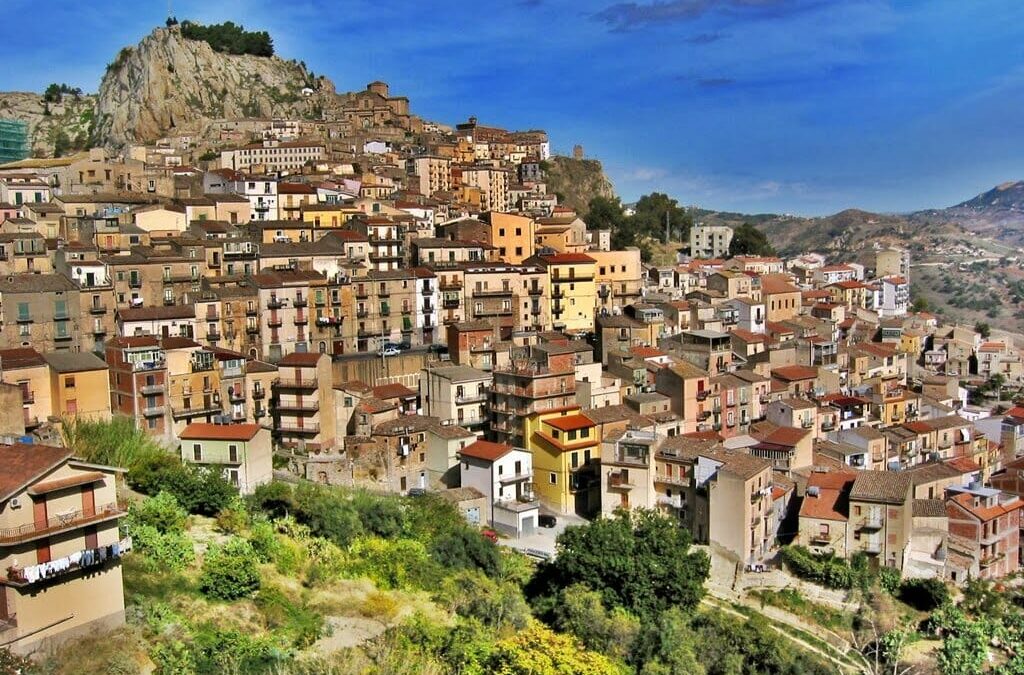
Oct 24, 2015 | Non categorizzato
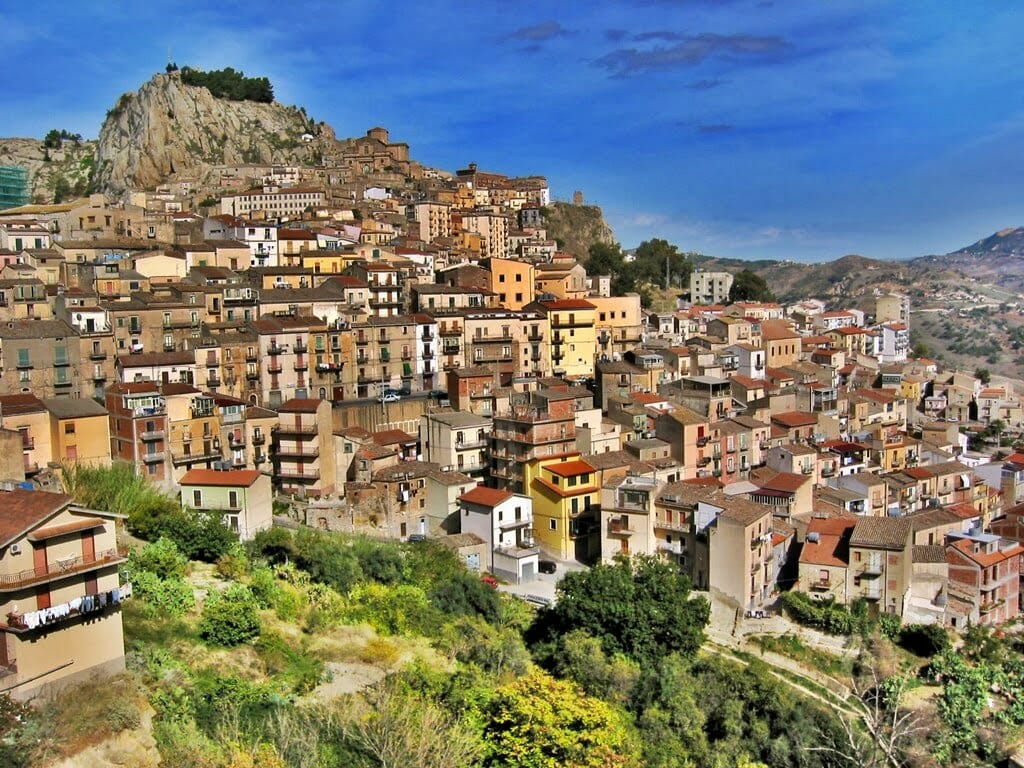 “I live in Nicosia and was born and grew up in an Orthodox family that was Christian in name only. There was no depth, no relationship with Jesus. Indeed, God was the ally of my parents, and they seemed to have a monopoly on Him when they wanted us to obey them. When I finished high school, I received a scholarship to study orthodontics in Hungary. It was difficult for me to get used to the new sitaution. For the first time I was far from my family, living with people I didn’t know. Back then, we were far from the multicultural spirit that prevails today. I was filled with prejudices, with an attitude of rejection. During that year I encountered many disappointments, also from my friends. Meanwhile, the deep search for a more authentic life had begun in me. At the new college I met a Hungarian girl. I had been struck by her cheerfulness and also the way she accepted others. She even offered to help me learn Hungarian. Disappointed by my previous experience with friends, her way of acting made me wonder: ‘Is she sincere, or only kidding?’ But . . . I began to trust her. We shared joys, sorrows, failures and also material things. When she went home to her family on the weekends, around 50 km from Budapest, she took me along so that I wouldn’t be missing my own family. Her family were farmers, very loving, warm and hospitable. But there was one question: Every day at the same hour, and one evening every week she would disappear without explanation. All I knew was that she was with other friends. It turns out that she was with several young women who belonged to the growing Focolare community in Hungary. Back then – when were under the Socialist Regime – anyone discovered belonging to a religious movement was persecuted with serious consequences, such as loss of one’s job, or place at university. One day she felt comfortable enough to confide in me. She told me how she had come to know the Focolare Movement. A priest from her village had recounted to her the story of Chiara Lubich, a young woman like us, of our same age, and how she had been struck by the fact that during the Second World War, Chiara saw everything crumbling around her and the only ideal that didn’t crumble under the bombs was God. She wanted God to be her ideal in life, and to live according to His will. She explained to me that she and those young women she met with were trying to do the same thing. They placed God first in their life, living the Word of Life each day, a sentence taken from the Gospel with an explanation by Chiara. Then they recounted their daily experiences to each other, as a gift for each other. Everything she told me touched me so deeply, I began reading the New Testament, which I had never done before, and this was a decisive moment for my future. Life began to change. All the people I met each day, I could no longer ignore them, nor judge them, nor undervalue them, because now a new mentality had been born in me: we’re all children of One Father and therefore brothers and sisters to each other. Every person is a candidate for the unity that Jesus asked of His Father: that all may be one: the good, the bad, the ugly, the unlikeable, the big and the small. . . The theology of the Fathers had been awakened in me, especically that saying of Saint John Chrysostom: ‘I see my brother, I see my God’. The walls of prejudice that I built up within me, began to crumble. I realised that the Gospel was not only something to be read out in church and that was it; rather, it could bring about a revolution if we took it seriously and translated it into daily life: at the university, at the factory, at the hospital, in the family! Amidst all of this enthusiasm and joy that was filling my life, there was one great sorrow: The other girls were all Catholics, and I was the only Orthodox. They attended Mass every day. I strongly desired to be with them in those moments, but they suggested that I look for my Orthodox Church in Budapest so that I could attend the Liturgy and receive the Eucharist. This separation was painful, but Chiara had invited the members of the Movement belonging to other Christian Churches, to love their Churches, just as she had loved hers. This explanation gave me peace and, once again, it confirmed in me the wisdom, love and descretion that Chiara possessed in front of the believers of different Churches. It could not have been anything but the fruit of God’s intervention in our times. I found the Orthodox parish and got to know it more. I went every Sunday and, with the permission of the priest was able to receive Holy Communion any time there was a Divine Liturgy. They never left me alone in this new initiative. The other young Catholic women often attended the Liturgy with me. The liturgical and sacramental life was no longer something formal or external, but a relationship that was building with Jesus, the activation of God’s grace in my heart that helped in the daily struggles and increased the fruits of love, joy and peace within me.” At Istanbul, March 14, 2015, on the occasion of the publication of the Greek editions of Chiara Lubich’s writings.
“I live in Nicosia and was born and grew up in an Orthodox family that was Christian in name only. There was no depth, no relationship with Jesus. Indeed, God was the ally of my parents, and they seemed to have a monopoly on Him when they wanted us to obey them. When I finished high school, I received a scholarship to study orthodontics in Hungary. It was difficult for me to get used to the new sitaution. For the first time I was far from my family, living with people I didn’t know. Back then, we were far from the multicultural spirit that prevails today. I was filled with prejudices, with an attitude of rejection. During that year I encountered many disappointments, also from my friends. Meanwhile, the deep search for a more authentic life had begun in me. At the new college I met a Hungarian girl. I had been struck by her cheerfulness and also the way she accepted others. She even offered to help me learn Hungarian. Disappointed by my previous experience with friends, her way of acting made me wonder: ‘Is she sincere, or only kidding?’ But . . . I began to trust her. We shared joys, sorrows, failures and also material things. When she went home to her family on the weekends, around 50 km from Budapest, she took me along so that I wouldn’t be missing my own family. Her family were farmers, very loving, warm and hospitable. But there was one question: Every day at the same hour, and one evening every week she would disappear without explanation. All I knew was that she was with other friends. It turns out that she was with several young women who belonged to the growing Focolare community in Hungary. Back then – when were under the Socialist Regime – anyone discovered belonging to a religious movement was persecuted with serious consequences, such as loss of one’s job, or place at university. One day she felt comfortable enough to confide in me. She told me how she had come to know the Focolare Movement. A priest from her village had recounted to her the story of Chiara Lubich, a young woman like us, of our same age, and how she had been struck by the fact that during the Second World War, Chiara saw everything crumbling around her and the only ideal that didn’t crumble under the bombs was God. She wanted God to be her ideal in life, and to live according to His will. She explained to me that she and those young women she met with were trying to do the same thing. They placed God first in their life, living the Word of Life each day, a sentence taken from the Gospel with an explanation by Chiara. Then they recounted their daily experiences to each other, as a gift for each other. Everything she told me touched me so deeply, I began reading the New Testament, which I had never done before, and this was a decisive moment for my future. Life began to change. All the people I met each day, I could no longer ignore them, nor judge them, nor undervalue them, because now a new mentality had been born in me: we’re all children of One Father and therefore brothers and sisters to each other. Every person is a candidate for the unity that Jesus asked of His Father: that all may be one: the good, the bad, the ugly, the unlikeable, the big and the small. . . The theology of the Fathers had been awakened in me, especically that saying of Saint John Chrysostom: ‘I see my brother, I see my God’. The walls of prejudice that I built up within me, began to crumble. I realised that the Gospel was not only something to be read out in church and that was it; rather, it could bring about a revolution if we took it seriously and translated it into daily life: at the university, at the factory, at the hospital, in the family! Amidst all of this enthusiasm and joy that was filling my life, there was one great sorrow: The other girls were all Catholics, and I was the only Orthodox. They attended Mass every day. I strongly desired to be with them in those moments, but they suggested that I look for my Orthodox Church in Budapest so that I could attend the Liturgy and receive the Eucharist. This separation was painful, but Chiara had invited the members of the Movement belonging to other Christian Churches, to love their Churches, just as she had loved hers. This explanation gave me peace and, once again, it confirmed in me the wisdom, love and descretion that Chiara possessed in front of the believers of different Churches. It could not have been anything but the fruit of God’s intervention in our times. I found the Orthodox parish and got to know it more. I went every Sunday and, with the permission of the priest was able to receive Holy Communion any time there was a Divine Liturgy. They never left me alone in this new initiative. The other young Catholic women often attended the Liturgy with me. The liturgical and sacramental life was no longer something formal or external, but a relationship that was building with Jesus, the activation of God’s grace in my heart that helped in the daily struggles and increased the fruits of love, joy and peace within me.” At Istanbul, March 14, 2015, on the occasion of the publication of the Greek editions of Chiara Lubich’s writings.
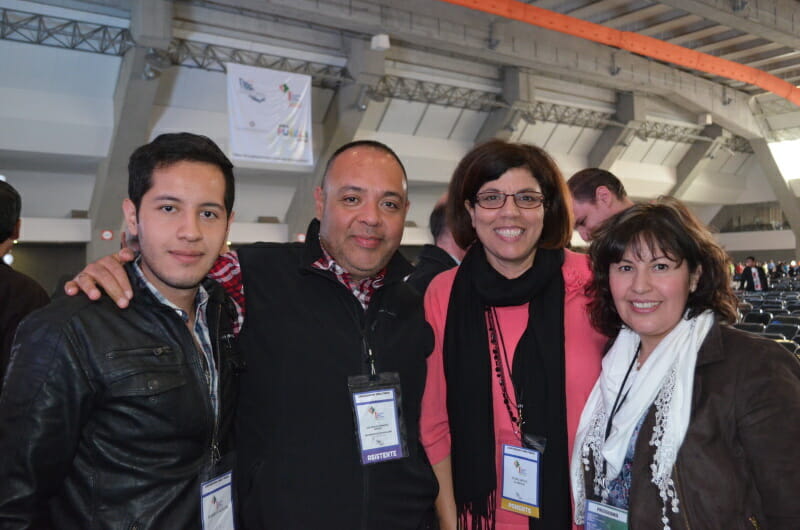
Oct 23, 2015 | Non categorizzato
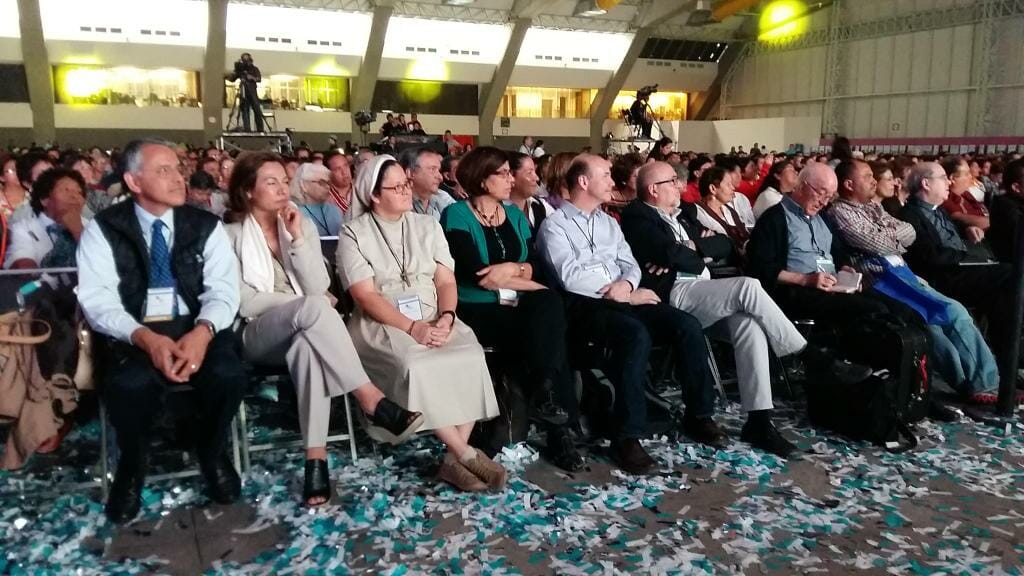 “It’s a historic event”; “There’s no turning back”; “Only through our communion will we solve the problems of Mexico.” These were some of the phrases that were joyfully echoing in the corridors of the Centro Expositor, an avant-garde but functional structure that adds to the already rich architectural patrimony of the city of Puebla. The slogan “Young people, family and life united in the joy of the New Evangelisation” was the backdrop of the three-day conference (October 16-18, 2015). Accompanying the reflections presented at the main assembly, there was also a series of reports and roundtables, with twenty simultaneous focus groups that strengthened awareness in the thousands of participants, of the important social role that comes with being part of a Church movement.
“It’s a historic event”; “There’s no turning back”; “Only through our communion will we solve the problems of Mexico.” These were some of the phrases that were joyfully echoing in the corridors of the Centro Expositor, an avant-garde but functional structure that adds to the already rich architectural patrimony of the city of Puebla. The slogan “Young people, family and life united in the joy of the New Evangelisation” was the backdrop of the three-day conference (October 16-18, 2015). Accompanying the reflections presented at the main assembly, there was also a series of reports and roundtables, with twenty simultaneous focus groups that strengthened awareness in the thousands of participants, of the important social role that comes with being part of a Church movement. 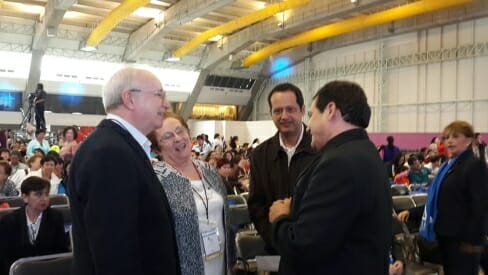 The first report was presented by Anna and Alberto Friso, members of the Pontifical Council for the Family, who examined the challenges to an institution that is more and more under attack due to the influence of individualism , but which remains as a light for society precisely because it is a “little church”. A variety of academics, civil leaders and members of the most prestigious institutions in the country, such as IMDOSOC, Mexicanos Primeros, A favor de lo mejor, México Evalúa and others, offered interesting presentations that helped to understand this North American country from many different angles: politics, mass media, education and social action. Among the testimonies there were also three aritsts of international fame: Liana Rebolledo, Eduardo Verástegui and Emmanuel. A very touching testimony was given by Margaret Karran, an Arab Christian focolarina from Haifa who up to a short time before had lived in the Holy Land in direct contact with the diverse religious expressions that are found there.
The first report was presented by Anna and Alberto Friso, members of the Pontifical Council for the Family, who examined the challenges to an institution that is more and more under attack due to the influence of individualism , but which remains as a light for society precisely because it is a “little church”. A variety of academics, civil leaders and members of the most prestigious institutions in the country, such as IMDOSOC, Mexicanos Primeros, A favor de lo mejor, México Evalúa and others, offered interesting presentations that helped to understand this North American country from many different angles: politics, mass media, education and social action. Among the testimonies there were also three aritsts of international fame: Liana Rebolledo, Eduardo Verástegui and Emmanuel. A very touching testimony was given by Margaret Karran, an Arab Christian focolarina from Haifa who up to a short time before had lived in the Holy Land in direct contact with the diverse religious expressions that are found there.

Margaret Karram (second from right)
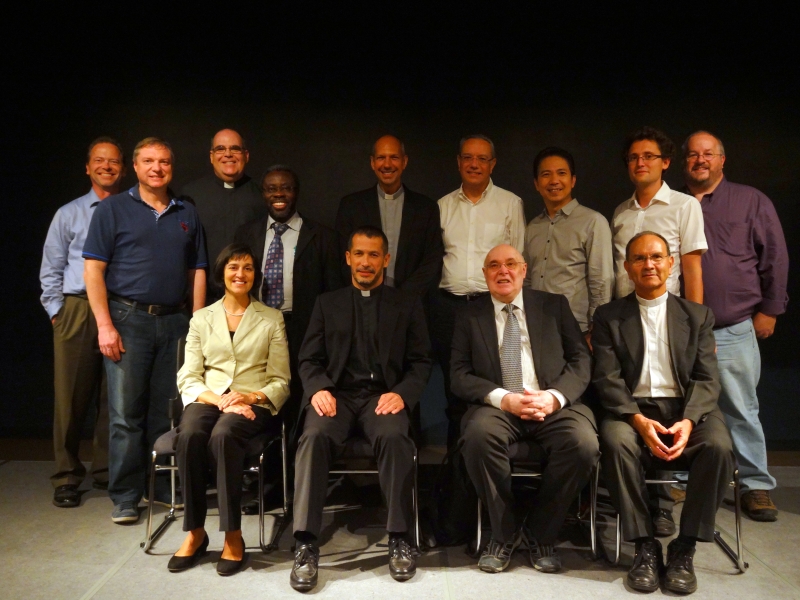
Oct 22, 2015 | Non categorizzato
 “The place of my dreams, ever since I was small, was Canada. I would certainly never have dreamed of actually going there, much less in a town called Saskatoon in the prairies of Saskatchewan. Even more beautiful was the reason that brought me there. I went to take part in the final session of the Consultation between the World Evangelical Alliance (WEA) and the Pontifical Council for Promoting Christian Unity of which I have been a member since 2009. I thought back over some experiences that were undertaken with Lutherans in South Brazil that followed a safe path. But with the first contact, I immediately realised that here it was another reality. I encountered a group of Evangelicals – in some countries they are called ‘Evangelists’, in others ‘Evangelicals’. There was a group of Christians included amongst them from different churches: Lutheran, Reformed, Baptist, Pentecostal, Mennonite and Anglican. They identified with a common missionary project, while living and being Church in very different ways from one another. There were thirteen of us – five Catholics and eight Evangelicals. I was the only lay person, and a woman. They came from Brazil, Canada, Colombia, Philippines, Germany, Guatemala, Italy, Kenya, Spain and the United States. It was an unforgettable week marked by prayer, study, reflection and, at times, heated discussions. The questions we asked helped us to know one another better, especially on a confessional and missionary level: What do we have in common? What still divides us? The diversity I encountered was a valuable enrichment and a serious challenge. Above all, we tried to clarify our positions in order to overcome the conflicts through truthful dialogue in charity. It wasn’t easy, and there wasn’t a lack of problems. We experienced the pain of the divisions. We realised that the road ahead would be long. What to do? Let it go, or carry on? Personally, I discovered that any obstacle can become an opportunity for dialogue and an invitation to have an even greater measure of love. We faced the problems in the light of the Gospel, working like real disciples of Christ. Amongst the Catholics were bishops, priests and laity; and we also came from different countries and backgrounds, different points of view. Yet, together, we managed to have a living experience of full and real communion which we enjoy. This is fraternal communion born over years together, along with the hope that every one of us can contribute something towards the reconciliation between Catholics and Evangelicals in our own country. Now, we are awaiting the publication of the final report of this Consultation. Because of the personal friendship established with them, Pope Francis has triggered a new ‘march’ of this dialogue. Encouraged by him, we would like to promote this experience everywhere, because it is in the local community that we live with one another; it is there that we forgive one another; and it is there that we offer the witness that Jesus asks us for: “By this everyone will know that you are my disciples, if you have love for one another” (Jn 13:35).
“The place of my dreams, ever since I was small, was Canada. I would certainly never have dreamed of actually going there, much less in a town called Saskatoon in the prairies of Saskatchewan. Even more beautiful was the reason that brought me there. I went to take part in the final session of the Consultation between the World Evangelical Alliance (WEA) and the Pontifical Council for Promoting Christian Unity of which I have been a member since 2009. I thought back over some experiences that were undertaken with Lutherans in South Brazil that followed a safe path. But with the first contact, I immediately realised that here it was another reality. I encountered a group of Evangelicals – in some countries they are called ‘Evangelists’, in others ‘Evangelicals’. There was a group of Christians included amongst them from different churches: Lutheran, Reformed, Baptist, Pentecostal, Mennonite and Anglican. They identified with a common missionary project, while living and being Church in very different ways from one another. There were thirteen of us – five Catholics and eight Evangelicals. I was the only lay person, and a woman. They came from Brazil, Canada, Colombia, Philippines, Germany, Guatemala, Italy, Kenya, Spain and the United States. It was an unforgettable week marked by prayer, study, reflection and, at times, heated discussions. The questions we asked helped us to know one another better, especially on a confessional and missionary level: What do we have in common? What still divides us? The diversity I encountered was a valuable enrichment and a serious challenge. Above all, we tried to clarify our positions in order to overcome the conflicts through truthful dialogue in charity. It wasn’t easy, and there wasn’t a lack of problems. We experienced the pain of the divisions. We realised that the road ahead would be long. What to do? Let it go, or carry on? Personally, I discovered that any obstacle can become an opportunity for dialogue and an invitation to have an even greater measure of love. We faced the problems in the light of the Gospel, working like real disciples of Christ. Amongst the Catholics were bishops, priests and laity; and we also came from different countries and backgrounds, different points of view. Yet, together, we managed to have a living experience of full and real communion which we enjoy. This is fraternal communion born over years together, along with the hope that every one of us can contribute something towards the reconciliation between Catholics and Evangelicals in our own country. Now, we are awaiting the publication of the final report of this Consultation. Because of the personal friendship established with them, Pope Francis has triggered a new ‘march’ of this dialogue. Encouraged by him, we would like to promote this experience everywhere, because it is in the local community that we live with one another; it is there that we forgive one another; and it is there that we offer the witness that Jesus asks us for: “By this everyone will know that you are my disciples, if you have love for one another” (Jn 13:35).
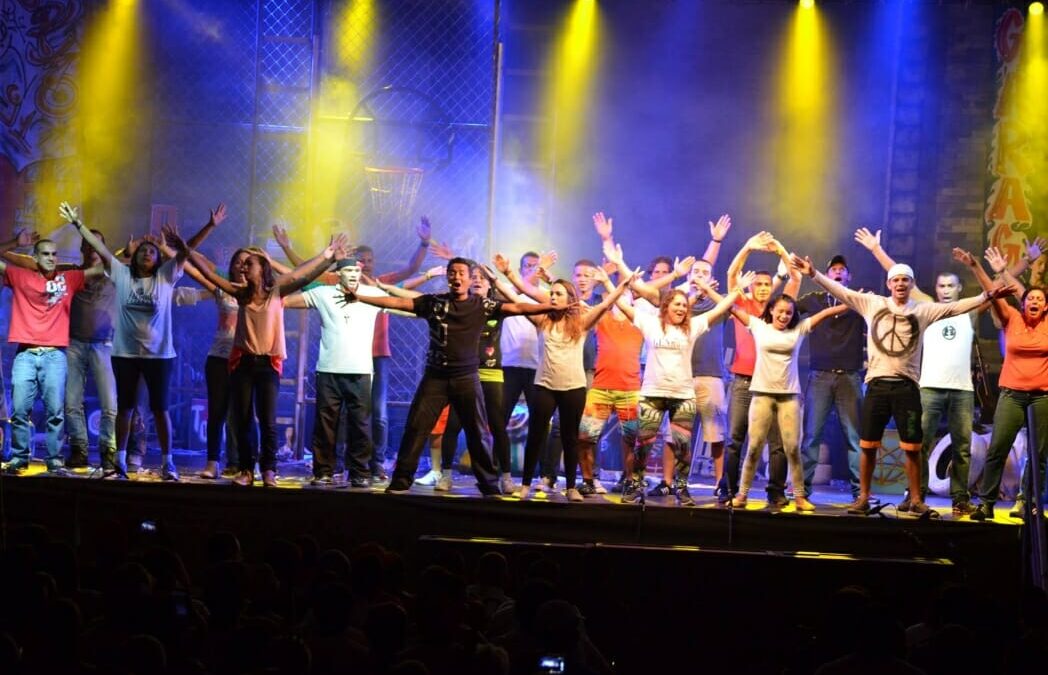
Oct 21, 2015 | Non categorizzato
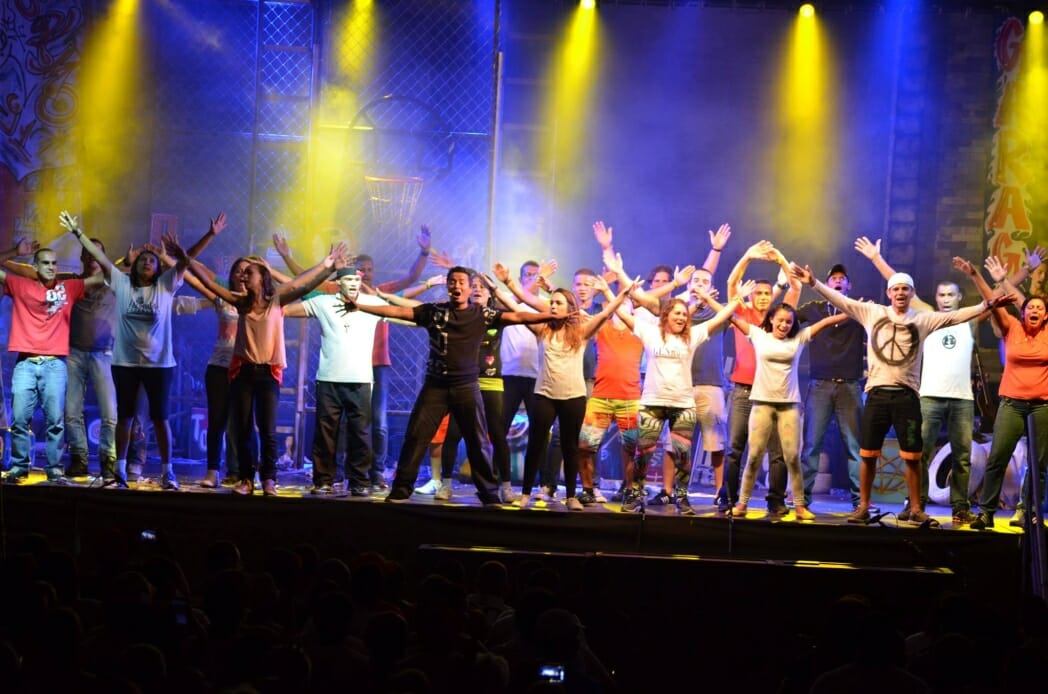 These are the figures of Gen Rosso’s tour in Brazil: the band that resides in Loppiano has undertaken seven projects – one for every city – in collaboration with Fazenda da Esperança – a community founded in 1983 by Frei Hans, Nelson, Lucy and Iraçi – and the prefecture of Guarapuava. The first city to host the band was Palmas, in the state of Tocantins where the Fazenda da Esperança hosts 25 youths under rehab programmes from drugs, alcohol and violence, and who will work with Gen Rosso – together with other youths of other 4 Fazende in neighbouring cities – and take part of an intense workshop through which they will not only stage their musical Streetlight, but also undertake a spiritual journey of communion. Also 170 youths of the Focolare Movement of various parishes and diocesan movements will participate in the nine artistic workshops. The two evening shows resulting from the workshops attracted an audience of 2,300 people, as well as the national TV Globo channel, other media and the local civil and religious authorities. Also the second third stopover in Caxias and Manaus, in the states of Maranhão and the Amazon, followed the same pattern: the spirit of the tour is to involve the youth, especially those with difficult backgrounds and vicissitudes, within a programme of education towards peace and a different lifestyle transmitted through music, dance and mutual sharing. There were numerous touching testimonials in this sense: «I have lived for two years in the square of the theatre, sleeping on that bench in front, and ate what I found in the trashcans… I never thought that I would one day see what was behind those doors, and even go onstage to express my wish for redemption and a new life,» a boy from Manaus said. «I was familiar with the backstage door. I would enter to steal and when it was closed, it was the corner where I would assume drugs . And now, here I am, trying to give the best of myself: life is marvelous!» another boy relayed. Also the audience wrote very meaningful impressions – the final celebrations in Manaus saw the participation of 6,000 people – among these, the Bishop of Caxias, who underlined how «this type of evangelisation goes directly to the hearts of the youth, and from the stage reaches out to the public in an unmistakable and exciting way, » and various journalists gave ample reportages and footage in their various newspapers and TV channels. The tour is under way and will bring the band to Garanhuns (Pernambuco), Casca (Rio Grande do Sul), Guaratinguetá (San Paolo)
These are the figures of Gen Rosso’s tour in Brazil: the band that resides in Loppiano has undertaken seven projects – one for every city – in collaboration with Fazenda da Esperança – a community founded in 1983 by Frei Hans, Nelson, Lucy and Iraçi – and the prefecture of Guarapuava. The first city to host the band was Palmas, in the state of Tocantins where the Fazenda da Esperança hosts 25 youths under rehab programmes from drugs, alcohol and violence, and who will work with Gen Rosso – together with other youths of other 4 Fazende in neighbouring cities – and take part of an intense workshop through which they will not only stage their musical Streetlight, but also undertake a spiritual journey of communion. Also 170 youths of the Focolare Movement of various parishes and diocesan movements will participate in the nine artistic workshops. The two evening shows resulting from the workshops attracted an audience of 2,300 people, as well as the national TV Globo channel, other media and the local civil and religious authorities. Also the second third stopover in Caxias and Manaus, in the states of Maranhão and the Amazon, followed the same pattern: the spirit of the tour is to involve the youth, especially those with difficult backgrounds and vicissitudes, within a programme of education towards peace and a different lifestyle transmitted through music, dance and mutual sharing. There were numerous touching testimonials in this sense: «I have lived for two years in the square of the theatre, sleeping on that bench in front, and ate what I found in the trashcans… I never thought that I would one day see what was behind those doors, and even go onstage to express my wish for redemption and a new life,» a boy from Manaus said. «I was familiar with the backstage door. I would enter to steal and when it was closed, it was the corner where I would assume drugs . And now, here I am, trying to give the best of myself: life is marvelous!» another boy relayed. Also the audience wrote very meaningful impressions – the final celebrations in Manaus saw the participation of 6,000 people – among these, the Bishop of Caxias, who underlined how «this type of evangelisation goes directly to the hearts of the youth, and from the stage reaches out to the public in an unmistakable and exciting way, » and various journalists gave ample reportages and footage in their various newspapers and TV channels. The tour is under way and will bring the band to Garanhuns (Pernambuco), Casca (Rio Grande do Sul), Guaratinguetá (San Paolo)
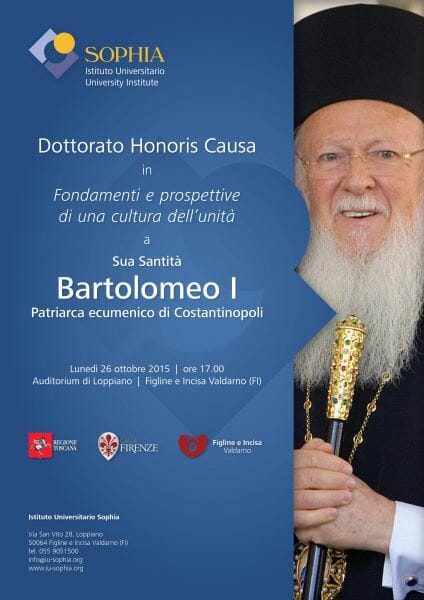
Oct 20, 2015 | Non categorizzato
 On October 26, 2015, at 5.00 pm
His Holiness Bartholomew I, Ecumenical Patriarch of Constantinople will be receiving the first honory doctoral degree in the culture of unity conferred by the Sophia University Institute, situated in Loppiano (Florence) and founded by Chiara Lubich to deal competently and effectively with the cultural transition taking place. The ceremony will be held on October 26 at 17.00 hrs at the Auditorium of the international Centre of the Focolare.The Patriarch, a pioneer in ecumenical dialogue and a peacemaker, is a point of reference in the complex contemporary scene. During some recent important historical events, he stood out for his leading role in promoting unity on several fronts. On May 25, 2014, at the end of the pilgrimage to Jerusalem, he joined Pope Francis in signing a declaration to confirm their respective churches’ commitment “towards unity for which Christ, our Lord prayed to the Father so ‘that all may be one’”. On June 8, 2014 he was at the Vatican together with President Mahmoud Abbas and President Shimon Peres to pray with the Pope for peace in the Holy Land. Bartholomew I is known for his spiritual environmental leadership.His teachings on the environment have been widely quoted by Pope Francis in his encyclical “Laudato si”. The Patriarch has been invited to address the assembly during the ecumenical service at Notre Dame Cathedral on December 3, at the time when the United Nations Climate Change Conference will be taking place in Paris.
The theologian Piero Coda, President of the University Institute said: “Today, the world needs people who seek the unity of the human family, and the Patriarch is constantly rendering a valuable service towards a culture that aims at placing fraternity at the heart of human history”. The recommendation specifies that: “The Ecumenical Patriarch of Constantinople is accredited for his active leading role in the ecumenical journey towards full Christian unity and in the dialogue with people of different beliefs and religions. He distinguishes himself for promoting justice, peace and protection of the environment, in conformity with the vision on humanity, history and the universe, that comes from the treasured spiritual and theological Eastern Orthodox Christian tradition”.
The Ecumenical Patriarch of Constantinople and the Focolare Movement – It all began with a meeting between Patriarch Athenagoras I and Chiara Lubich. “It was June 13, 1967”‐Lubich related‐ “The Patriarch welcomed me as if he had always known me and he asked me about the Movement’s contacts with the Lutherans and the Anglicans”. Between 1967 and 1972, Athenagoras met the founder of the Focolare Movement 23 times, and thus she became the messenger between Pope Paul VI and the Patriarch. This relationship continued with his successor, Demetrio I. Contacts with the current Ecumenical Patriarch Bartholomew I continue in the same spirit of spiritual friendship. His Holiness Bartholomew I, who visited Chiara Lubich at the Gemelli hospital a few days before her passing away on March 14, 2008 said: “I wanted to come here to give my personal greetings and those of the Ecumenical Patriarchate of Constantinople to dearest Chiara, who, through her life, has given and gives so much to the Church.I gave her my blessing with gratitude. I am happy to have met her.” Two years later, when he welcomed Maria Voce, the newly elected president of the Focolare Movement at the Phanar, he said “ I thank God for your friendship, your visit, the fruits of your Movement, and for the continuation of this work of God that gives glory to His name”.
This event takes place when Loppiano celebrates the first 50 years of its foundation, and it continues to strengthen the relationship of esteem and collaboration between the Patriarchate of Constantinople and the Focolare Movement.
On October 26, 2015, at 5.00 pm
His Holiness Bartholomew I, Ecumenical Patriarch of Constantinople will be receiving the first honory doctoral degree in the culture of unity conferred by the Sophia University Institute, situated in Loppiano (Florence) and founded by Chiara Lubich to deal competently and effectively with the cultural transition taking place. The ceremony will be held on October 26 at 17.00 hrs at the Auditorium of the international Centre of the Focolare.The Patriarch, a pioneer in ecumenical dialogue and a peacemaker, is a point of reference in the complex contemporary scene. During some recent important historical events, he stood out for his leading role in promoting unity on several fronts. On May 25, 2014, at the end of the pilgrimage to Jerusalem, he joined Pope Francis in signing a declaration to confirm their respective churches’ commitment “towards unity for which Christ, our Lord prayed to the Father so ‘that all may be one’”. On June 8, 2014 he was at the Vatican together with President Mahmoud Abbas and President Shimon Peres to pray with the Pope for peace in the Holy Land. Bartholomew I is known for his spiritual environmental leadership.His teachings on the environment have been widely quoted by Pope Francis in his encyclical “Laudato si”. The Patriarch has been invited to address the assembly during the ecumenical service at Notre Dame Cathedral on December 3, at the time when the United Nations Climate Change Conference will be taking place in Paris.
The theologian Piero Coda, President of the University Institute said: “Today, the world needs people who seek the unity of the human family, and the Patriarch is constantly rendering a valuable service towards a culture that aims at placing fraternity at the heart of human history”. The recommendation specifies that: “The Ecumenical Patriarch of Constantinople is accredited for his active leading role in the ecumenical journey towards full Christian unity and in the dialogue with people of different beliefs and religions. He distinguishes himself for promoting justice, peace and protection of the environment, in conformity with the vision on humanity, history and the universe, that comes from the treasured spiritual and theological Eastern Orthodox Christian tradition”.
The Ecumenical Patriarch of Constantinople and the Focolare Movement – It all began with a meeting between Patriarch Athenagoras I and Chiara Lubich. “It was June 13, 1967”‐Lubich related‐ “The Patriarch welcomed me as if he had always known me and he asked me about the Movement’s contacts with the Lutherans and the Anglicans”. Between 1967 and 1972, Athenagoras met the founder of the Focolare Movement 23 times, and thus she became the messenger between Pope Paul VI and the Patriarch. This relationship continued with his successor, Demetrio I. Contacts with the current Ecumenical Patriarch Bartholomew I continue in the same spirit of spiritual friendship. His Holiness Bartholomew I, who visited Chiara Lubich at the Gemelli hospital a few days before her passing away on March 14, 2008 said: “I wanted to come here to give my personal greetings and those of the Ecumenical Patriarchate of Constantinople to dearest Chiara, who, through her life, has given and gives so much to the Church.I gave her my blessing with gratitude. I am happy to have met her.” Two years later, when he welcomed Maria Voce, the newly elected president of the Focolare Movement at the Phanar, he said “ I thank God for your friendship, your visit, the fruits of your Movement, and for the continuation of this work of God that gives glory to His name”.
This event takes place when Loppiano celebrates the first 50 years of its foundation, and it continues to strengthen the relationship of esteem and collaboration between the Patriarchate of Constantinople and the Focolare Movement.
Source: Press Release 19 October 2015 Other material available at Focolare Information Service Bartholomew I – Biographical Profile Sophia University Institute – Dossier “Athenagoras I, Paul VI and Chiara Lubich” – video (available in high definition, please send your request to sif.press@focolare.org) Photo gallery
Oct 20, 2015 | Focolare Worldwide
http://vimeo.com/95726085 Jerusalem, May 24th: the encounter with Pope Francis and Patriarch Bartholomew recalls the historic embrace of 50 years ago between Paul VI and the Ecumenical Patriarch of Constantinople, Athenagoras I, which was the start of a new page in history following centuries of separation. We retrace this unedited page in the history of ecumenical dialogue.
Oct 19, 2015 | Non categorizzato
This is the title that has been chosen for the 9th UNESCO Youth Forum, which preceeds the UNESCO General Conference. Nancy Nanjala (Kenya) and Danilo Gomes (Brazil) will attend the Forum, representing the youth of the New Humanity NGO, which represents the Focolare Movement in international organisations. The event will be held at the UNESCO headquarters in Paris, on October 26–28, 2015.
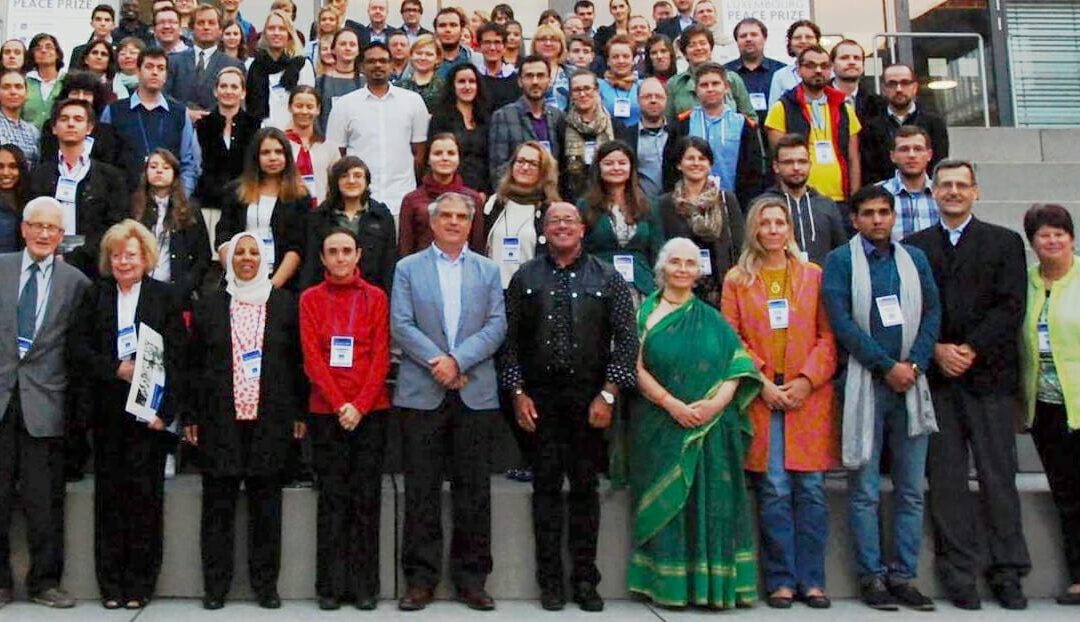
Oct 19, 2015 | Non categorizzato
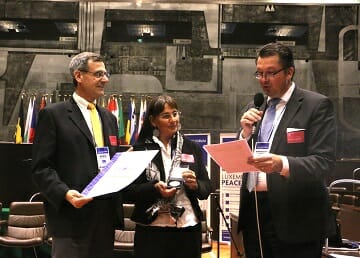 The prize, given by the Schengen Peace Foundation was assigned to New Humanity, an NGO that represents the Focolare Movement among international organisations, during the Youth World Peace Forum that both organisations had collaborated in organising at Rowad American College in Cairo last May, as part of the Living Peace Project that involves more than 80 thousand students and 200 schools around the world in planning and carrying out peace education projects. “After being so struck by the extraordinary volunteer work of so many young members of the Focolare Movement,” writes Dominicus Rhode, president of the forum and of the foundation, “we immediately decided to award the 2015 Luxembourg Peace Prize to New Humanity.” In accepting the award, Marco Desalvo, president of the organisation, remarked: “We are especially pleased because this was the reason for which New Humanity was begun, to contribute to the creation of the unity of the human family, respecting everyone’s identity, and and promoting the spirit of universal brotherhood. This is an award for which we are grateful, but mostly an encouragement to continue on with our work.” While describing the activities of New Humanity in the world’s ‘hot spots’ like Syria and the Middle East, but also in Europe, Desalvo, vice president Cecilia Landucci and Anita Martinez also announced the beginning of a collection of signatures for a petition that would be taken to international leaders and to the United Nations: “In this appeal,” he explained, “we ask all governments to fight extreme poverty with renewed commitment to reducing inequality; to continue in the effort to guarantee a basic education for everyone; to reduce public spending for arms so as to free up resources for development; to take a second look at the current systems of government in terms of a greater democratic control of economic and monetary politics; and to adopt new systems and applications of the laws to fight organised crime.”
The prize, given by the Schengen Peace Foundation was assigned to New Humanity, an NGO that represents the Focolare Movement among international organisations, during the Youth World Peace Forum that both organisations had collaborated in organising at Rowad American College in Cairo last May, as part of the Living Peace Project that involves more than 80 thousand students and 200 schools around the world in planning and carrying out peace education projects. “After being so struck by the extraordinary volunteer work of so many young members of the Focolare Movement,” writes Dominicus Rhode, president of the forum and of the foundation, “we immediately decided to award the 2015 Luxembourg Peace Prize to New Humanity.” In accepting the award, Marco Desalvo, president of the organisation, remarked: “We are especially pleased because this was the reason for which New Humanity was begun, to contribute to the creation of the unity of the human family, respecting everyone’s identity, and and promoting the spirit of universal brotherhood. This is an award for which we are grateful, but mostly an encouragement to continue on with our work.” While describing the activities of New Humanity in the world’s ‘hot spots’ like Syria and the Middle East, but also in Europe, Desalvo, vice president Cecilia Landucci and Anita Martinez also announced the beginning of a collection of signatures for a petition that would be taken to international leaders and to the United Nations: “In this appeal,” he explained, “we ask all governments to fight extreme poverty with renewed commitment to reducing inequality; to continue in the effort to guarantee a basic education for everyone; to reduce public spending for arms so as to free up resources for development; to take a second look at the current systems of government in terms of a greater democratic control of economic and monetary politics; and to adopt new systems and applications of the laws to fight organised crime.” 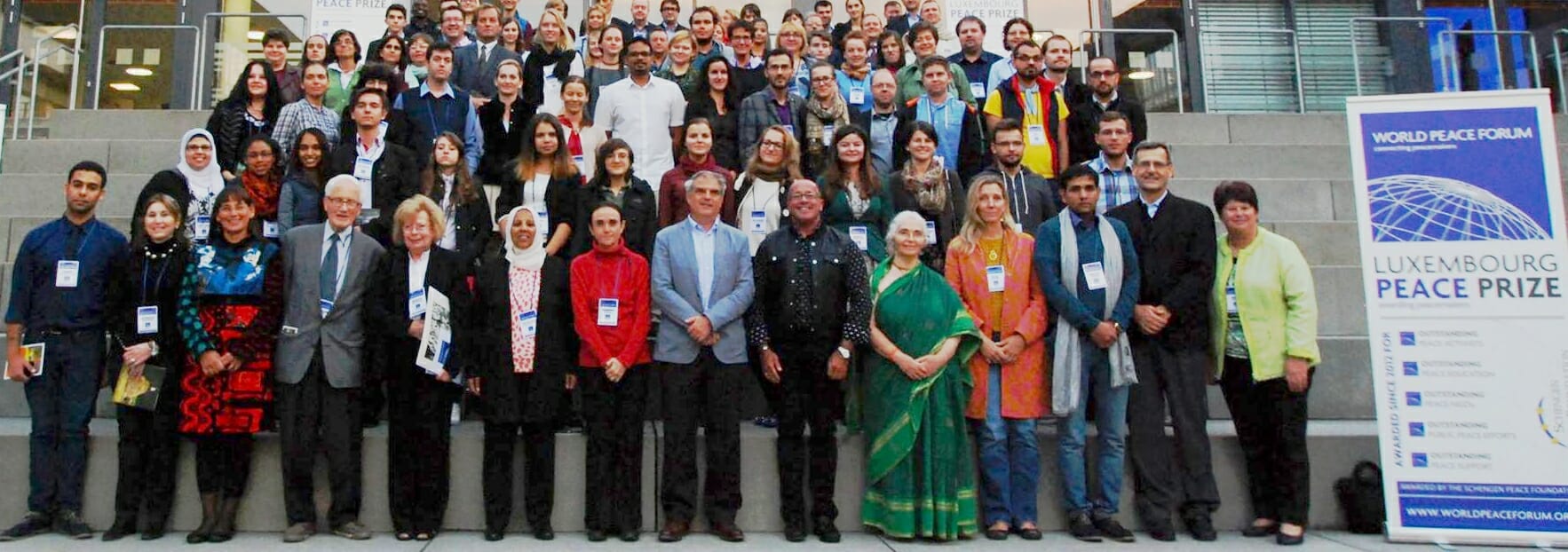 The Youth World Youth Peace Forum, within which the prize was awarded, is a global platform for improving the exchange of best practices amongst associations and individuals active in the area of peace, and joins a large number of professionals from all backgrounds from around the world, who share their hope. Several presentations highlighted ways of coming up with peaceful alternatives to conflicts which have always proven to be more efficacious, at all levels and from every standpoint – rather than war. Testimonies were also given by Syrian refugees and people from other lands, as well as by those who welcomed them in, and of others who are currently giving medical, artistic, and spiritual contributions to peace. The next Forum will be held in Florianopolis, Brazil, in September 2016. Preparations are already underway, but the end goal of all the work involves an ongoing daily commitment and involvement, as was expressed in many of the impressions and testimonies that were shared. One Syrian woman, for example, was asked what she would say to her Focolare friends who stayed behind in Aleppo, Damascus and other places in Syria. She answered: “Life is precious. If they are still in Syria, it is because they have a duty, and a message to bring. Those who cross and leave Syria must continue the work, with the same spirit of the people who could not leave the country. I continually pray to God that He will stop the war and save us from this tragedy, so that all can live in peace.”
The Youth World Youth Peace Forum, within which the prize was awarded, is a global platform for improving the exchange of best practices amongst associations and individuals active in the area of peace, and joins a large number of professionals from all backgrounds from around the world, who share their hope. Several presentations highlighted ways of coming up with peaceful alternatives to conflicts which have always proven to be more efficacious, at all levels and from every standpoint – rather than war. Testimonies were also given by Syrian refugees and people from other lands, as well as by those who welcomed them in, and of others who are currently giving medical, artistic, and spiritual contributions to peace. The next Forum will be held in Florianopolis, Brazil, in September 2016. Preparations are already underway, but the end goal of all the work involves an ongoing daily commitment and involvement, as was expressed in many of the impressions and testimonies that were shared. One Syrian woman, for example, was asked what she would say to her Focolare friends who stayed behind in Aleppo, Damascus and other places in Syria. She answered: “Life is precious. If they are still in Syria, it is because they have a duty, and a message to bring. Those who cross and leave Syria must continue the work, with the same spirit of the people who could not leave the country. I continually pray to God that He will stop the war and save us from this tragedy, so that all can live in peace.”
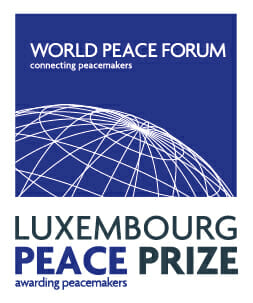
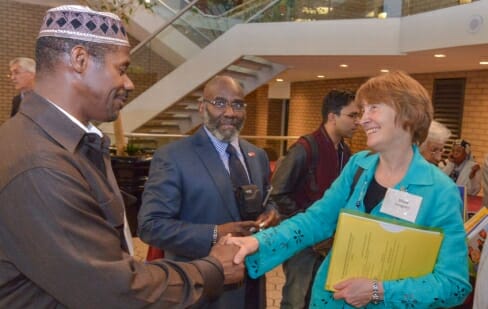
Oct 18, 2015 | Non categorizzato
 “Inculturation of faith is an intrinsic aspect of Christianity. This regards the difficult and complex processes that need time, and in this process the local people themselves are particularly important. By living the Gospel authentically, they who are already deeply rooted in their own cultures will draw forth those adaptations which they will then share with the others, through the customs, artistic expressions and mindsets of their own people. I am totally convinced that the important thing is God himself. This obviously does not mean that one can remain inactive or indifferent. Also we are gathering for example, the African proverbs or those of other peoples, and our publishing house has published books on the great religions. Chiara Lubich established a school for inculturation in Africa , after which she launched another one in Latin America. But whoever thinks that it would suffice to study the various cultures in order to make relate with the Gospel teachings, would be going down the wrong path. We have to bring God. He is the one open and fully ‘involved’ in what He himself created and He will be the one to achieve inculturation. Of course, there are many forms of inculturation and many attempts that should be encouraged and blessed. However, only God can achieve real inculturation. The greatest contribution we can give is love. If each one gives of himself, foregoing one’s own self in the other, and accepting the other in oneself, then the personality of each one will flourish at best and complete the personality of each one. The same would occur among peoples: if each people is able to “lose” its culture out of love, and open out to God in the other, the best of each culture would be “saved” and each would emerge and be enriched not only in the spiritual but also the humane, cultural, and ethnic aspects. Initially, the journey will be slow, but once the road has been paved, it will accelerate and bring enormous results.”
“Inculturation of faith is an intrinsic aspect of Christianity. This regards the difficult and complex processes that need time, and in this process the local people themselves are particularly important. By living the Gospel authentically, they who are already deeply rooted in their own cultures will draw forth those adaptations which they will then share with the others, through the customs, artistic expressions and mindsets of their own people. I am totally convinced that the important thing is God himself. This obviously does not mean that one can remain inactive or indifferent. Also we are gathering for example, the African proverbs or those of other peoples, and our publishing house has published books on the great religions. Chiara Lubich established a school for inculturation in Africa , after which she launched another one in Latin America. But whoever thinks that it would suffice to study the various cultures in order to make relate with the Gospel teachings, would be going down the wrong path. We have to bring God. He is the one open and fully ‘involved’ in what He himself created and He will be the one to achieve inculturation. Of course, there are many forms of inculturation and many attempts that should be encouraged and blessed. However, only God can achieve real inculturation. The greatest contribution we can give is love. If each one gives of himself, foregoing one’s own self in the other, and accepting the other in oneself, then the personality of each one will flourish at best and complete the personality of each one. The same would occur among peoples: if each people is able to “lose” its culture out of love, and open out to God in the other, the best of each culture would be “saved” and each would emerge and be enriched not only in the spiritual but also the humane, cultural, and ethnic aspects. Initially, the journey will be slow, but once the road has been paved, it will accelerate and bring enormous results.”
Pasquale Foresi
Excerpt from:Pasquale Foresi,Colloqui, New City Press 2009, pp.133-136. Collection of conversations with members of the Focolare Movement dated 1990/98
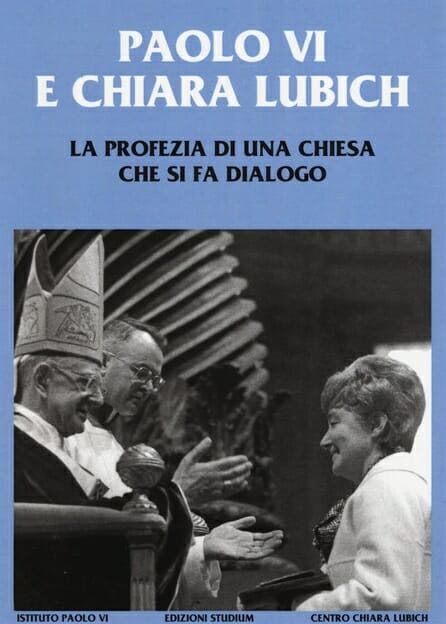
Oct 17, 2015 | Non categorizzato
 «Along the years, there have been studies and in-depth reflections on the Foundress of the Focolare Movement and Paul VI, the “helmsman of Vatican II.” But the time was not ripe for the deepening of the providential weft of relationships established between Giovanni Battista Montini and Chiara Lubich traced precisely to that period. A Pope and a lay woman: what could they have had in common? History never fails to surprise us, and the works carried out by the Paolo VI Institute and the Chiara Lubich Centre resulted in the two study days of 7/8 November 2014, centered on Paul VI, Chiara Lubich and the prophecy of a Church that impersonates dialogue. All these activities have contributed to this long-awaited publication. The book, published in July 2015, traces those events that had revealed under a historical, social, ecclesial, ecumenical and theological profile, the relationship that began in 1952 between Chiara Lubich and Montini, then the special deputy of the Secretary of State, and which continued up to the death of Paul VI in 1978. The path highlighted important moments for both the Church and the Focolare Movement, with the charismatic drive which distinguished it from the very beginning when it made its first steps in the city of Trent. As seen in the studies of the 1950s, the ecclesiastical authorities nurtured strong doubts with regard to the novelty the Movement represented, and the overcoming of this stance towards the start of the 1960s with the first approvals. At this stage, Paul VI played a fundamental role through his personal commitment in the progressive, juridical and institutional configuration of the Movement. Still quite an unknown but a highly interesting topic, it related to the presence of the Focolare in the Eastern European countries from the start of the 1960s, at the height of the Cold War, along with the intensification of contacts in the ecumenical field that came about in the same period. This account is extensively documented by an intense exchange of letters between Chiara and Paul VI, and of what Lubich wrote in her diary after the audiences with Pope Montini. The events also highlighted, alongside these two figures, the role of Igino Giordani. He was a personal friend of Paul VI who, when still a young bishop in Rome, used to frequent his home. In those times Giordani was the Vatican librarian, and future member of the Constituent assembly and Cofounder of the Focolare Movement with Chiara Lubich. Maria Voce, President of the Focolare, stressed that «there is a profound consonance which particularly reveals Pope Paul’s extreme sensitivity and capacity to see in the charism God endowed to Chiara Lubich, the work of the Holy Spirit at the crucial moment of the celebration of the Second Vatican Council that opened out to dialogue beyond frontiers. Upon meeting Chiara, he listened, appreciated, and encouraged. In 1964, struck by the ecumenical feature of the Movement, he exhorted: ”In the same way as you have started a dialogue with the non-Catholic Christians, do the same also with those who do not profess a faith.”» «This was underlined by Don Angelo Maffeis, president of the Paul VI Institute: “the beginnings of this story traces back to long before the Second Vatican Council and deserves to be reconstructed so as to highlight the background of personal contacts and ecclesial experiences that gradually led to the full development of the orientations set by Paul VI in the course of his pontificate.» The other works by Andrea Riccardi, Alberto Monticone, Lucia Abignente, Paolo Siniscalco, Joan Patricia Back, Alberto Lo Presti, Adriana Cosseddu and Piero Coda – have focused under various aspects, «the grandeur of the prophecy of a Church that became the personification of dialogue.» Two charisms met, recognised one another, and worked together to make the Church a “house of communion,” which sets itself in dialogue with the world. The volume on Paul VI and Chiara Lubich, the prophecy of a Church that personifies dialogue, was curated by Paolo Siniscalco and Xenio Toscani, and edited by ‘Studium.’» Caterina Ruggiu
«Along the years, there have been studies and in-depth reflections on the Foundress of the Focolare Movement and Paul VI, the “helmsman of Vatican II.” But the time was not ripe for the deepening of the providential weft of relationships established between Giovanni Battista Montini and Chiara Lubich traced precisely to that period. A Pope and a lay woman: what could they have had in common? History never fails to surprise us, and the works carried out by the Paolo VI Institute and the Chiara Lubich Centre resulted in the two study days of 7/8 November 2014, centered on Paul VI, Chiara Lubich and the prophecy of a Church that impersonates dialogue. All these activities have contributed to this long-awaited publication. The book, published in July 2015, traces those events that had revealed under a historical, social, ecclesial, ecumenical and theological profile, the relationship that began in 1952 between Chiara Lubich and Montini, then the special deputy of the Secretary of State, and which continued up to the death of Paul VI in 1978. The path highlighted important moments for both the Church and the Focolare Movement, with the charismatic drive which distinguished it from the very beginning when it made its first steps in the city of Trent. As seen in the studies of the 1950s, the ecclesiastical authorities nurtured strong doubts with regard to the novelty the Movement represented, and the overcoming of this stance towards the start of the 1960s with the first approvals. At this stage, Paul VI played a fundamental role through his personal commitment in the progressive, juridical and institutional configuration of the Movement. Still quite an unknown but a highly interesting topic, it related to the presence of the Focolare in the Eastern European countries from the start of the 1960s, at the height of the Cold War, along with the intensification of contacts in the ecumenical field that came about in the same period. This account is extensively documented by an intense exchange of letters between Chiara and Paul VI, and of what Lubich wrote in her diary after the audiences with Pope Montini. The events also highlighted, alongside these two figures, the role of Igino Giordani. He was a personal friend of Paul VI who, when still a young bishop in Rome, used to frequent his home. In those times Giordani was the Vatican librarian, and future member of the Constituent assembly and Cofounder of the Focolare Movement with Chiara Lubich. Maria Voce, President of the Focolare, stressed that «there is a profound consonance which particularly reveals Pope Paul’s extreme sensitivity and capacity to see in the charism God endowed to Chiara Lubich, the work of the Holy Spirit at the crucial moment of the celebration of the Second Vatican Council that opened out to dialogue beyond frontiers. Upon meeting Chiara, he listened, appreciated, and encouraged. In 1964, struck by the ecumenical feature of the Movement, he exhorted: ”In the same way as you have started a dialogue with the non-Catholic Christians, do the same also with those who do not profess a faith.”» «This was underlined by Don Angelo Maffeis, president of the Paul VI Institute: “the beginnings of this story traces back to long before the Second Vatican Council and deserves to be reconstructed so as to highlight the background of personal contacts and ecclesial experiences that gradually led to the full development of the orientations set by Paul VI in the course of his pontificate.» The other works by Andrea Riccardi, Alberto Monticone, Lucia Abignente, Paolo Siniscalco, Joan Patricia Back, Alberto Lo Presti, Adriana Cosseddu and Piero Coda – have focused under various aspects, «the grandeur of the prophecy of a Church that became the personification of dialogue.» Two charisms met, recognised one another, and worked together to make the Church a “house of communion,” which sets itself in dialogue with the world. The volume on Paul VI and Chiara Lubich, the prophecy of a Church that personifies dialogue, was curated by Paolo Siniscalco and Xenio Toscani, and edited by ‘Studium.’» Caterina Ruggiu
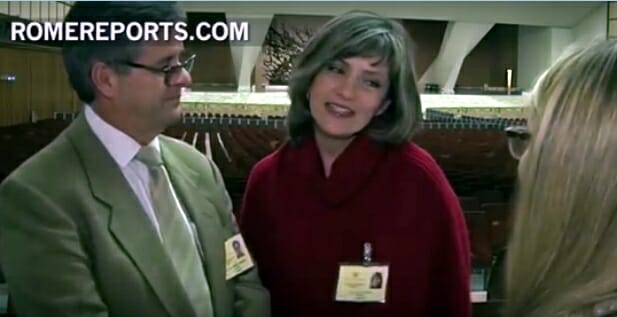
Oct 16, 2015 | Non categorizzato
 They have been married for 23 years and have two teenage sons. Raised in Catholic families, they met in the Focolare Movement to which they still belong. “We had worked in the past with a group of other young people in a marginalised quarter on the periphery of Bogota,” they recounted in their testimony at the Synod assembly. “We played with the children, taught the adults how to read, and offered free medical and dental assistance. They were talking about the Los Chircales quarter where the Centro Sociale Unidad is headquartered: “Obstacles were not lacking,” the Colombian couple who spoke at the Synod the family, said, “beginning from our concern for our personal well-being, and the fear of going into those rundown neighbourhoods and slums. But the desire to serve those brothers and sisters was more powerful than our fragility.”
They have been married for 23 years and have two teenage sons. Raised in Catholic families, they met in the Focolare Movement to which they still belong. “We had worked in the past with a group of other young people in a marginalised quarter on the periphery of Bogota,” they recounted in their testimony at the Synod assembly. “We played with the children, taught the adults how to read, and offered free medical and dental assistance. They were talking about the Los Chircales quarter where the Centro Sociale Unidad is headquartered: “Obstacles were not lacking,” the Colombian couple who spoke at the Synod the family, said, “beginning from our concern for our personal well-being, and the fear of going into those rundown neighbourhoods and slums. But the desire to serve those brothers and sisters was more powerful than our fragility.”  “We married and the grace of the sacrament soon began to manifest itself.” They are very different from one another: Luis, “the calm type”, Maria Angélica “a volcano”. “We knew that human love easily vanishes. The years go by and the initial enchantment diminishes. For this reason it was important for us to bulk up on God’s love, which taught us to love in the small things of everyday life.” Luis admitted: “For me that means not waiting to be waited on, but rather to help out washing the dishes, or to listen more attentively when she wants to tell me something. On her part, M. Angélica watches the Formula 1 with me..” By nourishing ourselves on the Eucharist, approaching the sacrament of Confession and remaining in this relationship of mutual love, we experience that Jesus becomes present in our midst, and then we have the light to raise our sons, and the strength to face the inevitable difficulties that come our way.” “A short time ago we had a rather strong conversation and the unity between us was shattered. That night, we went to bed without apologising to each other” (one of the three things that Pope Francis says should never be done in the life of a couple): “I telephoned Lucho,” M. Angélica recounts, “and told him I was sorry for having answered him so awfully. Then it turned into an opportunity to begin again loving every time we fail.” Together with bishops and priests from several cities in Colombia, and with other families and young people, they organized a series of visits to several poor communities; “The idea was to share our experiences and offer some formation as a family. Some of the couples confided their desire to receive the sacrament of matrimony.”
“We married and the grace of the sacrament soon began to manifest itself.” They are very different from one another: Luis, “the calm type”, Maria Angélica “a volcano”. “We knew that human love easily vanishes. The years go by and the initial enchantment diminishes. For this reason it was important for us to bulk up on God’s love, which taught us to love in the small things of everyday life.” Luis admitted: “For me that means not waiting to be waited on, but rather to help out washing the dishes, or to listen more attentively when she wants to tell me something. On her part, M. Angélica watches the Formula 1 with me..” By nourishing ourselves on the Eucharist, approaching the sacrament of Confession and remaining in this relationship of mutual love, we experience that Jesus becomes present in our midst, and then we have the light to raise our sons, and the strength to face the inevitable difficulties that come our way.” “A short time ago we had a rather strong conversation and the unity between us was shattered. That night, we went to bed without apologising to each other” (one of the three things that Pope Francis says should never be done in the life of a couple): “I telephoned Lucho,” M. Angélica recounts, “and told him I was sorry for having answered him so awfully. Then it turned into an opportunity to begin again loving every time we fail.” Together with bishops and priests from several cities in Colombia, and with other families and young people, they organized a series of visits to several poor communities; “The idea was to share our experiences and offer some formation as a family. Some of the couples confided their desire to receive the sacrament of matrimony.”

Interview with Rome Reports
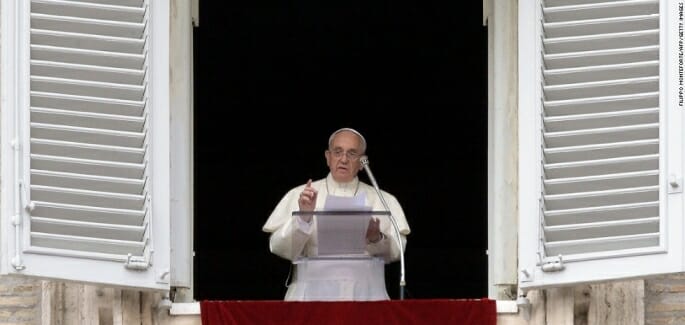
Oct 15, 2015 | Focolare Worldwide
 “We are painfully wounded and follow with deep concern what is taking place in Syria, Iraq, Jerusalem and the West Bank where we are witnessing an escalation in the violence that involves innocent civilians and continues to increase a humanitarian crisis of enormous proportions. War only brings destruction and multiplies the sufferings of entire populations,” stated Pope Francis during the works of the Synod on the Family. “Thank you for your prayers, for this situation we are going through in the Holy Land,” writes the local Focolare Community there. “The hatred leads to violence, and the violence to more hatred . . . a vicious circle is spinning out of control. You can see the situation here transmitted on the media every day. All of us, from both sides, like many other people are deeply saddened and feel helpless in front of this evil. We try to move carefully; we pray more; we try to sow love with a smile or an act of kindness. . .” “We continue to pray and to build peace,” they conclude, “hoping that the longing for reconciliation prevails.”
“We are painfully wounded and follow with deep concern what is taking place in Syria, Iraq, Jerusalem and the West Bank where we are witnessing an escalation in the violence that involves innocent civilians and continues to increase a humanitarian crisis of enormous proportions. War only brings destruction and multiplies the sufferings of entire populations,” stated Pope Francis during the works of the Synod on the Family. “Thank you for your prayers, for this situation we are going through in the Holy Land,” writes the local Focolare Community there. “The hatred leads to violence, and the violence to more hatred . . . a vicious circle is spinning out of control. You can see the situation here transmitted on the media every day. All of us, from both sides, like many other people are deeply saddened and feel helpless in front of this evil. We try to move carefully; we pray more; we try to sow love with a smile or an act of kindness. . .” “We continue to pray and to build peace,” they conclude, “hoping that the longing for reconciliation prevails.”
Oct 15, 2015 | Non categorizzato
https://www.youtube.com/watch?v=om7WN06PMiU
Oct 14, 2015 | Non categorizzato
In 5 September the Gen Rosso International Performing Arts Group started its tour with the Fazenda da Esperança which is celebrating in 6 different cities the definitive approval of the work of Frei Hans, Nelson, Lucy and Iraçi called Familia da Esperança. First stopover: Palmas, at the geographic centre of Brazil, a recently built city and capital of the new state of Tocantins. 9 workshops (stage scenery, theatre, music, hip-hop gang, hip hop combination, Festao, strong moves, percussions and broadway) and 2 concerts with a total of 2,300 people. Also the National network TV Globo, the Director of the TV Anhaguera channel, the Director of the local newspaper, the Prefect, Archbishop and 2 bishops will be present. The second stopover from 14 to 20 September: Caxias in the state of Maranão which is a state with prevalently farming activities. Third stopover in Manaus (21-25 September) and Garanhuns in the State of Pernambuco. In October the group will be in Casca in the State of Rio Grande do Sul, up the 17th after which, in Guaratinguetá in the state of San Paolo and Guarapuava in the State of Paraná. TOUR Programme in Brazil
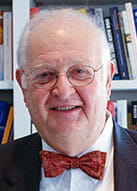
Oct 14, 2015 | Non categorizzato
 The 2015 Nobel Prize awarded to Angus Deaton for his studies on economic development, wellbeing, inequality, consumption choices and the determination of poverty is a very important sign: after years of the financial crisis, Stockholm and its consultants continued to award economists who had studied and promoted economy and finance that contributed to generating the crisis. In this most important seat of contemporary science and social sciences, the awarding of the Nobel Prize to Deaton has returned to promoting the really all-around social scientists of the world, and advocates of a political or civil science which is at the origin of modern economy. Stockholm’s policy has been somewhat bizarre over the last years: from 2010 to 2013, while capitalism was running the risk of an implosion under an unprecedented financial crisis, the Nobel Prizes for Economy were awarded to some economists who were among the major advocates of the economic and financial paradigm that was revealing all its tragic limits. It was almost as if during a summer with the highest number of arson crimes ever, the award was to go to those who studied sophisticated fire-lighting techniques. This is why the Nobel Prize this time, and in some way that of last year assigned to the Frenchman, Jean Tirole, could be a sign of a reverse trend since the award to Deaton closely resembles the awards given to Amartya Sen, Joseph E. Stiglitz, Elinor Ostrom and more recently to Eugene Fama and Lloyd Stowell Shapley. We must not forget that the financial and economic crisis we experienced and are still undergoing, is not independent from the economic theories of the last decade, since unlike the astrophysicists whose theories do not modify the orbit of the planets, economists and their theories strongly impact on economic choices. Over the last years the best of the world’s economic departments were increasingly filled with more mathematicians with increasingly scarce humanistic backgrounds, and experts of hyper-specialised models most of whom were no longer capable of having an overall view of the economic system and thus associate their models with the socio-economic reality. Besides the award to Deaton following that given to Tirole, this could indicate a return to a more European economic theory, which pays greater attention to the social dimension of the profession, and more sensitivity to the themes of collective wellbeing and not only individual profits and turnovers. This probable dawning will, however, reach its peak if the next Nobel prizes highlight more philosopher economists and less mathematician economists, as once described by the British economist, Robert Sugden, in 1991: “The economist today needs to return to being more of a philosopher and less of a mathematician.” It was an invitation which at that time was hardly noticed by professionals of the sector, but we may still be on time to do so. Angus Deaton is furthermore, an economist who not only writes mathematic articles but also books. We recommend his latest work, “The Great Escape: Health, Wealth, and the Origins of Inequality,” in which the new Nobel laureate and authentic social scientist and rightful heir of this co-citizen, Adam Smith (philosopher and economist), asked himself whether humanity will, in the future, enjoy a period of progress without inequality, a fundamental issue today when we are paying the price for progress with growing inequality in the world and a decrease in happiness. Economics could return to being a moral, society-friendly science if it will start again to ask itself questions which were too rapidly abandoned to respond to easier queries, less useful to human progress. Luigino Bruni
The 2015 Nobel Prize awarded to Angus Deaton for his studies on economic development, wellbeing, inequality, consumption choices and the determination of poverty is a very important sign: after years of the financial crisis, Stockholm and its consultants continued to award economists who had studied and promoted economy and finance that contributed to generating the crisis. In this most important seat of contemporary science and social sciences, the awarding of the Nobel Prize to Deaton has returned to promoting the really all-around social scientists of the world, and advocates of a political or civil science which is at the origin of modern economy. Stockholm’s policy has been somewhat bizarre over the last years: from 2010 to 2013, while capitalism was running the risk of an implosion under an unprecedented financial crisis, the Nobel Prizes for Economy were awarded to some economists who were among the major advocates of the economic and financial paradigm that was revealing all its tragic limits. It was almost as if during a summer with the highest number of arson crimes ever, the award was to go to those who studied sophisticated fire-lighting techniques. This is why the Nobel Prize this time, and in some way that of last year assigned to the Frenchman, Jean Tirole, could be a sign of a reverse trend since the award to Deaton closely resembles the awards given to Amartya Sen, Joseph E. Stiglitz, Elinor Ostrom and more recently to Eugene Fama and Lloyd Stowell Shapley. We must not forget that the financial and economic crisis we experienced and are still undergoing, is not independent from the economic theories of the last decade, since unlike the astrophysicists whose theories do not modify the orbit of the planets, economists and their theories strongly impact on economic choices. Over the last years the best of the world’s economic departments were increasingly filled with more mathematicians with increasingly scarce humanistic backgrounds, and experts of hyper-specialised models most of whom were no longer capable of having an overall view of the economic system and thus associate their models with the socio-economic reality. Besides the award to Deaton following that given to Tirole, this could indicate a return to a more European economic theory, which pays greater attention to the social dimension of the profession, and more sensitivity to the themes of collective wellbeing and not only individual profits and turnovers. This probable dawning will, however, reach its peak if the next Nobel prizes highlight more philosopher economists and less mathematician economists, as once described by the British economist, Robert Sugden, in 1991: “The economist today needs to return to being more of a philosopher and less of a mathematician.” It was an invitation which at that time was hardly noticed by professionals of the sector, but we may still be on time to do so. Angus Deaton is furthermore, an economist who not only writes mathematic articles but also books. We recommend his latest work, “The Great Escape: Health, Wealth, and the Origins of Inequality,” in which the new Nobel laureate and authentic social scientist and rightful heir of this co-citizen, Adam Smith (philosopher and economist), asked himself whether humanity will, in the future, enjoy a period of progress without inequality, a fundamental issue today when we are paying the price for progress with growing inequality in the world and a decrease in happiness. Economics could return to being a moral, society-friendly science if it will start again to ask itself questions which were too rapidly abandoned to respond to easier queries, less useful to human progress. Luigino Bruni
Oct 14, 2015 | Non categorizzato
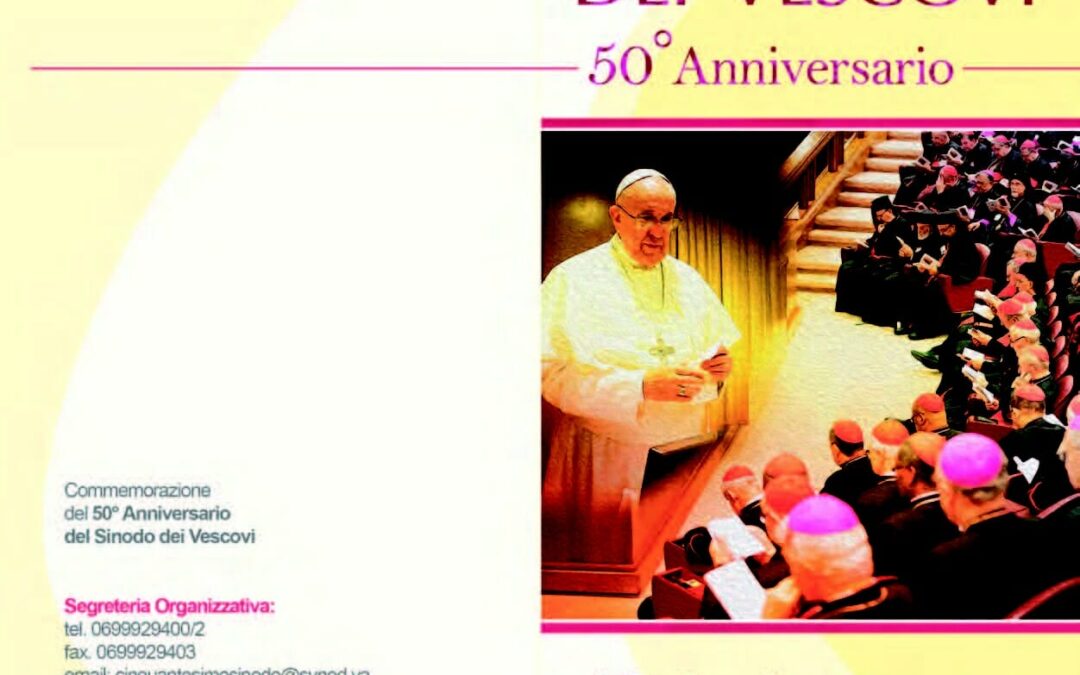
Oct 13, 2015 | Non categorizzato
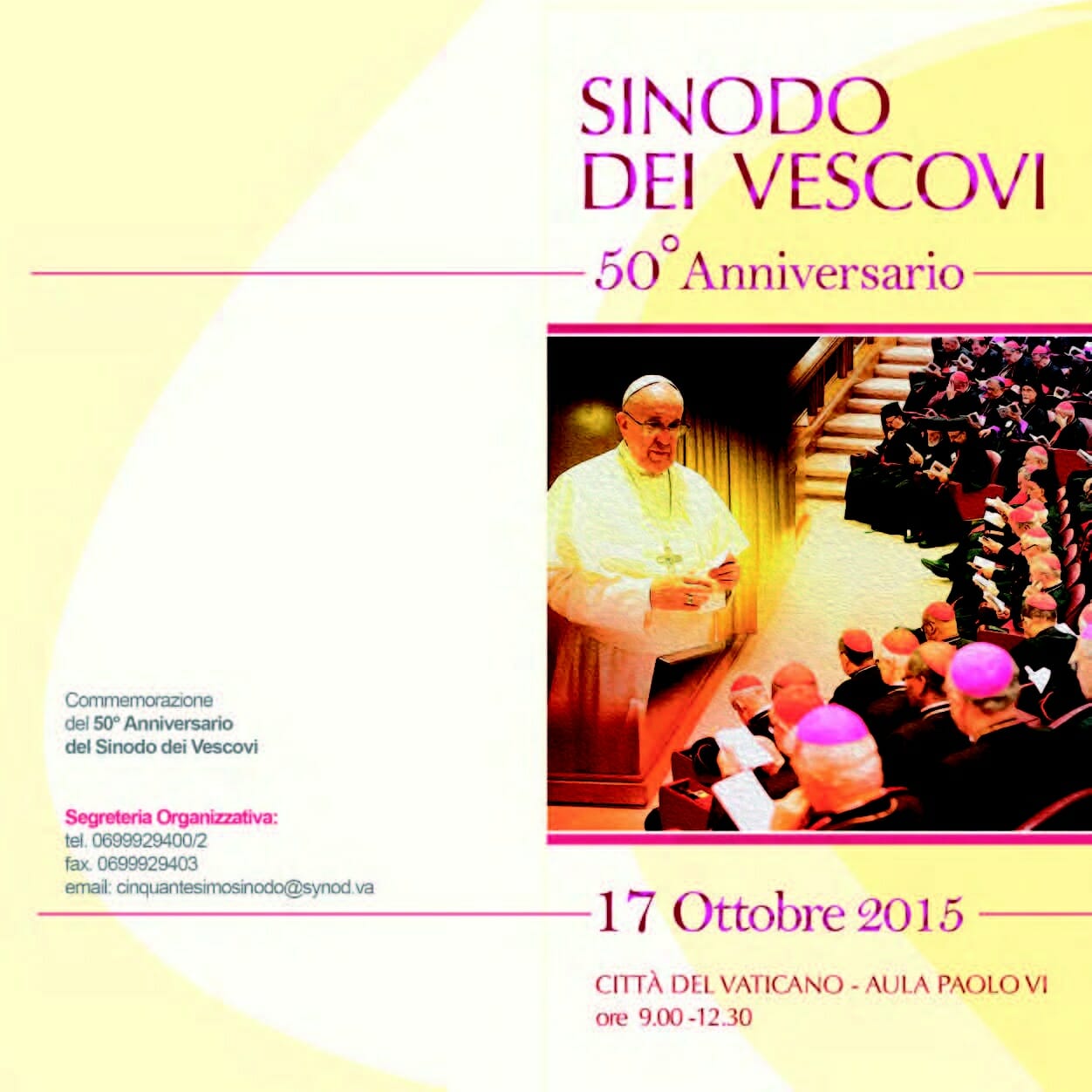 The Synod of Bishops is a permanent institution that was created by Paul VI on September 15, 1965, to keep alive the spirit of collegiality of the Second Vatican Council. This year marks the 50th anniversary of the institution, and the Catholic Church remembers it during the ordinary assembly of the Synod of Bishops, on “the vocation and mission of the family in the Church and in the contemporary world (October 5-25, 2015). On the morning of October 17, in the presence of Pope Francis, interventions will be given by Cardinal Lorenzo Baldisseri, General Secretary of the Synod of Bishops, and Cardinal Christoph Schönborn, President of the Bishops Conference of Austria. This will be followed by messages of bishops from the five continents, and the concluding address by the Holy Father. There is a large delegation from the Focolare amongst the invited guests, including Focolare president Maria Voce who described the Synod of Bishops as “one of the best fruits of the Second Vatican Council for a new sense of collegiality and deeper communion for the further building up of the Universal Church.” Synod comes from the Greek word “syn-hodos” which means “meeting” or “together”. The original meaning of the word, which is to “walk together”, expresses the essence of the Synod: a place for the bishops to encounter one another with the Pope, to share their thoughts and experiences in the common search for pastoral solutions that can be offered to the Church around the world.
The Synod of Bishops is a permanent institution that was created by Paul VI on September 15, 1965, to keep alive the spirit of collegiality of the Second Vatican Council. This year marks the 50th anniversary of the institution, and the Catholic Church remembers it during the ordinary assembly of the Synod of Bishops, on “the vocation and mission of the family in the Church and in the contemporary world (October 5-25, 2015). On the morning of October 17, in the presence of Pope Francis, interventions will be given by Cardinal Lorenzo Baldisseri, General Secretary of the Synod of Bishops, and Cardinal Christoph Schönborn, President of the Bishops Conference of Austria. This will be followed by messages of bishops from the five continents, and the concluding address by the Holy Father. There is a large delegation from the Focolare amongst the invited guests, including Focolare president Maria Voce who described the Synod of Bishops as “one of the best fruits of the Second Vatican Council for a new sense of collegiality and deeper communion for the further building up of the Universal Church.” Synod comes from the Greek word “syn-hodos” which means “meeting” or “together”. The original meaning of the word, which is to “walk together”, expresses the essence of the Synod: a place for the bishops to encounter one another with the Pope, to share their thoughts and experiences in the common search for pastoral solutions that can be offered to the Church around the world.
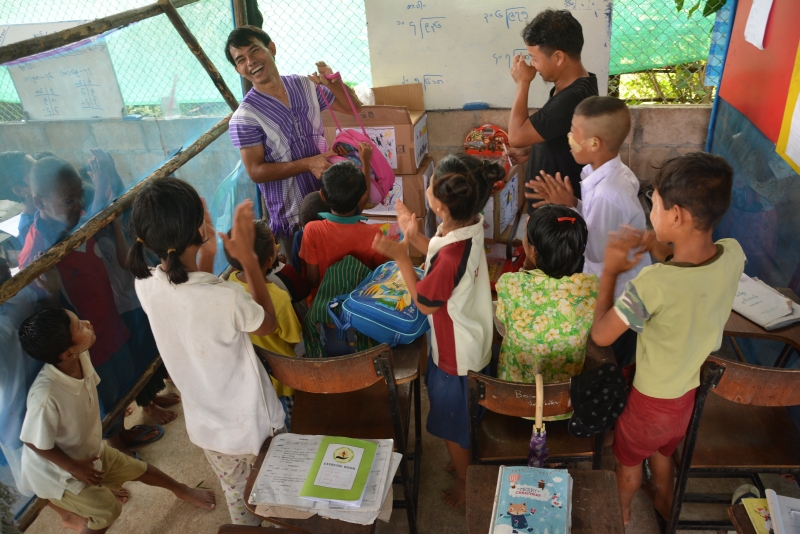
Oct 13, 2015 | Focolare Worldwide
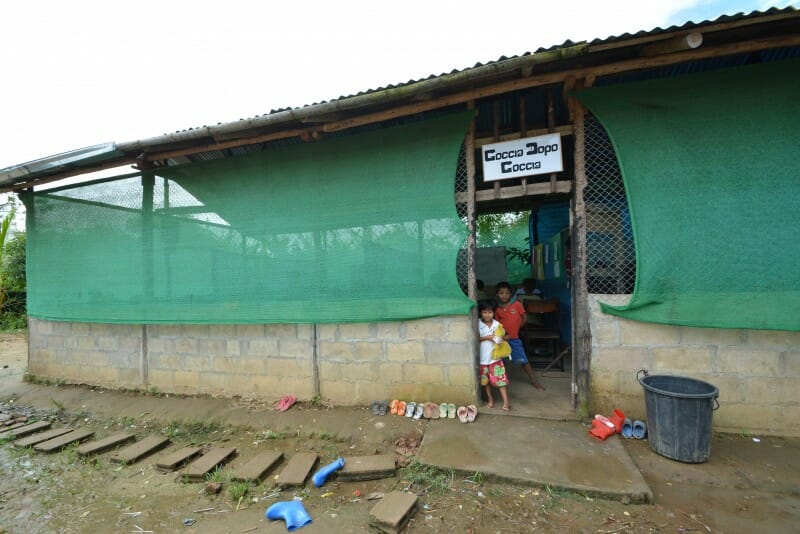 “It’s early morning, following a night of rain on the border between Thailand and Myanmar. Our breakfast consists of a hard-boiled egg and coffee. It’s the beginning of our adventure: four days in Mae Sot with a priest who works for refugees, the least of the least, the ones who don’t get into the official United Nations camps, the ones nobody cares for and who are often unpaid by those for whom they do a week’s work. They’re undocumented and don’ts have the power to protest, because nobody will defend them. Many of them have spent many years in the forests, and finally they can come out. Living amongst the walls and tunnels of factories and makeshift huts, it’s a miracle they’re still alive. Nobody talks about them, and nobody knows about their situation, but everyone knows that they’re worth their weight in gold, a low-cost work force of people ready to work for small salaries, just enough to live on. It’s why Mae-Sot will become such a special economic zone with many industries. We want to be here for at least a few of them. We’ve begun a project that helps the children in a school that didn’t exist too long ago, if not in the dreams of the children of Latina, Italy, and the refugee peers in Mae-Sot.
“It’s early morning, following a night of rain on the border between Thailand and Myanmar. Our breakfast consists of a hard-boiled egg and coffee. It’s the beginning of our adventure: four days in Mae Sot with a priest who works for refugees, the least of the least, the ones who don’t get into the official United Nations camps, the ones nobody cares for and who are often unpaid by those for whom they do a week’s work. They’re undocumented and don’ts have the power to protest, because nobody will defend them. Many of them have spent many years in the forests, and finally they can come out. Living amongst the walls and tunnels of factories and makeshift huts, it’s a miracle they’re still alive. Nobody talks about them, and nobody knows about their situation, but everyone knows that they’re worth their weight in gold, a low-cost work force of people ready to work for small salaries, just enough to live on. It’s why Mae-Sot will become such a special economic zone with many industries. We want to be here for at least a few of them. We’ve begun a project that helps the children in a school that didn’t exist too long ago, if not in the dreams of the children of Latina, Italy, and the refugee peers in Mae-Sot. 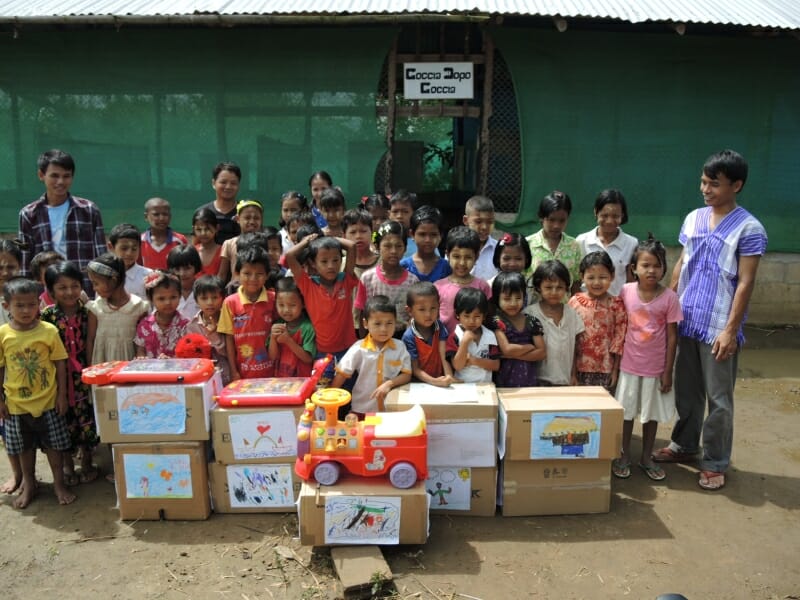 Now, the school does exist and it’s named is “Drop by Drop”. It’s an unlikely pairing between Latina and the mire of Mae-Sot: injustice, illness, rape, abuse, and so on. Some do well, and some thank God that they are still alive in the morning. . . and at night! Like one of the children at the school. I ask his mother: “What is your son’s name?” “Chit Yin Htoo,” she tells me. It means: “If you love me answer me.” “Did you give him the name when he was born?” I ask. “Maybe 3 or 4 years ago, maybe 5 or 6.” At this point I stop and am unable to go on writing. I can only pray that I don’t cry in front of this mother. How can this be? This project was a “loving folly“’ that only the mind of a child could dream up. And that’s what love is, it makes the desert flower, it spurs you to do the impossible, and it makes you glad! We adults follow these children with fear and trembling and respect, I would say: “Their angels gaze upon the Father in Heaven.” When I’m with “If you love me, answer me” I find it hard to make him smile. He’s shy and reserved. Only after much time am I able to take him in my arms: 6 years old, or perhaps 5. . . nobody is really sure . . . fragile and light as a feather. What have his small eyes seen? With a faint voice he’s just able to whisper a message. We distribute food, milk and especially puppets and toys: lanterns, then clothes that make everyone happy. “We don’t have enough for everyone, but let’s ask for a miracle,” I suggest. Let’s try to love one another and take care of each other as we do of ourselves.” Their eyes brighten when they see the football and football uniforms that have been given by a Football Academy of Priverno, Italy. So much love arrives, and the children are gladdened because they feel the love. It changes their sad eyes.
Now, the school does exist and it’s named is “Drop by Drop”. It’s an unlikely pairing between Latina and the mire of Mae-Sot: injustice, illness, rape, abuse, and so on. Some do well, and some thank God that they are still alive in the morning. . . and at night! Like one of the children at the school. I ask his mother: “What is your son’s name?” “Chit Yin Htoo,” she tells me. It means: “If you love me answer me.” “Did you give him the name when he was born?” I ask. “Maybe 3 or 4 years ago, maybe 5 or 6.” At this point I stop and am unable to go on writing. I can only pray that I don’t cry in front of this mother. How can this be? This project was a “loving folly“’ that only the mind of a child could dream up. And that’s what love is, it makes the desert flower, it spurs you to do the impossible, and it makes you glad! We adults follow these children with fear and trembling and respect, I would say: “Their angels gaze upon the Father in Heaven.” When I’m with “If you love me, answer me” I find it hard to make him smile. He’s shy and reserved. Only after much time am I able to take him in my arms: 6 years old, or perhaps 5. . . nobody is really sure . . . fragile and light as a feather. What have his small eyes seen? With a faint voice he’s just able to whisper a message. We distribute food, milk and especially puppets and toys: lanterns, then clothes that make everyone happy. “We don’t have enough for everyone, but let’s ask for a miracle,” I suggest. Let’s try to love one another and take care of each other as we do of ourselves.” Their eyes brighten when they see the football and football uniforms that have been given by a Football Academy of Priverno, Italy. So much love arrives, and the children are gladdened because they feel the love. It changes their sad eyes.  The school doesn’t have actual walls: slightly damaged blackboards. The teachers are volunteers who are only able to be paid a monthly salary of 50 €. Then there is the net and the toilets. . . I feel that I am inside a sanctuary of love, the kind of cathedral that Pope Francis would like. Years ago, I made a vow – that this would be my people and I would never abandon them. In front of this school, this “Drop of love” in the ocean of evil that surrounds us, I renew that vow.” Luigi Butori https://vimeo.com/140934325
The school doesn’t have actual walls: slightly damaged blackboards. The teachers are volunteers who are only able to be paid a monthly salary of 50 €. Then there is the net and the toilets. . . I feel that I am inside a sanctuary of love, the kind of cathedral that Pope Francis would like. Years ago, I made a vow – that this would be my people and I would never abandon them. In front of this school, this “Drop of love” in the ocean of evil that surrounds us, I renew that vow.” Luigi Butori https://vimeo.com/140934325
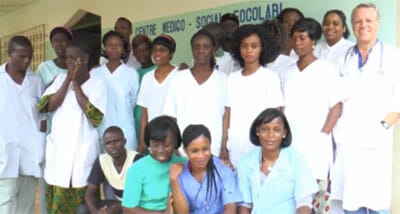
Oct 12, 2015 | Focolare Worldwide
 «During these years I think I alone visited 50,000 patients,» says Dr. A. Carlo Montaguti, a focolarino doctor and Director of the Social Medical Centre of the little Focolare town in Man, Ivory Coast. «I was a doctor in my country, Italy, but my practice was not so intense. Those who preceded me when there was still the war, told me before my departure: Carlo, if you don’t treat them, no one else will.» The patients arrived also in the night. The health records were compiled in the apatam (shed) in front of the hospital, and then they entered for the medical checkup by any of the three doctors of the centre, one of which is Muslim. The doctors prescribed the lab tests and got the results in about two hours. In a second visit, the diagnosis was done and the treatment prescribed. In the span of a morning one manages to get everything done. «It is not usual to have a lab for analysis in such a small centre in the suburbs,» Carlo continues; «I worked for four years without a lab and it was really difficult.» Luc Dro, head of the laboratory, explained that being in a tropical zone, there is great need for studies on parasites that cause malaria and other endemic diseases, but the lab is able to perform a complete check-up. The centre also has a small pharmacy, where over a 100,000 consultations were registered. «We do all that is possible to put the patients at the core of our work – says Dr. Alavo Bazini – and this explains the great influx. It does not suffice to say “the medicines are free of charge,” if the people are not satisfied. This is where the centre’s originality lies.» When possible, there is also a cultural mediator who translates into the local tongues. «We also have the internet and wi-fi connection – explained Dr. Eliassa Sow – In this way we can do research work and cooperate with other doctors from afar.» Dr. Montaguti continues «I came in 2004 – when the centre consisted of two tiny rooms for visits and one for medications. The people have appreciated our work especially because during the war in 2002, in the most difficult moments when all the foreigners were leaving the country, we decided to stay on, and risk our lives. They understood that we were there for them and this generated their trust. At times it came about that on a Monday, after the weekend break, the patients said: ”Doctor, I tried to endure in order to come to you.” If their situation was not too serious, they preferred to wait another day and suffer a bit more, to be able to come here!» One of the strong points of the centre is also the healthcare team which is involved in the entire care process. When the political-military crisis ended and the situation in the region calmed down, the term of the centre was extended and in 2008 we moved into a new facility. «It seemed like a dream – Carlo recalls – but after two years with the influx of patients – more than 80 a day plus their relatives – quite a crowd! – the old structure could not take any more. And we continued to dream.» And so last 10 October, the new Focolare Social Medical Centre, opened last 7 September, was inaugurated in Man, a stone’s throw from Mariapolis Victoria. It is a modern architecture for a facility of over 1,000 sq. m, with the addition of new services: 15 beds, a dentist’s studio, a physiotherapy room, and new diagnostics equipment (ultrasound scans, hemoglobin electrophoresis and microbiology). In the last days the nutrition centre, previously located in the district of Libreville, was completed and transferred to cure infantile malnutrition..
«During these years I think I alone visited 50,000 patients,» says Dr. A. Carlo Montaguti, a focolarino doctor and Director of the Social Medical Centre of the little Focolare town in Man, Ivory Coast. «I was a doctor in my country, Italy, but my practice was not so intense. Those who preceded me when there was still the war, told me before my departure: Carlo, if you don’t treat them, no one else will.» The patients arrived also in the night. The health records were compiled in the apatam (shed) in front of the hospital, and then they entered for the medical checkup by any of the three doctors of the centre, one of which is Muslim. The doctors prescribed the lab tests and got the results in about two hours. In a second visit, the diagnosis was done and the treatment prescribed. In the span of a morning one manages to get everything done. «It is not usual to have a lab for analysis in such a small centre in the suburbs,» Carlo continues; «I worked for four years without a lab and it was really difficult.» Luc Dro, head of the laboratory, explained that being in a tropical zone, there is great need for studies on parasites that cause malaria and other endemic diseases, but the lab is able to perform a complete check-up. The centre also has a small pharmacy, where over a 100,000 consultations were registered. «We do all that is possible to put the patients at the core of our work – says Dr. Alavo Bazini – and this explains the great influx. It does not suffice to say “the medicines are free of charge,” if the people are not satisfied. This is where the centre’s originality lies.» When possible, there is also a cultural mediator who translates into the local tongues. «We also have the internet and wi-fi connection – explained Dr. Eliassa Sow – In this way we can do research work and cooperate with other doctors from afar.» Dr. Montaguti continues «I came in 2004 – when the centre consisted of two tiny rooms for visits and one for medications. The people have appreciated our work especially because during the war in 2002, in the most difficult moments when all the foreigners were leaving the country, we decided to stay on, and risk our lives. They understood that we were there for them and this generated their trust. At times it came about that on a Monday, after the weekend break, the patients said: ”Doctor, I tried to endure in order to come to you.” If their situation was not too serious, they preferred to wait another day and suffer a bit more, to be able to come here!» One of the strong points of the centre is also the healthcare team which is involved in the entire care process. When the political-military crisis ended and the situation in the region calmed down, the term of the centre was extended and in 2008 we moved into a new facility. «It seemed like a dream – Carlo recalls – but after two years with the influx of patients – more than 80 a day plus their relatives – quite a crowd! – the old structure could not take any more. And we continued to dream.» And so last 10 October, the new Focolare Social Medical Centre, opened last 7 September, was inaugurated in Man, a stone’s throw from Mariapolis Victoria. It is a modern architecture for a facility of over 1,000 sq. m, with the addition of new services: 15 beds, a dentist’s studio, a physiotherapy room, and new diagnostics equipment (ultrasound scans, hemoglobin electrophoresis and microbiology). In the last days the nutrition centre, previously located in the district of Libreville, was completed and transferred to cure infantile malnutrition..
Video presentation of the Medical Centre (in French) https://vimeo.com/141902777
![At the conclusion of the Synod on the Family]()
Oct 10, 2015 | Non categorizzato
 “If one day all people, not as individuals but as nations, learn to put themselves aside, to put aside the idea they have about their own country, … and if they were to do this as the expression of the mutual love between States that God wants, just as he wants mutual love among individuals, that day will mark the beginning of a new era. For on that day, Jesus will be alive and present among peoples. … Now is the time for every people to go beyond its own borders, to look farther. Now is the time to love other countries as our own, to acquire a new purity of vision. To be Christians it is not enough to be detached from ourselves. The times we live in ask something more of the followers of Christ: the awareness of Christianity’s social dimension. … … We hope that the Lord may have mercy on this divided and confused world, on peoples closed within their own shells, contemplating their own beauty – so special to them – although it is limited and unsatisfying. With clenched teeth they hang on to their own treasures, those very treasures that could help other peoples, where many are dying of hunger. May the Lord cause the barriers to fall, and charity to flow unhindered between one land and another, in an endless stream of spiritual and material goods. Let us hope that the Lord brings about a new order in the world. Only he can make humanity one family and cultivate the distinctive characteristics of each people, so that the splendour of each, placed at the service of others, may shine with the one light of life. By making each earthly country beautiful, this light will make each one a foretaste of the eternal Country”. Chiara Lubich
“If one day all people, not as individuals but as nations, learn to put themselves aside, to put aside the idea they have about their own country, … and if they were to do this as the expression of the mutual love between States that God wants, just as he wants mutual love among individuals, that day will mark the beginning of a new era. For on that day, Jesus will be alive and present among peoples. … Now is the time for every people to go beyond its own borders, to look farther. Now is the time to love other countries as our own, to acquire a new purity of vision. To be Christians it is not enough to be detached from ourselves. The times we live in ask something more of the followers of Christ: the awareness of Christianity’s social dimension. … … We hope that the Lord may have mercy on this divided and confused world, on peoples closed within their own shells, contemplating their own beauty – so special to them – although it is limited and unsatisfying. With clenched teeth they hang on to their own treasures, those very treasures that could help other peoples, where many are dying of hunger. May the Lord cause the barriers to fall, and charity to flow unhindered between one land and another, in an endless stream of spiritual and material goods. Let us hope that the Lord brings about a new order in the world. Only he can make humanity one family and cultivate the distinctive characteristics of each people, so that the splendour of each, placed at the service of others, may shine with the one light of life. By making each earthly country beautiful, this light will make each one a foretaste of the eternal Country”. Chiara Lubich
Excerpt from “Mary, bond of unity among nations”, Summer 1959 – Published in “Essential Writings”, New City Press, New York, 2007. pp. 231-2
Oct 9, 2015 | Focolare Worldwide
“Dear Synod Fathers, dear brothers and sisters, In resuming this morning the work of the General Congregation, I invite you to dedicate the prayer of the Third Hour to the intention of reconciliation and peace in the Middle East. We are painfully struck and we follow with great concern what is happening in Syria, in Iraq, in Jerusalem and the West Bank, where we see an escalation of violence that involves innocent civilians and continues to fuel a humanitarian crisis of enormous proportions. War brings destruction and multiplies the sufferings of peoples. Hope and progress come only from choices for peace. Let us unite, therefore, in an intense and confident prayer to the Lord, a prayer that intends to be an expression of solidarity at once with [our] brother Patriarchs and Bishops from those regions, who are present here [at the Synod Assembly], as well as with their priests and faithful, and to everyone who lives there. At the same time, together with the [whole] Synod, I send a heartfelt appeal to the international community, that the nations of the world might find a way effectively to help the parties concerned to broaden their horizons beyond the immediate interests and to use the instruments of international law [and] diplomacy, to resolve the conflicts underway at present. Finally, I wish to extend our prayer also to those areas of the African continent, which are experiencing analogous situations of conflict. May Mary, Queen of Peace and loving Mother of her children intercede for all”. (from Vatican Radio)
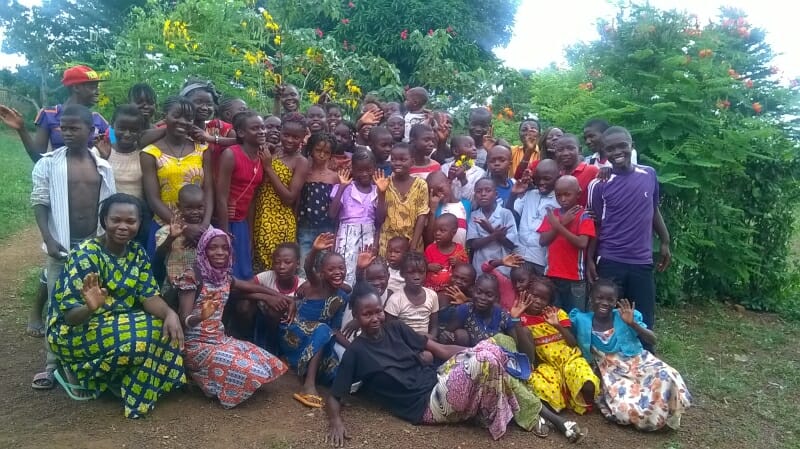
Oct 9, 2015 | Focolare Worldwide
 It is difficult to know the numbers – Misna sources report 60 dead with 300 wounded – and describe the events in a country that has been sinking in political crisis since March 2013 when a group of rebels overthrew the president; and there have been further outbreak in recent days. “The socio-political situation has worsened,” writes Geneviève Sanzé from the Central African Republic. “Christian families live between the house and the forest, so that they won’t be discovered at home and lose their lives. One priest, who lives in the north where the situation is quite serious, is offering shelter to 12,000 refugees in his parish, who are taking refuge from projectiles that are being launched all around them. He doesn’t know how he will care and find food for them. There is no more adminstrative , political or military authority in the region, and there is the constant danger of bombs in crowded areas.” From the Focolare of Bangui they write: “We were preparing to do something concrete to help promote the peace that our country is so much in need of: a sport competition with mixed teams of Christians and Muslims; a march for reconcilliation comprised of all sorts of ethnic and religious groups; a concert by several musical groups, including our own to help sway public opinion towards the need for peace; continuing visits to refugees here in Bangui and in the prison. We invited our Muslim friends and friends from different Christian churches to take part in organising these and other events, and they enthusiastically accepted.” “The first event had been planned for the 26th of September, but was not held because of a massacre that taken place here in Bangui on that day,” recounts Berndadine who works at the Nunciature. “It all began with the discovery of the lifeless body of a young Muslim woman in a Christian area. But the murderer and the circumstances surrounding the death are still unknown. In the span of a few hours non-Muslim homes were attacked, and many people were killed.” Death is everywhere, looting, destruction of houses, churches, schools, offices of international organisations and many displaced persons, including several from the Focolare community. Some have lost close relatives. They write: “We encourage each other to love, each one of us wherever we are, ready to die for our own people. Pray with us, for us and for everyone living in similar situations.” The city has seemed dead for days. “You didn’t go to work,” wrote Bernardine. “The shops were closed, the only vehicles on the street were those of the United Nations and the French Military. The population organised a protest calling everyone to civil disobedience, demanding the restoration of the national military to protect the people. More people died during the manifestation and everything stopped. Things have improved a bit in recent days, we’ve resumed some of our activities, although schools are still closed. We’re in God’s hands and we always believe in His love. Sooner or later there will even be peace in the Central African Republic.” And this hope is supported by the upcoming visit of the Pope in late November. Fidelia, from the focolare in Bangui, recounts: “The entire population, regardless of ethnic or religious group, joyfully awaits his coming. You can feel it in the air, that the people are expecting him as the bearer of hope. Everyone is preparing spiritually and materially in order to be disposed to welcome the graces that Pope Francis’s visit will bring.”
It is difficult to know the numbers – Misna sources report 60 dead with 300 wounded – and describe the events in a country that has been sinking in political crisis since March 2013 when a group of rebels overthrew the president; and there have been further outbreak in recent days. “The socio-political situation has worsened,” writes Geneviève Sanzé from the Central African Republic. “Christian families live between the house and the forest, so that they won’t be discovered at home and lose their lives. One priest, who lives in the north where the situation is quite serious, is offering shelter to 12,000 refugees in his parish, who are taking refuge from projectiles that are being launched all around them. He doesn’t know how he will care and find food for them. There is no more adminstrative , political or military authority in the region, and there is the constant danger of bombs in crowded areas.” From the Focolare of Bangui they write: “We were preparing to do something concrete to help promote the peace that our country is so much in need of: a sport competition with mixed teams of Christians and Muslims; a march for reconcilliation comprised of all sorts of ethnic and religious groups; a concert by several musical groups, including our own to help sway public opinion towards the need for peace; continuing visits to refugees here in Bangui and in the prison. We invited our Muslim friends and friends from different Christian churches to take part in organising these and other events, and they enthusiastically accepted.” “The first event had been planned for the 26th of September, but was not held because of a massacre that taken place here in Bangui on that day,” recounts Berndadine who works at the Nunciature. “It all began with the discovery of the lifeless body of a young Muslim woman in a Christian area. But the murderer and the circumstances surrounding the death are still unknown. In the span of a few hours non-Muslim homes were attacked, and many people were killed.” Death is everywhere, looting, destruction of houses, churches, schools, offices of international organisations and many displaced persons, including several from the Focolare community. Some have lost close relatives. They write: “We encourage each other to love, each one of us wherever we are, ready to die for our own people. Pray with us, for us and for everyone living in similar situations.” The city has seemed dead for days. “You didn’t go to work,” wrote Bernardine. “The shops were closed, the only vehicles on the street were those of the United Nations and the French Military. The population organised a protest calling everyone to civil disobedience, demanding the restoration of the national military to protect the people. More people died during the manifestation and everything stopped. Things have improved a bit in recent days, we’ve resumed some of our activities, although schools are still closed. We’re in God’s hands and we always believe in His love. Sooner or later there will even be peace in the Central African Republic.” And this hope is supported by the upcoming visit of the Pope in late November. Fidelia, from the focolare in Bangui, recounts: “The entire population, regardless of ethnic or religious group, joyfully awaits his coming. You can feel it in the air, that the people are expecting him as the bearer of hope. Everyone is preparing spiritually and materially in order to be disposed to welcome the graces that Pope Francis’s visit will bring.”
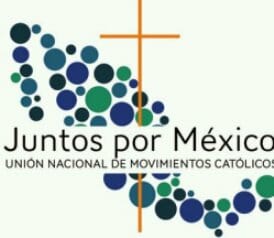
Oct 8, 2015 | Non categorizzato
 JUNTOS POR MEXICO (Together for Mexico) is a venue for meetings and mutual respect in order to facilitate joint actions for the spiritual and social good of the country. The event will have a festive but also reflective nature, with formation and education dedicated to the whole family. More than 10,000 people are expected to attend, and will reflect on the theme of the family and the role of the lay person in society according to different perspectives: anthropological, spiritual, social, and political. One of the most anticipated and important topics is the vision of young people. On the list of international speakers are Dr. Giovanni Impagliazzo (Italy), Coordinator for Latin America of the Community of Sant’Egidio; Mr. Ricardo Sada L.C., the local director of Regnum Christi; Dr. Maria Consuelo Queremel, the Vice Minister General of the Secular Franciscan Order. Speaking for the Focolare Movement are the co-president, Dr. Jesús Morán (Spain) and spouses Anna and Alberto Friso (Italy), members of the Pontifical Council for the Family. Also present will be Margaret Karram (Israel) and Marc St-Hilaire (Canada), who are responsible for the dialogue with other ecclesial movements. The event will be transmitted in streaming at www.juntospormexico.org.mx
JUNTOS POR MEXICO (Together for Mexico) is a venue for meetings and mutual respect in order to facilitate joint actions for the spiritual and social good of the country. The event will have a festive but also reflective nature, with formation and education dedicated to the whole family. More than 10,000 people are expected to attend, and will reflect on the theme of the family and the role of the lay person in society according to different perspectives: anthropological, spiritual, social, and political. One of the most anticipated and important topics is the vision of young people. On the list of international speakers are Dr. Giovanni Impagliazzo (Italy), Coordinator for Latin America of the Community of Sant’Egidio; Mr. Ricardo Sada L.C., the local director of Regnum Christi; Dr. Maria Consuelo Queremel, the Vice Minister General of the Secular Franciscan Order. Speaking for the Focolare Movement are the co-president, Dr. Jesús Morán (Spain) and spouses Anna and Alberto Friso (Italy), members of the Pontifical Council for the Family. Also present will be Margaret Karram (Israel) and Marc St-Hilaire (Canada), who are responsible for the dialogue with other ecclesial movements. The event will be transmitted in streaming at www.juntospormexico.org.mx
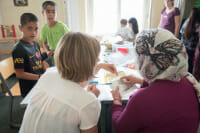
Oct 8, 2015 | Non categorizzato
 Germany has repeatedly made it in the headlines due to its controversial policies regarding refugees, that stirred up a reaction of the people in welcoming the many migrants who have arrived. Also the Focolare Movement in Germany has been working for many years now for the integration of immigrants into the social context, and intensifying its welcoming initiatives in this period. Starting from the most basic needs – such as the collection of food, clothing, furniture and other basic items, German lessons and looking for medical or legal aid – to that of a man in Aschaffenburg, define “a counter attack.” In some cities there were also some violent episodes against the refugees and those who were helping them, but there was the firm decision to respond by giving a counter-testimonial, a message which came through forcefully. The Focolare of Dresda organized in this perspective, a soiree on the theme, “Love your neighbour as yourself.” One of the organizers said “we see how many live in anxiety or even fear: the soiree was very useful, and encouraged many people to undertake actions together.” In addition to this, there was also a social media campaign, #openyourborders and #signupforpeace, launched at international levels by the Youth for United World, together with the aim of giving a further boost to the initiatives of the United World Project. But there are also concrete examples of daily life, like that of a couple from Munich, Bayern. The evening before their departure for a weekend excursion outside the city, they received a phone call asking for their willingness to host for the weekend, a young Syrian mother with three small children, while waiting to continue her journey to Karlsruhe. Though they hoped that the four would leave soon so they could at least spend a part of the weekend in the mountains, the couple – despite their internal conflict – accepted; but “the moment we took the hand of our little five-year-old princess, the ice was immediately broken,” they wrote. The weekend with the unexpected guests passed with the games played with the children, sharing their breakfast where “we renounced hotdogs out of respect for our Muslim guests who highly appreciated the yoghurt and flatbread we bought for them,” and a Syrian supper prepared together. And when we had to say goodbye on Sunday morning, “we all had tears in our eyes, and were happy and mutually grateful” – wrote the couple. What a gift the Divine director of this unexpected programme had in store for us!” Read this on www.fokolar-bewegung.de Herberge gefunden! Flüchtlinge: Stärkeres Engagement gefragt
Germany has repeatedly made it in the headlines due to its controversial policies regarding refugees, that stirred up a reaction of the people in welcoming the many migrants who have arrived. Also the Focolare Movement in Germany has been working for many years now for the integration of immigrants into the social context, and intensifying its welcoming initiatives in this period. Starting from the most basic needs – such as the collection of food, clothing, furniture and other basic items, German lessons and looking for medical or legal aid – to that of a man in Aschaffenburg, define “a counter attack.” In some cities there were also some violent episodes against the refugees and those who were helping them, but there was the firm decision to respond by giving a counter-testimonial, a message which came through forcefully. The Focolare of Dresda organized in this perspective, a soiree on the theme, “Love your neighbour as yourself.” One of the organizers said “we see how many live in anxiety or even fear: the soiree was very useful, and encouraged many people to undertake actions together.” In addition to this, there was also a social media campaign, #openyourborders and #signupforpeace, launched at international levels by the Youth for United World, together with the aim of giving a further boost to the initiatives of the United World Project. But there are also concrete examples of daily life, like that of a couple from Munich, Bayern. The evening before their departure for a weekend excursion outside the city, they received a phone call asking for their willingness to host for the weekend, a young Syrian mother with three small children, while waiting to continue her journey to Karlsruhe. Though they hoped that the four would leave soon so they could at least spend a part of the weekend in the mountains, the couple – despite their internal conflict – accepted; but “the moment we took the hand of our little five-year-old princess, the ice was immediately broken,” they wrote. The weekend with the unexpected guests passed with the games played with the children, sharing their breakfast where “we renounced hotdogs out of respect for our Muslim guests who highly appreciated the yoghurt and flatbread we bought for them,” and a Syrian supper prepared together. And when we had to say goodbye on Sunday morning, “we all had tears in our eyes, and were happy and mutually grateful” – wrote the couple. What a gift the Divine director of this unexpected programme had in store for us!” Read this on www.fokolar-bewegung.de Herberge gefunden! Flüchtlinge: Stärkeres Engagement gefragt
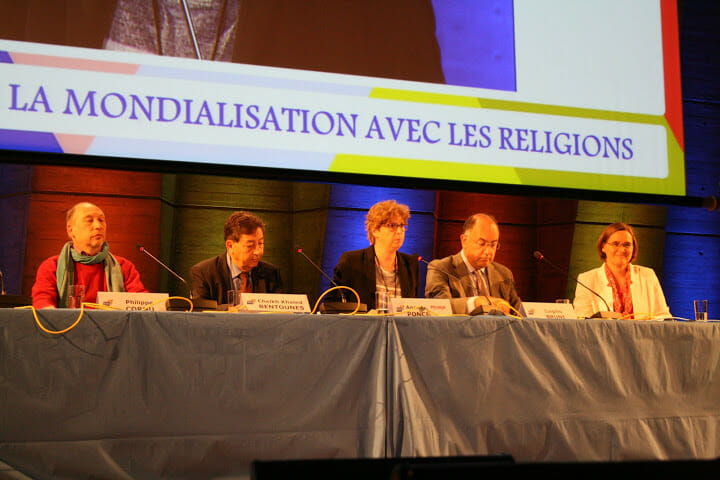
Oct 7, 2015 | Focolare Worldwide
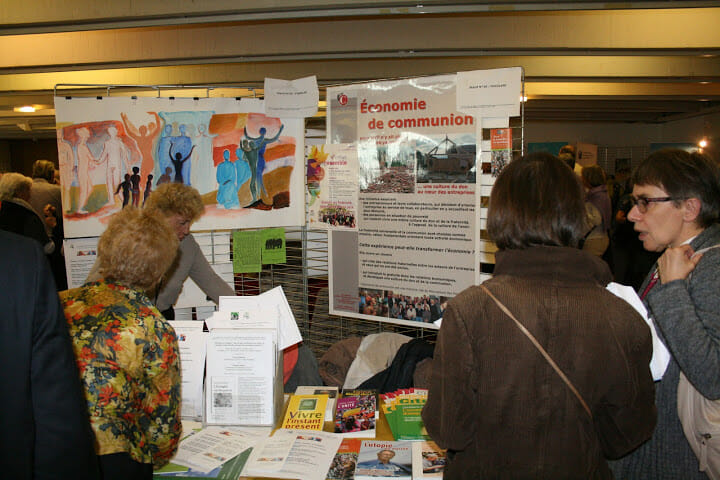
© Focolari-Alain Boudre
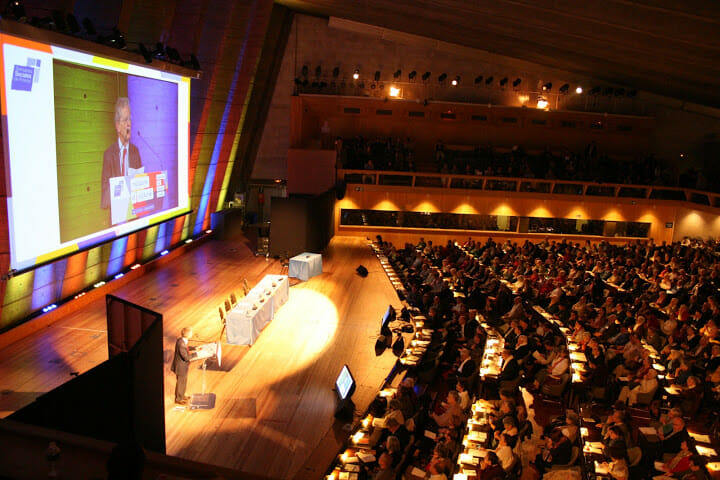
© Focolari-Alain Boudre

© Focolari-Alain Boudre
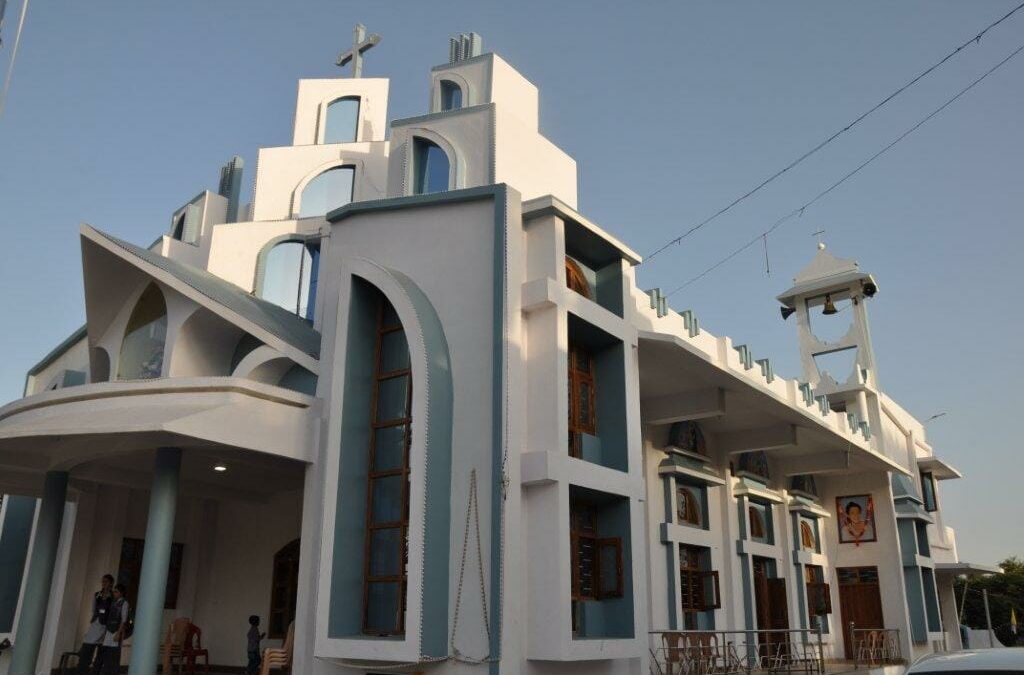
Oct 7, 2015 | Focolare Worldwide
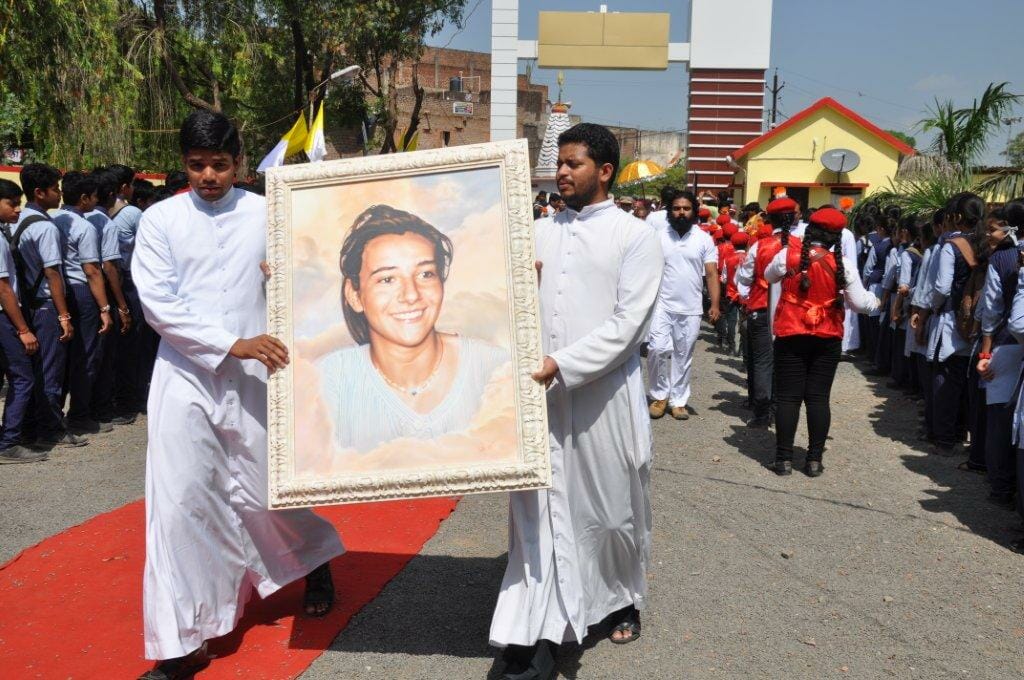 Msgr. Anthony Chirayath, bishop of the Syro-Malabar diocese of Sagar, consecrated the new church in the presence of the parents of Chiara Luce Badano, saying it was “an inspiration to all students in the country”. The couple arrived from Italy for the occasion at the invitation of the bishop. Many faithful and young students of local high schools, as well as groups of adherents to the Focolare Movement from Mumbai and Delhi, attended the ceremony.
Msgr. Anthony Chirayath, bishop of the Syro-Malabar diocese of Sagar, consecrated the new church in the presence of the parents of Chiara Luce Badano, saying it was “an inspiration to all students in the country”. The couple arrived from Italy for the occasion at the invitation of the bishop. Many faithful and young students of local high schools, as well as groups of adherents to the Focolare Movement from Mumbai and Delhi, attended the ceremony. 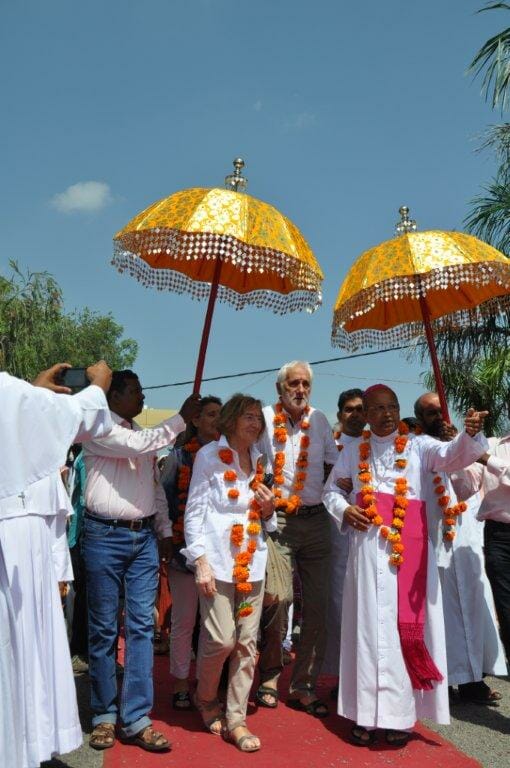 Chiara Badano, named Chiara “Luce” by Chiara Lubich, founder of the Movement (or Work of Mary), was a young Italian, who died at the age of 18 from aggressive bone cancer. She was beatified on 25 September 2010 by Pope Benedict XVI, who acknowledged her heroic virtues and tireless work for the poor, despite the pain of the disease from which she suffered. The Sironi church was dedicated to the Blessed at the express will of Msgr. Chirayath, who learned of the life of Chiara Luce during one of his trips in Italy. Keeping in mind the large youth population that resides in the Indian town and who attend the prestigious English schools in the district, Bishop Sagar sensed that Chiara’s life could serve as an “example and inspiration for students.” The celebrations were attended by Maria Teresa and Ruggero, the parents of the young Blessed, accompanied by her best friend Chicca Coriasco and her brother Franz Coriasco, who wrote Chiara Luce’s biography. Approximately 1,000 participants attended, including priests, religious, seminarians, teachers, high school students and young Focolare members, who organised performances to celebrate the event.
Chiara Badano, named Chiara “Luce” by Chiara Lubich, founder of the Movement (or Work of Mary), was a young Italian, who died at the age of 18 from aggressive bone cancer. She was beatified on 25 September 2010 by Pope Benedict XVI, who acknowledged her heroic virtues and tireless work for the poor, despite the pain of the disease from which she suffered. The Sironi church was dedicated to the Blessed at the express will of Msgr. Chirayath, who learned of the life of Chiara Luce during one of his trips in Italy. Keeping in mind the large youth population that resides in the Indian town and who attend the prestigious English schools in the district, Bishop Sagar sensed that Chiara’s life could serve as an “example and inspiration for students.” The celebrations were attended by Maria Teresa and Ruggero, the parents of the young Blessed, accompanied by her best friend Chicca Coriasco and her brother Franz Coriasco, who wrote Chiara Luce’s biography. Approximately 1,000 participants attended, including priests, religious, seminarians, teachers, high school students and young Focolare members, who organised performances to celebrate the event. 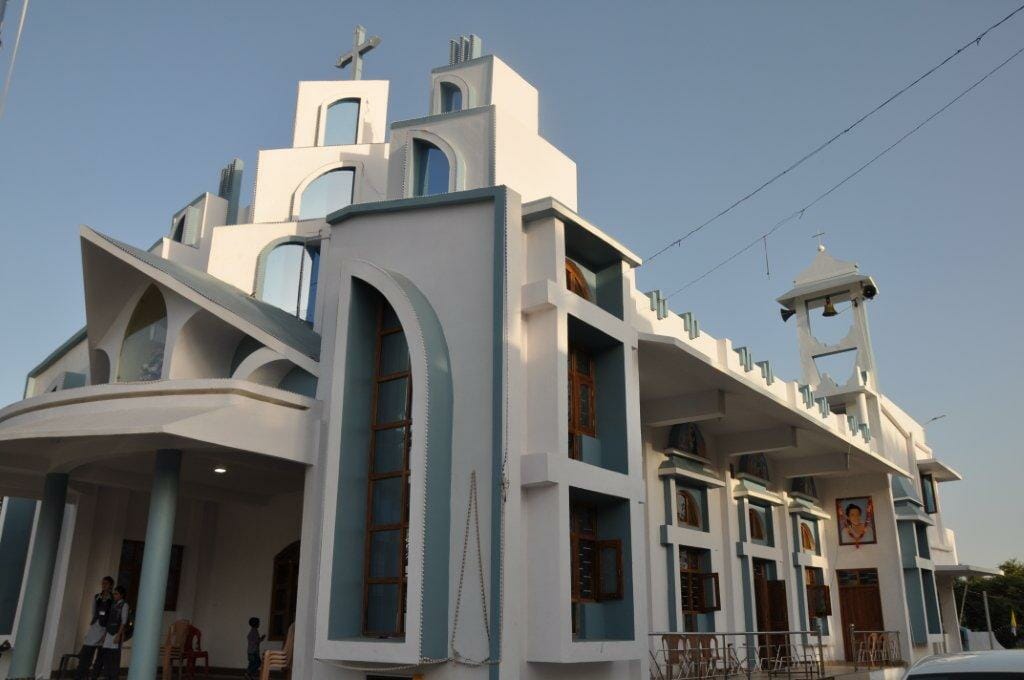 After the inauguration of the church, the parents and friends of Chiara Luce met some members of the Focolare Movement in Mumbai, eager to express their gratitude for the “witness of love and unity”. Also in Mumbai they had a meeting with “Jesusfriends4u”, a youth group inspired by the example of the life of the girl, who awarded the Badano’s the first prize dedicated to their daughter, the Effective Parenting Award. Source: Asia News
After the inauguration of the church, the parents and friends of Chiara Luce met some members of the Focolare Movement in Mumbai, eager to express their gratitude for the “witness of love and unity”. Also in Mumbai they had a meeting with “Jesusfriends4u”, a youth group inspired by the example of the life of the girl, who awarded the Badano’s the first prize dedicated to their daughter, the Effective Parenting Award. Source: Asia News
Oct 7, 2015 | Non categorizzato
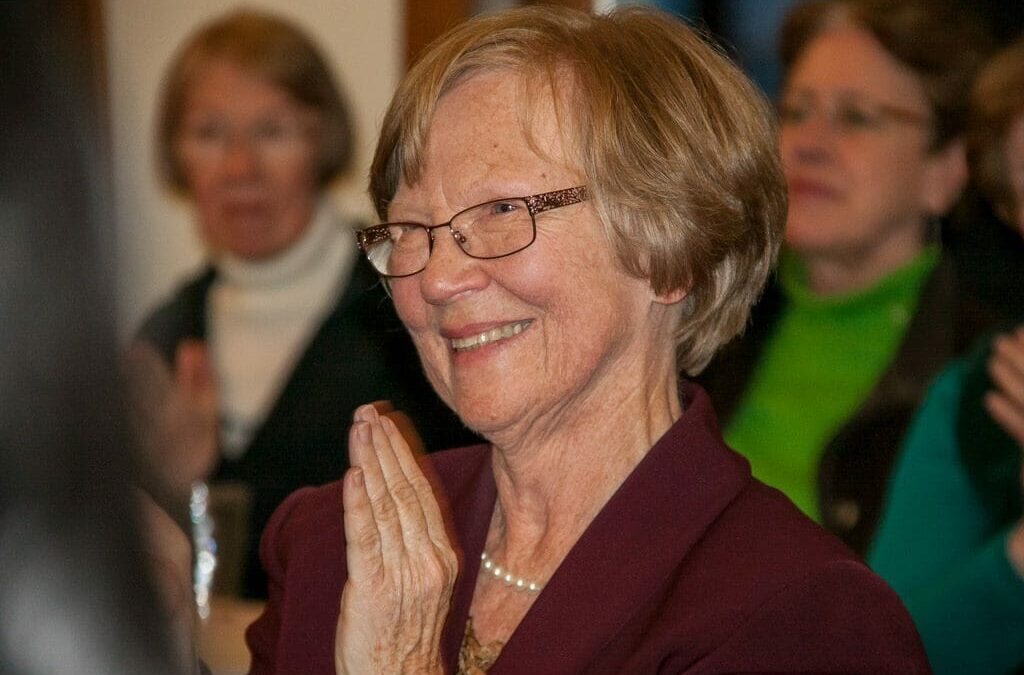
Oct 6, 2015 | Non categorizzato
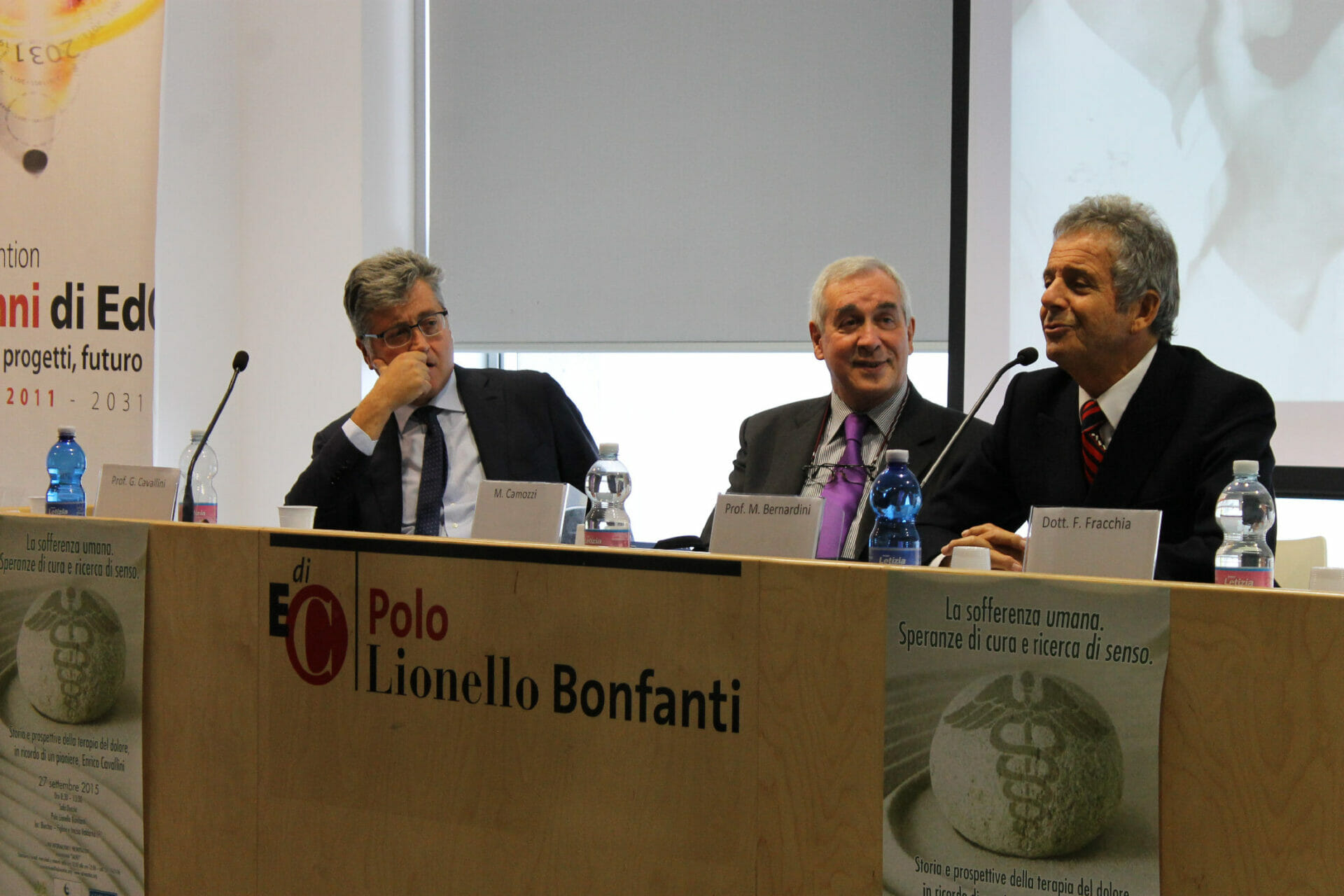 Nancy O’Donnell has worked as a psychotherapist with drug addicts and was once in charge of a medical centre that helps alcoholic women and their children. The issue of the meaning of suffering is central to the lives of people especially during their illness. We would like to ask if it is possible to face the problem of illness and find hope. “Suffering is part of every human life and it would be very difficult to help those who suffer if we ourselves have not found meaning in our own suffering. The path towards hope lies in this effort. Science offers new treatments and new therapies to improve the lives of many. The danger is when we let ourselves be fooled, believing that we will find a way not to get old, sick or suffer. If we seek only the hope of healing, we run the risk of deceiving ourselves, and this may lead to desperation which is the opposite of hope.” What is the role of psychology in the experience of the sick people, and in helping them to find hope? “We could summarise it in four points: the role of the personality and the possibility to change it, the importance of healthy relationships in facing disease, the need to know and accept one’s own limits, and the human capacity to be a gift to others. Personality: being optimistic or having a positive attitude may reduce the risk of illnesses and chronic disorders. At the Davis University in California, they discovered that writing down each day the things you are grateful for helped to increase happiness. The results were more significant when compared with a group that was asked to note down instead, only the things that had provoked greater stress.
Nancy O’Donnell has worked as a psychotherapist with drug addicts and was once in charge of a medical centre that helps alcoholic women and their children. The issue of the meaning of suffering is central to the lives of people especially during their illness. We would like to ask if it is possible to face the problem of illness and find hope. “Suffering is part of every human life and it would be very difficult to help those who suffer if we ourselves have not found meaning in our own suffering. The path towards hope lies in this effort. Science offers new treatments and new therapies to improve the lives of many. The danger is when we let ourselves be fooled, believing that we will find a way not to get old, sick or suffer. If we seek only the hope of healing, we run the risk of deceiving ourselves, and this may lead to desperation which is the opposite of hope.” What is the role of psychology in the experience of the sick people, and in helping them to find hope? “We could summarise it in four points: the role of the personality and the possibility to change it, the importance of healthy relationships in facing disease, the need to know and accept one’s own limits, and the human capacity to be a gift to others. Personality: being optimistic or having a positive attitude may reduce the risk of illnesses and chronic disorders. At the Davis University in California, they discovered that writing down each day the things you are grateful for helped to increase happiness. The results were more significant when compared with a group that was asked to note down instead, only the things that had provoked greater stress. 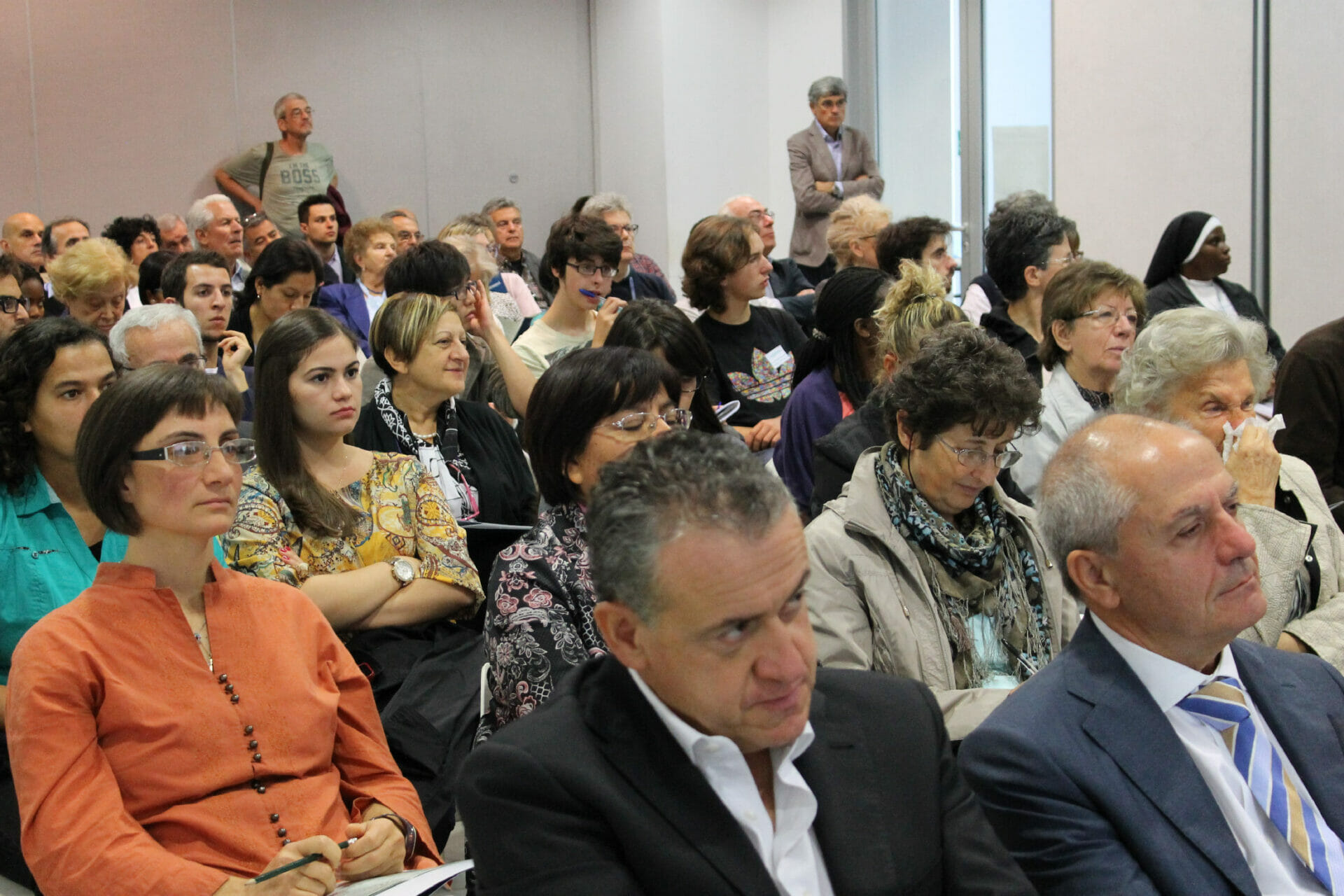 The second point: relationships. From the moment we are born, we have the capacity to establish relationships. The mental health of every person depends on his capacity to “coordinate” himself and “tune in” with others. The human mind is healthy when it possesses some strategic relational skills that allow it to “open up” to a multitude of social realities, that is, with the ability to “perceive” the others and their diversity in an adequate manner. If our identity is relational, it would be logical in moments when nurturing hope becomes a challenge to find the support of people close to us and with whom we have built deep relationships which strengthen the positive energy we need to remain hopeful. Furthermore, not accepting one’s own limits is one of the most typical difficulties people have today. The limit appears through the person’s condition and his/her story, through those experiences that imply the risk of frustration. In a world that offers us a life “without limits,” the onset of illness takes on numerous expressions of that limitation which becomes a decisive transition towards achieving one’s own fulfillment. Lastly, being a gift for the others even when your physical strength is greatly reduced makes a person play an active role always. This is where you acquire a dignity that is born in the depths of our being.”
The second point: relationships. From the moment we are born, we have the capacity to establish relationships. The mental health of every person depends on his capacity to “coordinate” himself and “tune in” with others. The human mind is healthy when it possesses some strategic relational skills that allow it to “open up” to a multitude of social realities, that is, with the ability to “perceive” the others and their diversity in an adequate manner. If our identity is relational, it would be logical in moments when nurturing hope becomes a challenge to find the support of people close to us and with whom we have built deep relationships which strengthen the positive energy we need to remain hopeful. Furthermore, not accepting one’s own limits is one of the most typical difficulties people have today. The limit appears through the person’s condition and his/her story, through those experiences that imply the risk of frustration. In a world that offers us a life “without limits,” the onset of illness takes on numerous expressions of that limitation which becomes a decisive transition towards achieving one’s own fulfillment. Lastly, being a gift for the others even when your physical strength is greatly reduced makes a person play an active role always. This is where you acquire a dignity that is born in the depths of our being.”
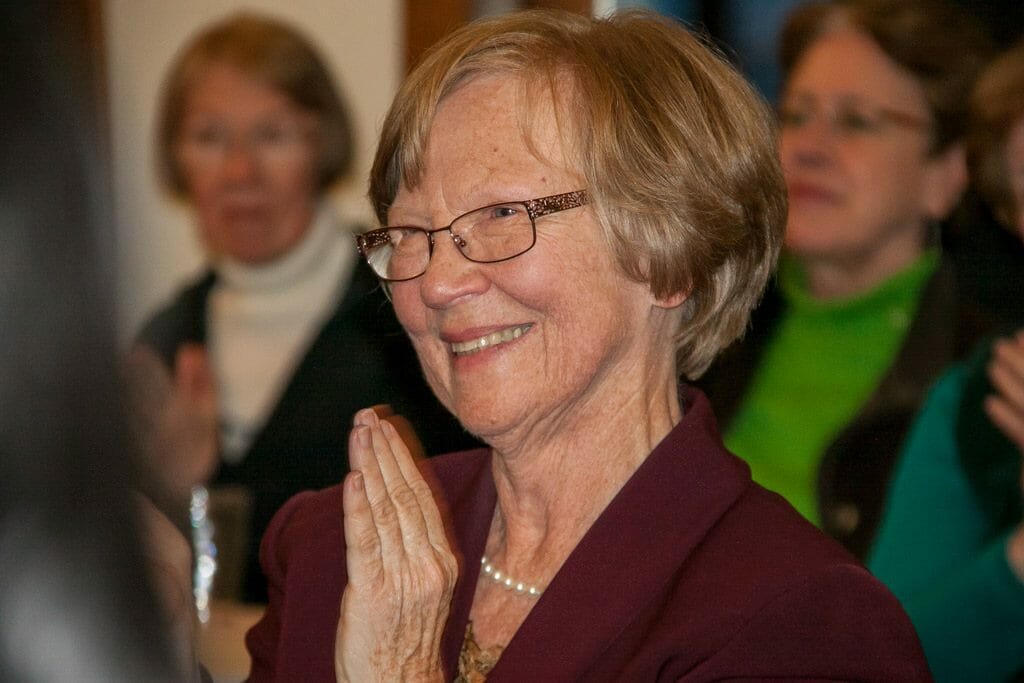
Dr Nancy O’Connell
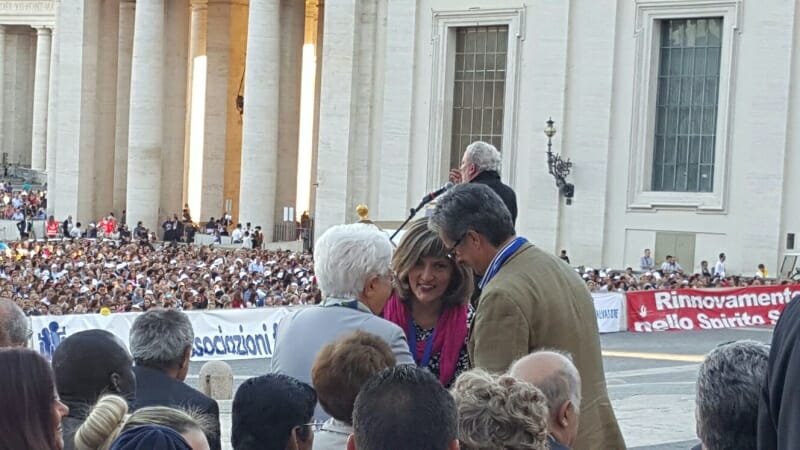
Oct 5, 2015 | Non categorizzato
 Maria Voce took part in the prayer vigil in St. Peter’s Square on Saturday, October 3rd where she gave a short talk. The journalist began by asking her: Why is this time of prayer so important? “It is because, as Christians, we believe it is above all the Holy Spirit who should be at work. This is a very delicate time when we hear many different opinions in the media. But it is only the Holy Spirit who can satisfy the great expectations, and do so as He wants and not how people think. So the most important thing is to pray for special help from the Holy Spirit, first of all for the Pope and then for all the Synod Fathers.” It helps us broaden our horizons a bit… “The family is the most wounded part of humanity at the moment. In a certain sense, it is like a sick daughter who the Church is watching over with a mother’s love, wanting her to get well. The Church is doing this act of pastoral conversion to care to one of its members who is suffering. I think all of us should have this attitude. I think we should disregard expectations for some kind of major changes from the doctrinal point of view or in the laws that govern the institution of marriage. I think that the greatest expectation is to ask ourselves as a Church what conversion is required of us towards these suffering brothers and sisters. The family is bombarded from all sides nowadays, by politics and by business lobbies; by those who want to take advantage of family issues as opportunities to pursue their own interests. The Focolare Movement has always had special concern for the family. One of its branches is especially dedicated to them and seeks to follow all the families in the world. They help prepare young people for marriage so that they can face married life with greater awareness. As far as possible they also help them find what they need (work, home, and so on) so as to start a family. And after marriage, they accompany these young couples on their new journey so that at the first signs of possible crises, which are natural, they may find a community ready to welcome and make them feel that they are not alone, that the love of the community is always present and caring. They do courses on addressing crises, with trained specialists. They help people who are separated and also those who are divorced and remarried, so that they feel, even in these circumstances, that they are members of the community and are loved and respected in their dignity as God’s children. They are helped to discover that being part of the community does not only mean sharing in the Eucharist but is manifested in living Gospel love together, sharing joys and sufferings, experiencing the closeness of God and the Church. The Synod asks all of us to make this conversion together, and this seems to me to be very important. However, I do not think that we should only focus on the divorced and remarried. The Synod is concerned with the family in its whole lifespan: widows, parents with young people who cannot find work, refugees, children, and so on. We need to look at the family as an icon of today’s society: it is humanity today that is suffering in the family. And humanity today must take on this suffering family and make this burden its own.” So the family is an encounter with the Church “going outwards” as Pope Francis continually urges us? “Absolutely! I believe it is the family that you can bear witness to the possibility of deep personal relationships, not only those you have by phone or on the internet. It is person to person relationships, with your children’s friends, and their parents, for example. Our role as laypeople is to be alongside everyone, to leave our own safe backyard so as to journey with them every day, in schools, at work, in the daily problems. This is why laity are at the Synod, and we too are very glad that a Focolare couple from Colombia were invited as auditors, Angelica Maria and José Luis from Colombia.” Last year, there was a couple from Rwanda, am I right? “Yes. I think that these married lay people at the Synod bring all the challenges that they too live and encounter, together with the others. Naturally, the Synod Fathers come with all the experiences, statements and sufferings that they have collected around the world. But this encounter between the ministerial Church and the laity is good. The Church is just one reality in which lay people and priests are together. The Church is the people of God on the move, taking care of all her children.” Listen to the complete interview of Radio Inblu with Maria Voce, 3 October 2015 (in Italian from 11’ 15’’)
Maria Voce took part in the prayer vigil in St. Peter’s Square on Saturday, October 3rd where she gave a short talk. The journalist began by asking her: Why is this time of prayer so important? “It is because, as Christians, we believe it is above all the Holy Spirit who should be at work. This is a very delicate time when we hear many different opinions in the media. But it is only the Holy Spirit who can satisfy the great expectations, and do so as He wants and not how people think. So the most important thing is to pray for special help from the Holy Spirit, first of all for the Pope and then for all the Synod Fathers.” It helps us broaden our horizons a bit… “The family is the most wounded part of humanity at the moment. In a certain sense, it is like a sick daughter who the Church is watching over with a mother’s love, wanting her to get well. The Church is doing this act of pastoral conversion to care to one of its members who is suffering. I think all of us should have this attitude. I think we should disregard expectations for some kind of major changes from the doctrinal point of view or in the laws that govern the institution of marriage. I think that the greatest expectation is to ask ourselves as a Church what conversion is required of us towards these suffering brothers and sisters. The family is bombarded from all sides nowadays, by politics and by business lobbies; by those who want to take advantage of family issues as opportunities to pursue their own interests. The Focolare Movement has always had special concern for the family. One of its branches is especially dedicated to them and seeks to follow all the families in the world. They help prepare young people for marriage so that they can face married life with greater awareness. As far as possible they also help them find what they need (work, home, and so on) so as to start a family. And after marriage, they accompany these young couples on their new journey so that at the first signs of possible crises, which are natural, they may find a community ready to welcome and make them feel that they are not alone, that the love of the community is always present and caring. They do courses on addressing crises, with trained specialists. They help people who are separated and also those who are divorced and remarried, so that they feel, even in these circumstances, that they are members of the community and are loved and respected in their dignity as God’s children. They are helped to discover that being part of the community does not only mean sharing in the Eucharist but is manifested in living Gospel love together, sharing joys and sufferings, experiencing the closeness of God and the Church. The Synod asks all of us to make this conversion together, and this seems to me to be very important. However, I do not think that we should only focus on the divorced and remarried. The Synod is concerned with the family in its whole lifespan: widows, parents with young people who cannot find work, refugees, children, and so on. We need to look at the family as an icon of today’s society: it is humanity today that is suffering in the family. And humanity today must take on this suffering family and make this burden its own.” So the family is an encounter with the Church “going outwards” as Pope Francis continually urges us? “Absolutely! I believe it is the family that you can bear witness to the possibility of deep personal relationships, not only those you have by phone or on the internet. It is person to person relationships, with your children’s friends, and their parents, for example. Our role as laypeople is to be alongside everyone, to leave our own safe backyard so as to journey with them every day, in schools, at work, in the daily problems. This is why laity are at the Synod, and we too are very glad that a Focolare couple from Colombia were invited as auditors, Angelica Maria and José Luis from Colombia.” Last year, there was a couple from Rwanda, am I right? “Yes. I think that these married lay people at the Synod bring all the challenges that they too live and encounter, together with the others. Naturally, the Synod Fathers come with all the experiences, statements and sufferings that they have collected around the world. But this encounter between the ministerial Church and the laity is good. The Church is just one reality in which lay people and priests are together. The Church is the people of God on the move, taking care of all her children.” Listen to the complete interview of Radio Inblu with Maria Voce, 3 October 2015 (in Italian from 11’ 15’’)
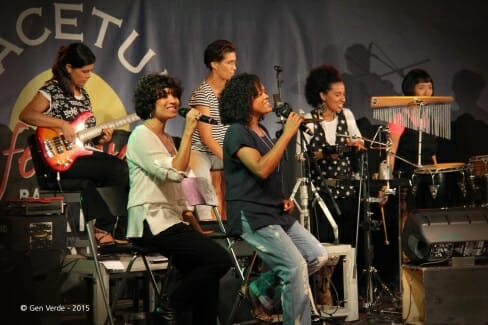
Oct 5, 2015 | Focolare Worldwide, Senza categoria
 “We worked hard. For three years we listened to thousands of people, especially the young people that we met at home or on tour. We composed music and wrote lyrics, but above all strived to live out the meaning of our words: putting ourselves in the game, taking risks, welcoming both the ugly and beautiful in humanity. We can’t wait to go to Great Britain. The one talking is Sally McAllister, Gen Verde’s manager, Irish by birth and English by adoption: “I’ve lived in London for more than 30 years and learnt to know and love the people. So it is with much joy that we are accepting the invitation to return there.” The Focolare has been in Great Britain since 1963, spread throughout many cities of the United Kingdom, and its members are Roman Catholic, Anglican and faithful of the Free Churches. There are also Muslims and Sikhs who, in their own way, are true witnesses of a living unity that is at times lived out painstakingly in daily life. “Why did they invite us,” Sally asks. “The Focolare communities arranged the entire tour:a group of twenty young people and adults, families that are spread throughout the United Kingdom. We dreamed it up and organised it together. They told us that they wanted to open hearts and hands, to recompose relationships, overcome hatreds and distrust: to encounter the people and share the gift of communion in diversity.” “That took courage, and I must say that these people have a good dose of it! We’ll have 12 engagements with a total of 7 “Start Now” shows, 5 acoustic concerts and several other encounters.” Listening to Sally’s words one realises that they are only the tip of the iceberg and that Gen Verde’s musical tour in the United Kingdom is capable of touching a chord with the people. “We’ll go on stage in complex places like London, Birmingham, Glasgow, Oxford, Liverpool, Portsmouth and Cardiff,” Sally explained, “with a social and cultural fabric that has been defined as post-Christian and disintegrating, but where ecumenical and interreligious dimensions are still strong. Through the music, words and choreography we will describe the life amongst us and many other parts of the world: a life of communion, fraternity, sacrifice and reciprocity. We would like to show the ‘much more’ that is already there but not being spotlighted by British society; what is being done for others but risks remaining hidden behind media titles that often broadcast exclusion, defensiveness and fear.” In London, Gen Verde will also meet young people from the Islamic Centre, invited by Imam Dr. Mohammad Ali Shomali. “Let us focus on the values that unite us and and work together.” Judging by the passion that Sally is putting into this, it is obvious that young people will have the place of honour during this tour: “They are the thermometer of society, they often live in the darkest depths and it is no mystery that even Great Britain, like other European countries, violence and suicides are very much on the rise amongst people under 30. The new show that will go on stage in Great Britain will also include some new pieces “On the Other Side,” their latest released album. “It is geared towards young people and its themes are universal. It presents a journey in four parts: We begin with the challenges, the deep ones, the ones that make you look into yourself. Then comes the question: Is it even possible to overcome them? Finally, there is the invitation to go out and build the present and the future together, and this part is called “No frontiers,” because together we can make the difference.” See official Focolare website for news and events: www.focolare.org/gb https://www.youtube.com/watch?v=llkkHKzywrM
“We worked hard. For three years we listened to thousands of people, especially the young people that we met at home or on tour. We composed music and wrote lyrics, but above all strived to live out the meaning of our words: putting ourselves in the game, taking risks, welcoming both the ugly and beautiful in humanity. We can’t wait to go to Great Britain. The one talking is Sally McAllister, Gen Verde’s manager, Irish by birth and English by adoption: “I’ve lived in London for more than 30 years and learnt to know and love the people. So it is with much joy that we are accepting the invitation to return there.” The Focolare has been in Great Britain since 1963, spread throughout many cities of the United Kingdom, and its members are Roman Catholic, Anglican and faithful of the Free Churches. There are also Muslims and Sikhs who, in their own way, are true witnesses of a living unity that is at times lived out painstakingly in daily life. “Why did they invite us,” Sally asks. “The Focolare communities arranged the entire tour:a group of twenty young people and adults, families that are spread throughout the United Kingdom. We dreamed it up and organised it together. They told us that they wanted to open hearts and hands, to recompose relationships, overcome hatreds and distrust: to encounter the people and share the gift of communion in diversity.” “That took courage, and I must say that these people have a good dose of it! We’ll have 12 engagements with a total of 7 “Start Now” shows, 5 acoustic concerts and several other encounters.” Listening to Sally’s words one realises that they are only the tip of the iceberg and that Gen Verde’s musical tour in the United Kingdom is capable of touching a chord with the people. “We’ll go on stage in complex places like London, Birmingham, Glasgow, Oxford, Liverpool, Portsmouth and Cardiff,” Sally explained, “with a social and cultural fabric that has been defined as post-Christian and disintegrating, but where ecumenical and interreligious dimensions are still strong. Through the music, words and choreography we will describe the life amongst us and many other parts of the world: a life of communion, fraternity, sacrifice and reciprocity. We would like to show the ‘much more’ that is already there but not being spotlighted by British society; what is being done for others but risks remaining hidden behind media titles that often broadcast exclusion, defensiveness and fear.” In London, Gen Verde will also meet young people from the Islamic Centre, invited by Imam Dr. Mohammad Ali Shomali. “Let us focus on the values that unite us and and work together.” Judging by the passion that Sally is putting into this, it is obvious that young people will have the place of honour during this tour: “They are the thermometer of society, they often live in the darkest depths and it is no mystery that even Great Britain, like other European countries, violence and suicides are very much on the rise amongst people under 30. The new show that will go on stage in Great Britain will also include some new pieces “On the Other Side,” their latest released album. “It is geared towards young people and its themes are universal. It presents a journey in four parts: We begin with the challenges, the deep ones, the ones that make you look into yourself. Then comes the question: Is it even possible to overcome them? Finally, there is the invitation to go out and build the present and the future together, and this part is called “No frontiers,” because together we can make the difference.” See official Focolare website for news and events: www.focolare.org/gb https://www.youtube.com/watch?v=llkkHKzywrM
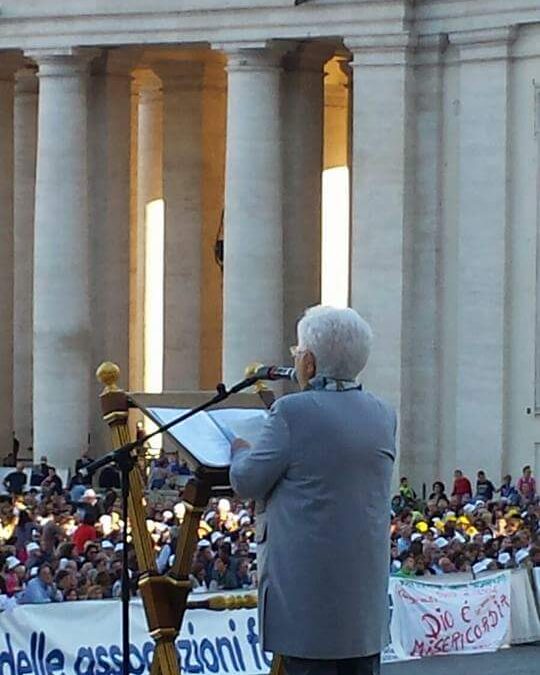
Oct 4, 2015 | Non categorizzato
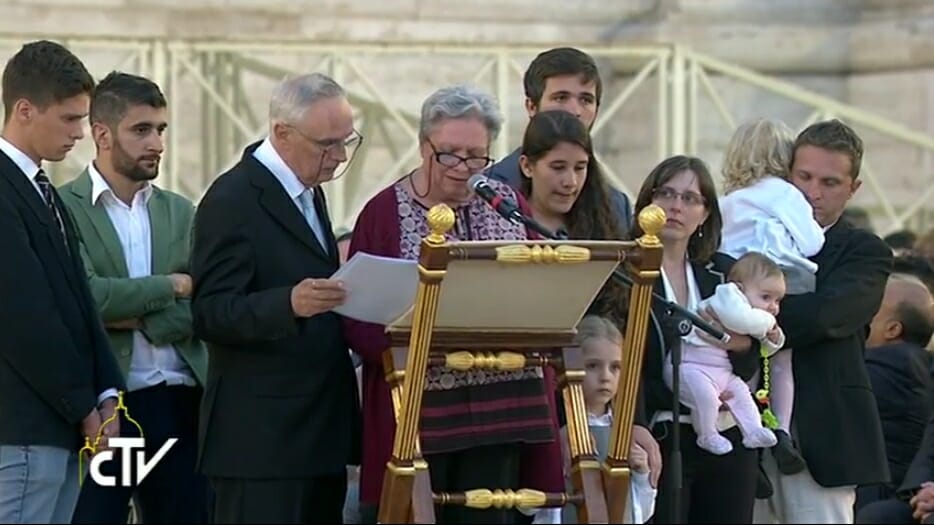 October 4 will open the much-awaited Synod on the family, following the extraordinary, preparatory one held last year. Also this time, the Pope wanted to prepare for the Synod with a prayer vigil “to pray that the Holy Spirit will enlighten the Synod Fathers in their challenging task.” So on the evening of 3 October everyone was there: married couples, children, engaged couples, grandfathers, mothers, aunts, cousins, religious, single people……. will come to gather around Pope Francis. Many of them will come from faraway places, but will all be protagonists precisely because from the start, each felt involved in the reflections prepared by the two synodal sessions. It had never occurred, in fact, that upon proclaiming a Synod, the pope would want a double, popular consultation almost as if to say that the walls of the synod assembly hall had to be widened to be able to listen to those who live family lives or those who even anonymously, make sure that the family avails of all the support rightly due to it, inasmuch as it is the legacy of creation.
October 4 will open the much-awaited Synod on the family, following the extraordinary, preparatory one held last year. Also this time, the Pope wanted to prepare for the Synod with a prayer vigil “to pray that the Holy Spirit will enlighten the Synod Fathers in their challenging task.” So on the evening of 3 October everyone was there: married couples, children, engaged couples, grandfathers, mothers, aunts, cousins, religious, single people……. will come to gather around Pope Francis. Many of them will come from faraway places, but will all be protagonists precisely because from the start, each felt involved in the reflections prepared by the two synodal sessions. It had never occurred, in fact, that upon proclaiming a Synod, the pope would want a double, popular consultation almost as if to say that the walls of the synod assembly hall had to be widened to be able to listen to those who live family lives or those who even anonymously, make sure that the family avails of all the support rightly due to it, inasmuch as it is the legacy of creation. 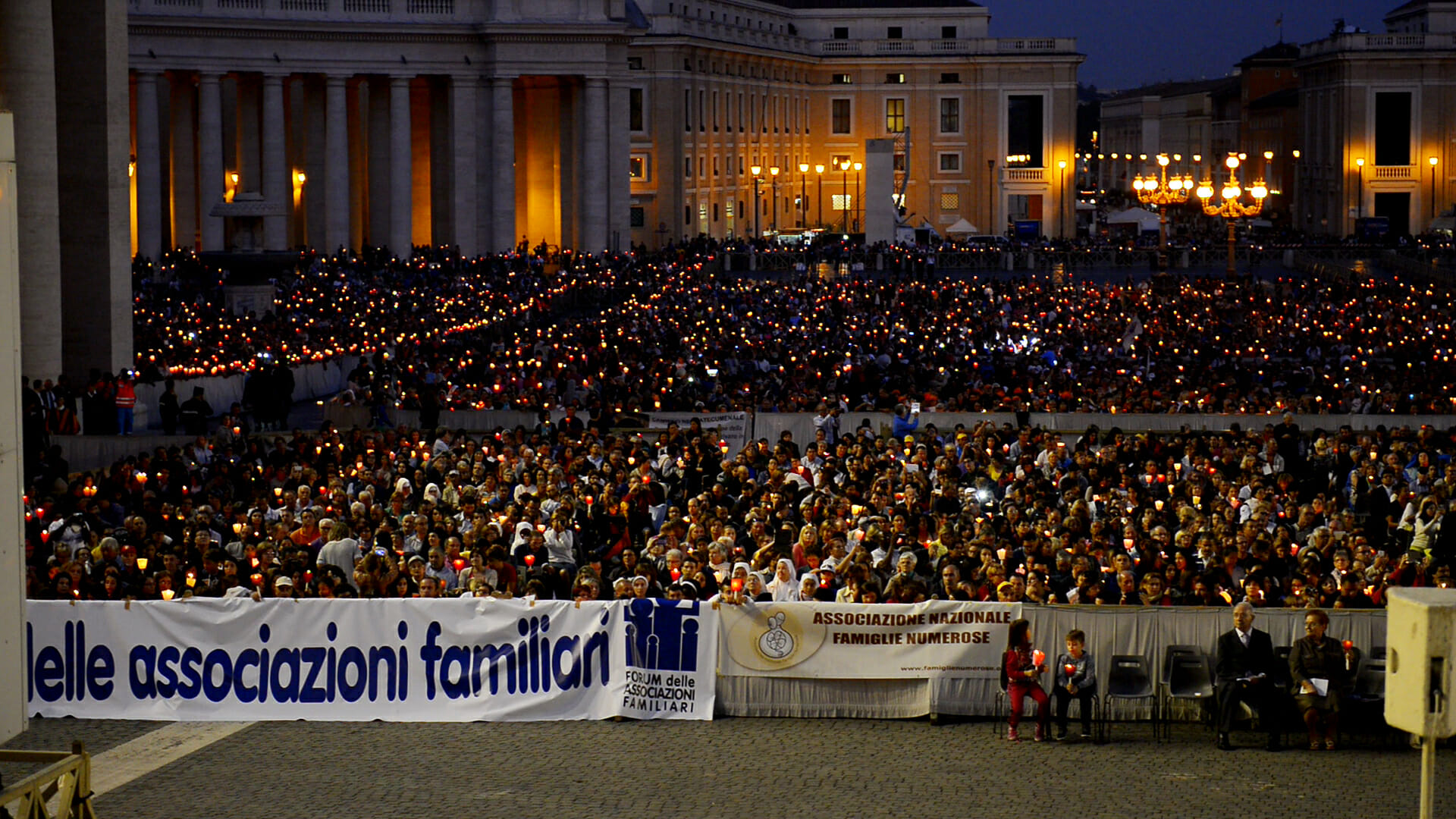 Each of the participants was holding a burning torch: many small fires that together will brighten the horizons of all the families, and of those which follow every day with renewed vigor, the trail of their original design, as of those immersed in darkness and no longer believe in love. Many torches will signify that the ‘till death do us part’ in Christ is possible, and that the grace of the sacrament of marriage heals every incapacity to love and gives spouses a splendid treasure: the presence of Jesus in their homes. The prayer vigil was also animated by songs – offered by various bands among which those of the Focolare – along with testimonies of families which are a different type of prayer, but likewise important and sacred. All these also highlight the beauty of the family, which often arises from a tiresome daily routine, imbued with gratuity, tenderness, and forgiveness which alone can give true joy. Testimonials to the sharing of life paths make all see that the family represents a gift to the world and a precious way of announcing the Gospel.
Each of the participants was holding a burning torch: many small fires that together will brighten the horizons of all the families, and of those which follow every day with renewed vigor, the trail of their original design, as of those immersed in darkness and no longer believe in love. Many torches will signify that the ‘till death do us part’ in Christ is possible, and that the grace of the sacrament of marriage heals every incapacity to love and gives spouses a splendid treasure: the presence of Jesus in their homes. The prayer vigil was also animated by songs – offered by various bands among which those of the Focolare – along with testimonies of families which are a different type of prayer, but likewise important and sacred. All these also highlight the beauty of the family, which often arises from a tiresome daily routine, imbued with gratuity, tenderness, and forgiveness which alone can give true joy. Testimonials to the sharing of life paths make all see that the family represents a gift to the world and a precious way of announcing the Gospel. 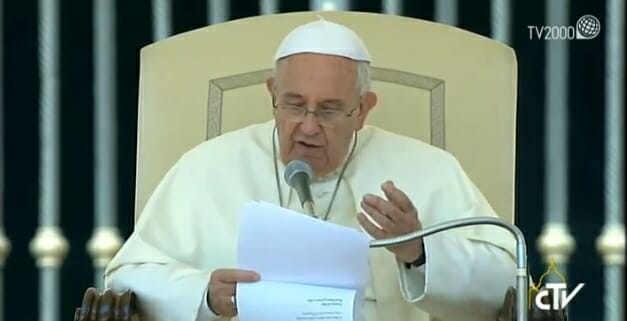 “May the Synod acknowledge, esteem, and proclaim all that is beautiful, good and holy about that experience,” the Holy Father prayed. “May it embrace situations of vulnerability and hardship: war, illness, grief, wounded relationships and brokenness, which create distress, resentment and separation.” The Pope continued, “Let us pray for a Synod which, more than speaking about the family, can learn from the family, readily acknowledging its dignity, its strength and its value, despite all its problems and difficulties.” He also expressed the desire that what is offered is “a Church which is a mother, ever capable of giving and nourishing life, accompanying it with devotion, tenderness, and moral strength. For unless we can unite compassion with justice, we will end up being needlessly severe and deeply unjust.”
“May the Synod acknowledge, esteem, and proclaim all that is beautiful, good and holy about that experience,” the Holy Father prayed. “May it embrace situations of vulnerability and hardship: war, illness, grief, wounded relationships and brokenness, which create distress, resentment and separation.” The Pope continued, “Let us pray for a Synod which, more than speaking about the family, can learn from the family, readily acknowledging its dignity, its strength and its value, despite all its problems and difficulties.” He also expressed the desire that what is offered is “a Church which is a mother, ever capable of giving and nourishing life, accompanying it with devotion, tenderness, and moral strength. For unless we can unite compassion with justice, we will end up being needlessly severe and deeply unjust.” 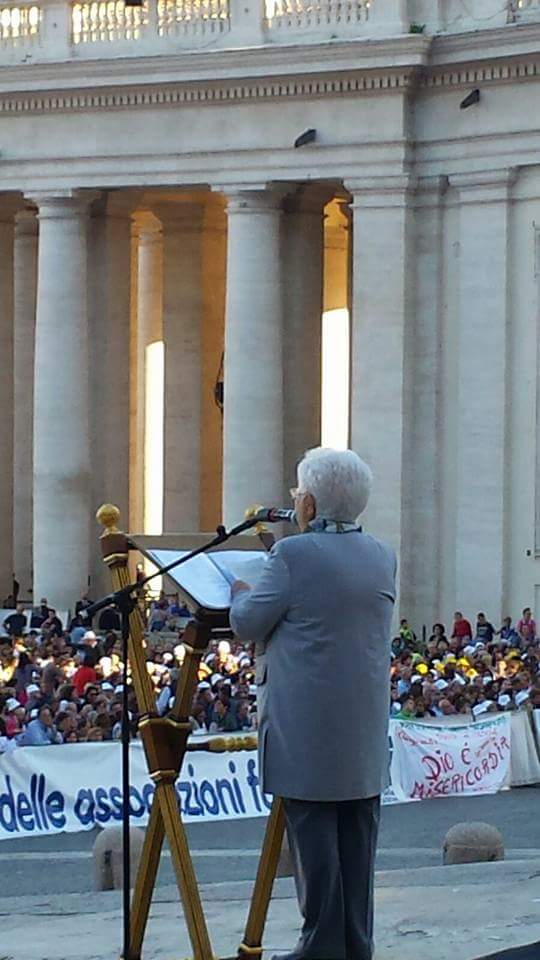 Maria Voce, who touched on the stories of those families who have decided to walk with the Resurrected Christ in their midst, affirmed that also they, like the disciples of Emmaus, “felt their hearts burn with the typical joy that the presence of Christ gives, experiencing the gifts of unity with God and among themselves, light, courage, missionary drive and furthermore”, the Focolare Presidente stated, “Jesus himself, will speak to the hearts of those they meet, and revive hope in them.” “The Pope,” continued Maria Voce, “spurs on the families to take the initiative in bringing this gift to the community. We want to accept this challenge, too, and do so in cooperation with our parishes and all the other movements and associations, especially in hosting the refugees who knock on the doors of our hearts. The Christian families have been entrusted with the task of human coexistence healed by mercy. They can show humanity the tenderness and force of God’s love and in this way, the Pope said, every day write a page of sacred history, not the one written only in books, but that which will remain forever in the heart of the Father.”
Maria Voce, who touched on the stories of those families who have decided to walk with the Resurrected Christ in their midst, affirmed that also they, like the disciples of Emmaus, “felt their hearts burn with the typical joy that the presence of Christ gives, experiencing the gifts of unity with God and among themselves, light, courage, missionary drive and furthermore”, the Focolare Presidente stated, “Jesus himself, will speak to the hearts of those they meet, and revive hope in them.” “The Pope,” continued Maria Voce, “spurs on the families to take the initiative in bringing this gift to the community. We want to accept this challenge, too, and do so in cooperation with our parishes and all the other movements and associations, especially in hosting the refugees who knock on the doors of our hearts. The Christian families have been entrusted with the task of human coexistence healed by mercy. They can show humanity the tenderness and force of God’s love and in this way, the Pope said, every day write a page of sacred history, not the one written only in books, but that which will remain forever in the heart of the Father.”
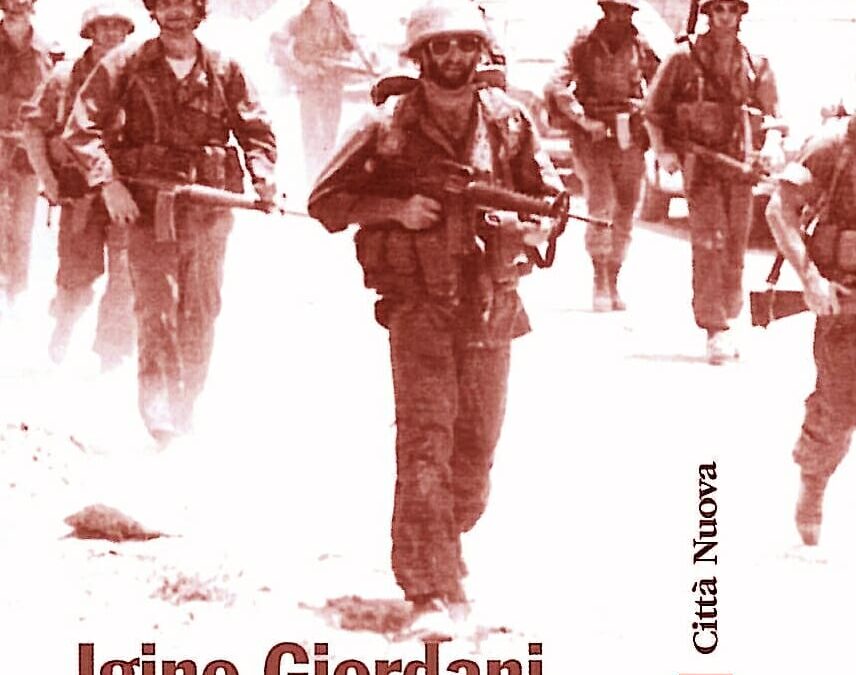
Oct 3, 2015 | Non categorizzato
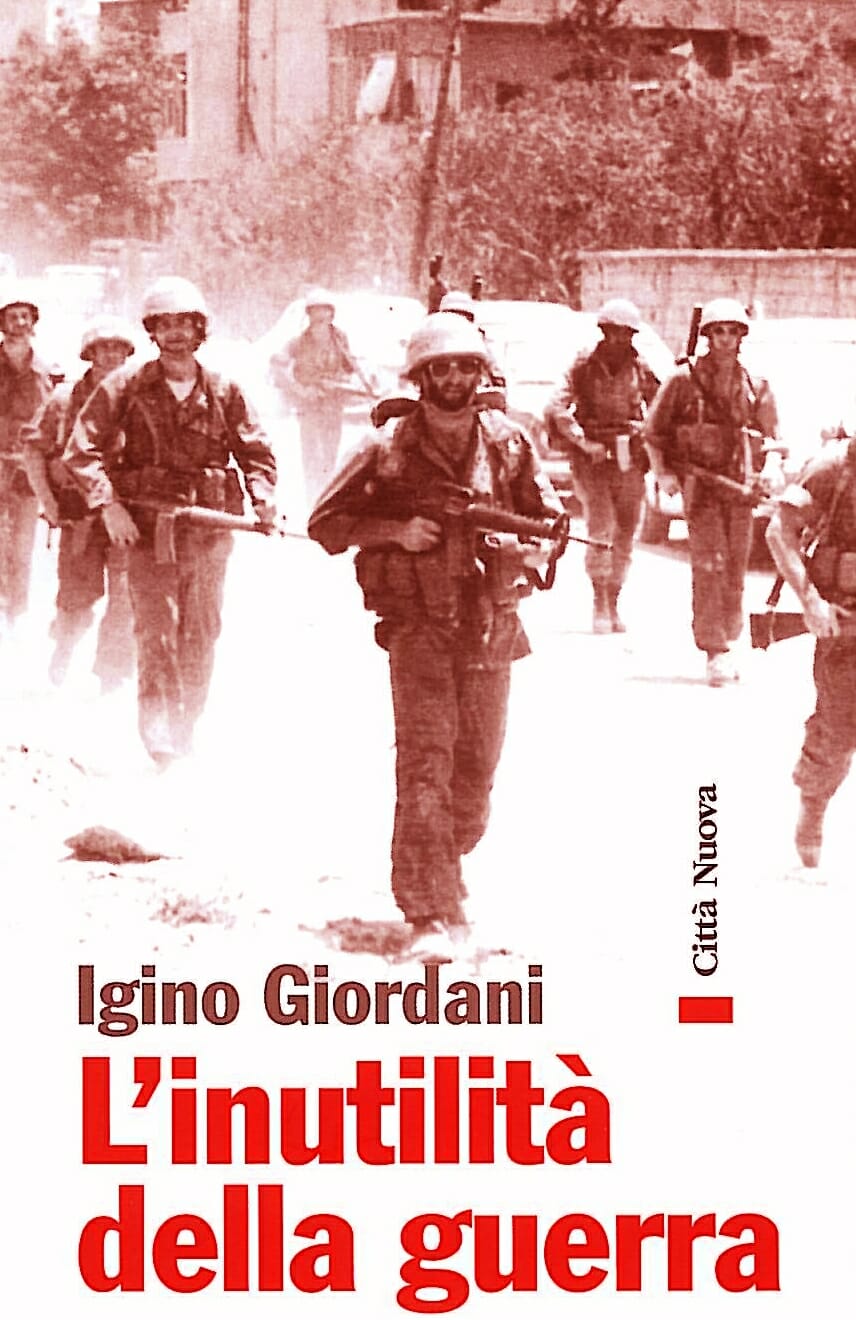 Peace is the result of fraternity amongst the peoples, solidarity with the weakest, mutual respect. This is how a more just world is built, this is how war is set aside war as a barbaric undertaking that belongs to a dark period of human history. Giordani knew war: he had taken part in the first world war. He received a medal after he had been seriously wounded on the Austrian front. But it is not only the horror of blood and death that should put aside war as a means of solving international problems. War can be seen as something quite natural to those impoverished minds that imagine humankind as a machine in thirst of power, ready to launch out against any enemy to satisfy its dreams of power. Yet, there is nothing natural about inflicitng suffering, misery and death. Wars never produce wins, only defeats. As history teaches, and Giordani reminds us: the great problems that all wars leave behind are far more distressing than the ones that meant to be resolved by engaging in conflict. This is why he suggest that we put aside our arms and military sentiments, and prepare a peaceful order. Moreover, for those who believe that human beings are God’s children any offence against a neighbour should be kept far from us. How can one love God by making attempts against the life of His children? A half century has gone by since Giordani wrote these texts, which are taken from L’inutilità della guerra (“The uselessness of War)”, but they could have been written for our own times that are threatened by such dangerous conflicts. “War is large scale murder dressed up as some sort of sacred cult, like the sacrifices of the firstborn to the god, Baal.The purpose of those sacrifices was to instill terror with their rhetoric and the interests that were behind them. Once humankind makes some spiritual progress, war will also be filed away along cruel pagan rituals, superstitions, wizadry and barbarity. War is to humanity what illness is to health, sin to the soul: it is slaughter and destruction, infection of body and soul, individual and collectivity.” “History confirms Christian reasoning, since the construction of weapons produces nothing but fear, mistrust and war. Those that say ‘If you want peace, prepare for war’ are false realists. You only need to open a book of history to see what the accumulation of arms and amunition leads to. Peace is difficult, but Christians are not naive: we want peace, not illusion. Peace is never going to just fall from Heaven all ready and nice. Peace is a patient process that we must carry out together. Peace is obtained with peace.” “Only the fearful defend war. War is made because of fear. The fearful resort to insult and shooting, because of an instinct to be free. It takes courage – rational courage – to reach lasting peace.” Alberto Lo Presti L’inutilità della guerra, Città Nuova ( 2003) p. 7; 71-72; 83.
Peace is the result of fraternity amongst the peoples, solidarity with the weakest, mutual respect. This is how a more just world is built, this is how war is set aside war as a barbaric undertaking that belongs to a dark period of human history. Giordani knew war: he had taken part in the first world war. He received a medal after he had been seriously wounded on the Austrian front. But it is not only the horror of blood and death that should put aside war as a means of solving international problems. War can be seen as something quite natural to those impoverished minds that imagine humankind as a machine in thirst of power, ready to launch out against any enemy to satisfy its dreams of power. Yet, there is nothing natural about inflicitng suffering, misery and death. Wars never produce wins, only defeats. As history teaches, and Giordani reminds us: the great problems that all wars leave behind are far more distressing than the ones that meant to be resolved by engaging in conflict. This is why he suggest that we put aside our arms and military sentiments, and prepare a peaceful order. Moreover, for those who believe that human beings are God’s children any offence against a neighbour should be kept far from us. How can one love God by making attempts against the life of His children? A half century has gone by since Giordani wrote these texts, which are taken from L’inutilità della guerra (“The uselessness of War)”, but they could have been written for our own times that are threatened by such dangerous conflicts. “War is large scale murder dressed up as some sort of sacred cult, like the sacrifices of the firstborn to the god, Baal.The purpose of those sacrifices was to instill terror with their rhetoric and the interests that were behind them. Once humankind makes some spiritual progress, war will also be filed away along cruel pagan rituals, superstitions, wizadry and barbarity. War is to humanity what illness is to health, sin to the soul: it is slaughter and destruction, infection of body and soul, individual and collectivity.” “History confirms Christian reasoning, since the construction of weapons produces nothing but fear, mistrust and war. Those that say ‘If you want peace, prepare for war’ are false realists. You only need to open a book of history to see what the accumulation of arms and amunition leads to. Peace is difficult, but Christians are not naive: we want peace, not illusion. Peace is never going to just fall from Heaven all ready and nice. Peace is a patient process that we must carry out together. Peace is obtained with peace.” “Only the fearful defend war. War is made because of fear. The fearful resort to insult and shooting, because of an instinct to be free. It takes courage – rational courage – to reach lasting peace.” Alberto Lo Presti L’inutilità della guerra, Città Nuova ( 2003) p. 7; 71-72; 83.
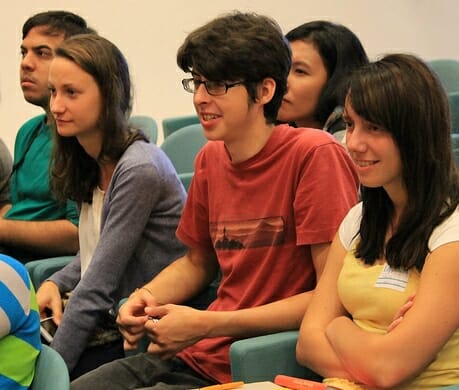
Oct 2, 2015 | Focolare Worldwide, Senza categoria
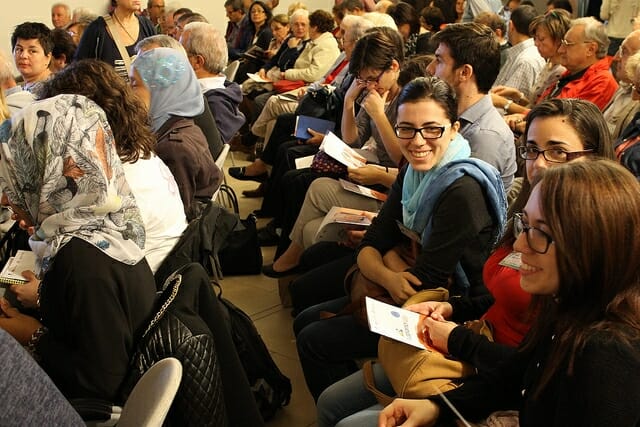 “Hosting the extraordinary in the ordinary things, training one’s perception to see the growth of the tree: without prophets, life would be a place of pessimism and not of hope which unites us.” In brief, this was what the economist, Luigino Bruni, said at the National Congress of the EoC networks during the 6th edition of LoppianoLab, attended by more than 2,000 participants from all over the country, and also others. Economy of Conmunion as a model to start with. “Only by regenerating relationships can we overcome fear and relaunch the economy: today, while mistrust and pessimism are holding back the relaunching of the economy in Europe and the Western world, we dare to look at the economy with the eyes of the African youth. – Bruni began – If we want to contribute to the rebirth of the economy, we have to regenerate the territories, families, relationships and rediscover and practice the civic virtues”. Not by chance, the title chosen was “Beyond fear. The culture of dialogue, active citizenship, civic economy,” for the 2015 edition of LoppianoLab, promoted by the Città Nuova Publishers, the Polo Lionello Bonfanti-Economy of Communion (EoC), Sophia University Institute (SUI) and the Loppiano International Centre (FI). Obviously there was a pressing call to the economic sector that involves about 200 businesses in Italy and 800 throughout the world, to adhere to and focus on man and his relational dimension in all their economic dealings, by practicing an Economy of Communion.
“Hosting the extraordinary in the ordinary things, training one’s perception to see the growth of the tree: without prophets, life would be a place of pessimism and not of hope which unites us.” In brief, this was what the economist, Luigino Bruni, said at the National Congress of the EoC networks during the 6th edition of LoppianoLab, attended by more than 2,000 participants from all over the country, and also others. Economy of Conmunion as a model to start with. “Only by regenerating relationships can we overcome fear and relaunch the economy: today, while mistrust and pessimism are holding back the relaunching of the economy in Europe and the Western world, we dare to look at the economy with the eyes of the African youth. – Bruni began – If we want to contribute to the rebirth of the economy, we have to regenerate the territories, families, relationships and rediscover and practice the civic virtues”. Not by chance, the title chosen was “Beyond fear. The culture of dialogue, active citizenship, civic economy,” for the 2015 edition of LoppianoLab, promoted by the Città Nuova Publishers, the Polo Lionello Bonfanti-Economy of Communion (EoC), Sophia University Institute (SUI) and the Loppiano International Centre (FI). Obviously there was a pressing call to the economic sector that involves about 200 businesses in Italy and 800 throughout the world, to adhere to and focus on man and his relational dimension in all their economic dealings, by practicing an Economy of Communion.  Dreaming of Africa. The workshop often referred to the EoC’s international congress held last May in Nairobi, the vitality of which was discussed by Geneviéve Sanze, an economist from Central Africa. In her continent, as of today, there are about 30 businesses that have joined the project which gave life to a network of support for the youth by the EoC entrepreneurs. People at times think that “Economy is a science of wealth: and believe that you have to go to the big cities to practice it, but with EoC, it has become the science of communion – she affirmed. Exchange of ideas, dialogue, and fraternity: in Nairobi we saw that every person brings a certain wealth within him that is all-inclusiveness and uniqueness, in the same way as the creative entrepreneur tries to enrich his ambience and his territory without catering to standards that are remote and far from the attention of the outskirts in need. And a totally new way of facing the topic of economy at international levels is to start from Africa, but even more so when considering the contribution Africa can give, rather than receive, thus giving trust and new drive to the Africans themselves, to empower their opportunities in their own countries.” Africa is a young continent, as testified to by Gloria and Melchiot, two African students enrolled in the Sophia University Institute in Loppiano: “Allowing the African youth to have their dreams signifies avoiding the phenomenon of immigration: so why don’t we open businesses in Africa, so that they can find jobs there?” Anouk Grevin, Economist (University of Nantes and Sophia University Institute), announced that “Two business projects have started up in Nairobi. The Catholic University Institute of Buea (CUIB) in Cameroon has announced the institution of a Degree in the Economy of Communion, and the start in 2017 of the project incubator, “Siobhan,” to support the birth of new businesses in Africa. The second project dedicated to François Neveux, French pioneer of the EoC, will bring together entrepreneurs from all over the world, and create a network of economic support and project design, addressing especially young entrepreneurs.” Source: Città Nuova
Dreaming of Africa. The workshop often referred to the EoC’s international congress held last May in Nairobi, the vitality of which was discussed by Geneviéve Sanze, an economist from Central Africa. In her continent, as of today, there are about 30 businesses that have joined the project which gave life to a network of support for the youth by the EoC entrepreneurs. People at times think that “Economy is a science of wealth: and believe that you have to go to the big cities to practice it, but with EoC, it has become the science of communion – she affirmed. Exchange of ideas, dialogue, and fraternity: in Nairobi we saw that every person brings a certain wealth within him that is all-inclusiveness and uniqueness, in the same way as the creative entrepreneur tries to enrich his ambience and his territory without catering to standards that are remote and far from the attention of the outskirts in need. And a totally new way of facing the topic of economy at international levels is to start from Africa, but even more so when considering the contribution Africa can give, rather than receive, thus giving trust and new drive to the Africans themselves, to empower their opportunities in their own countries.” Africa is a young continent, as testified to by Gloria and Melchiot, two African students enrolled in the Sophia University Institute in Loppiano: “Allowing the African youth to have their dreams signifies avoiding the phenomenon of immigration: so why don’t we open businesses in Africa, so that they can find jobs there?” Anouk Grevin, Economist (University of Nantes and Sophia University Institute), announced that “Two business projects have started up in Nairobi. The Catholic University Institute of Buea (CUIB) in Cameroon has announced the institution of a Degree in the Economy of Communion, and the start in 2017 of the project incubator, “Siobhan,” to support the birth of new businesses in Africa. The second project dedicated to François Neveux, French pioneer of the EoC, will bring together entrepreneurs from all over the world, and create a network of economic support and project design, addressing especially young entrepreneurs.” Source: Città Nuova
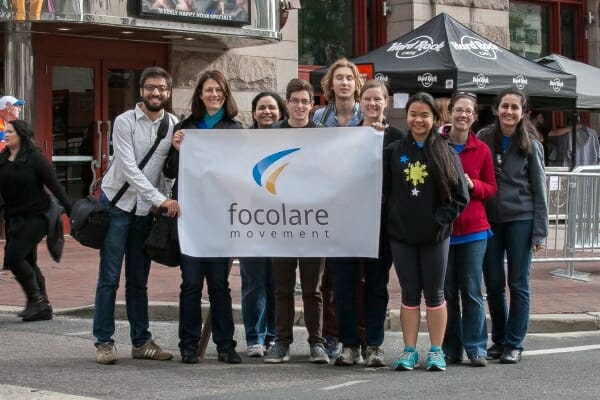
Oct 1, 2015 | Focolare Worldwide
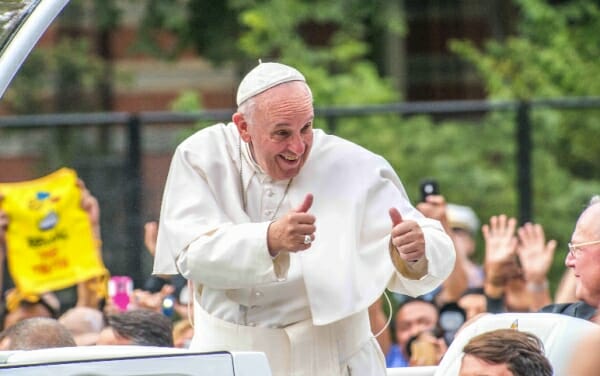
Photo © Renato Araujo

Photo © Andrea Re
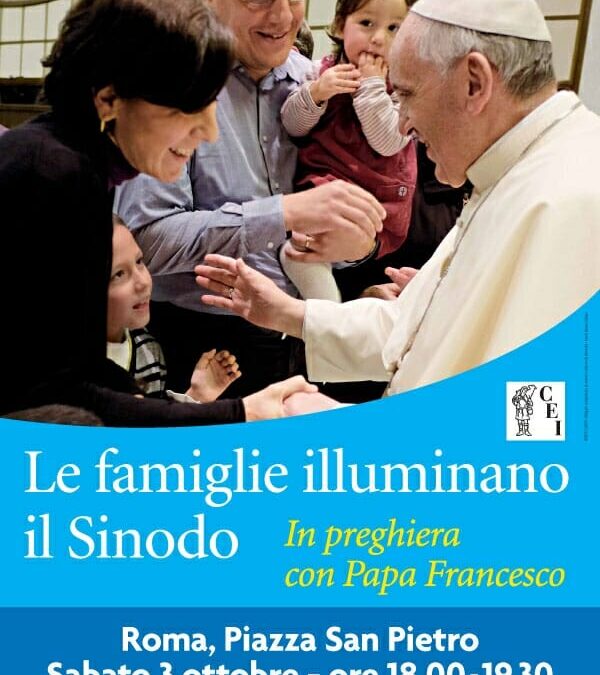
Sep 30, 2015 | Non categorizzato
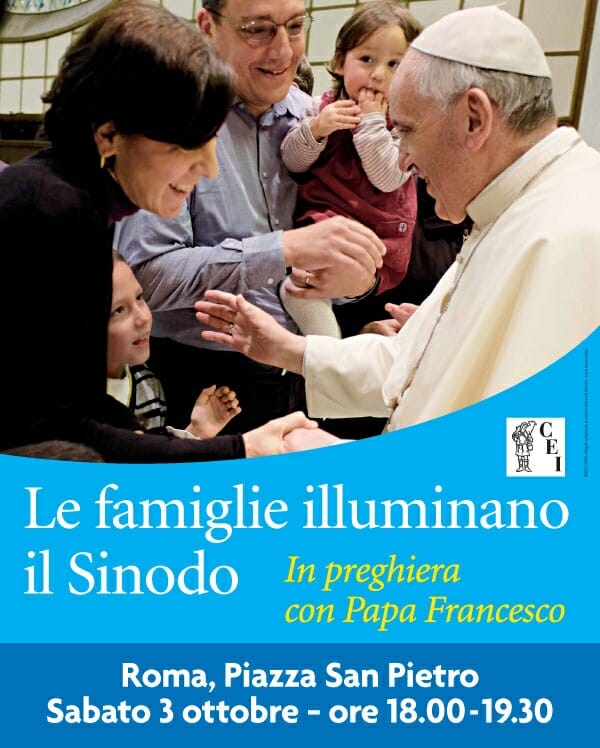
From 5:00 p.m. to 6:00p.m., testimonies by the ecclesial movements, among whom Maria Voce of the Focolare Movement.
This initiative is a people’s response to the Holy Father’s multiple appeals for prayer for the family and for the work of the Synod Fathers. Among the testimonies expected, from 5:00 p.m. to 6:00 p.m., will be those of the representatives of ecclesial movements, among whom Maria Voce, president of the Focolare Movement, Kiko Argüello, initiator of the Neocatechumenal Way, Julián Carrón, president of Communion and Liberation, Salvatore Martinez, president of the Renewal in the Holy Spirit Movement, and Matteo Truffelli, president of the Italian Catholic Action.
Prayer Vigil Booklet General Information
Sep 30, 2015 | Non categorizzato
https://www.change.org/p/sign-up-for-a-global-petition-for-peace-now Confronted with the humanitarian drama of the refugees, the Focolare’s Youth for Unity step into action on many fronts, mobilising and appealing to international organisations, while joining in the efforts of the entire Movement.
- Reduce public funding of weapons
- Work at the root level of inequality, to counter misery
- Revise current models of governance
- Adopt a model of organised legality in opposition to criminality
- Guarantee universal primary education
These are the five main points of the appeal made by the young people of the Focolare’s Youth for a United World (YUW) to national parliaments, the European Parliament, the National Commissions of UNESCO and the United Nations. https://www.youtube.com/watch?v=om7WN06PMiU

Sep 30, 2015 | Non categorizzato

From 5:00 p.m. to 6:00p.m., testimonies by the ecclesial movements, among whom Maria Voce of the Focolare Movement.
This initiative is a people’s response to the Holy Father’s multiple appeals for prayer for the family and for the work of the Synod Fathers. Among the testimonies expected, from 5:00 p.m. to 6:00 p.m., will be those of the representatives of ecclesial movements, among whom Maria Voce, president of the Focolare Movement, Kiko Argüello, initiator of the Neocatechumenal Way, Julián Carrón, president of Communion and Liberation, Salvatore Martinez, president of the Renewal in the Holy Spirit Movement, and Matteo Truffelli, president of the Italian Catholic Action.
Prayer Vigil Booklet General Information
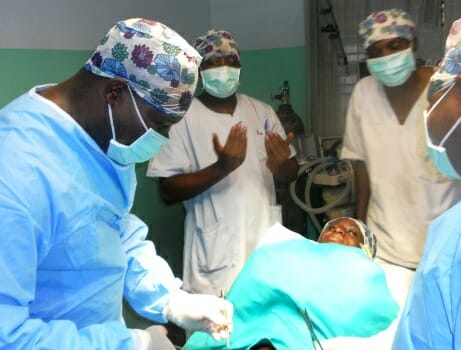
Sep 30, 2015 | Focolare Worldwide
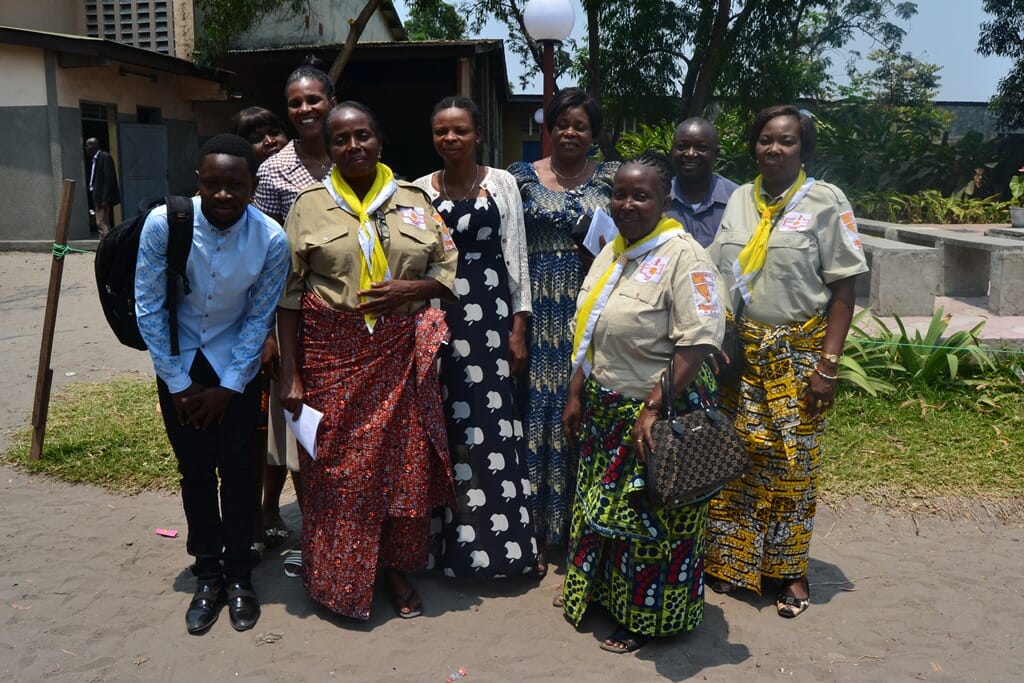 “One day we were closing, when at 4:30 p.m. a mother with a baby about 8 months old arrived for a blood sample withdrawal.” Aline M. is a nurse and a biologist in the university clinic of Kinshasa. In the Congo/DRC, the birth rate is very high, as is the mortality rate and the infant mortality rate. Life expectancy at birth and the average age of the population are both very low. “My colleagues had already closed the registration books and wanted to leave. But the words of the Gospel, which say to love one’s neighbour as oneself, came to my mind: ‘I have to welcome even this mother,’ I thought. I took a blood sample from the little one, and as I was finishing, the mother said to me with a firm voice, ‘God bless you, ma’am!”
“One day we were closing, when at 4:30 p.m. a mother with a baby about 8 months old arrived for a blood sample withdrawal.” Aline M. is a nurse and a biologist in the university clinic of Kinshasa. In the Congo/DRC, the birth rate is very high, as is the mortality rate and the infant mortality rate. Life expectancy at birth and the average age of the population are both very low. “My colleagues had already closed the registration books and wanted to leave. But the words of the Gospel, which say to love one’s neighbour as oneself, came to my mind: ‘I have to welcome even this mother,’ I thought. I took a blood sample from the little one, and as I was finishing, the mother said to me with a firm voice, ‘God bless you, ma’am!” 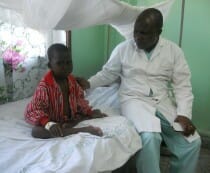 I was just able to convince a colleague from the blood blank to take this last emergency, when another serious problem presented itself. It was already 5:00 p.m. There was a mother in tears, who could not pay for health insurance, with 4-year-old child in her arms, afflicted by severe anemia. My colleague decidedly told me that it was no longer possible to accept anyone. ‘Otherwise I’ll lose my job,’ she exclaimed. I was moved by this suffering. I took a sheet of paper and attested in writing that I was responsible for the cost of the blood transfusion for this child. My colleague then accepted, and immediately gave the child the transfusion, saving his life. The child’s mother said to me: ‘God will return you the money. I am sure of it!’
I was just able to convince a colleague from the blood blank to take this last emergency, when another serious problem presented itself. It was already 5:00 p.m. There was a mother in tears, who could not pay for health insurance, with 4-year-old child in her arms, afflicted by severe anemia. My colleague decidedly told me that it was no longer possible to accept anyone. ‘Otherwise I’ll lose my job,’ she exclaimed. I was moved by this suffering. I took a sheet of paper and attested in writing that I was responsible for the cost of the blood transfusion for this child. My colleague then accepted, and immediately gave the child the transfusion, saving his life. The child’s mother said to me: ‘God will return you the money. I am sure of it!’  Returning home, I asked myself: ‘Why is it that I met two mothers with such suffering children right at closing time?’ I read the Word of Life, a sentence from the Gospel, and I found comfort. The next week, I received an invitation from my health service. From among my colleagues I was chosen for a 3-day professional training course. The financial contribution given to me for my participation was $150 US dollars! There was God’s answer. For having paid $25 US dollars for the blood transfusion, I received two blessings plus this amount which now allows me to also pay the scholastic fees for my children.” A.M. – Kinshasa, Congo/DRC
Returning home, I asked myself: ‘Why is it that I met two mothers with such suffering children right at closing time?’ I read the Word of Life, a sentence from the Gospel, and I found comfort. The next week, I received an invitation from my health service. From among my colleagues I was chosen for a 3-day professional training course. The financial contribution given to me for my participation was $150 US dollars! There was God’s answer. For having paid $25 US dollars for the blood transfusion, I received two blessings plus this amount which now allows me to also pay the scholastic fees for my children.” A.M. – Kinshasa, Congo/DRC
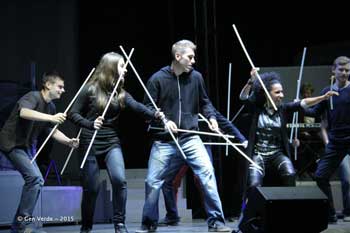
Sep 29, 2015 | Focolare Worldwide
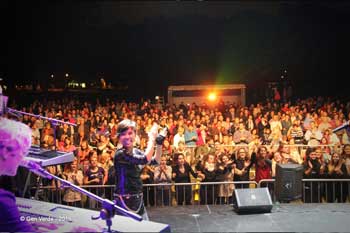 “Start Now!” That is, start here and now, to build authentic relationships and to generate trust. It is an invitation worth its weight in gold, you might say, and it was the title Gen Verde chose for the concert/workshop brought to the stage of the Tágas Tér Festival, on September 25th in Szeged, Hungary. The protagonists in these eight workshops, along with the artists, were 120 teens from two high schools, one of which is a professional institute frequented by many students who have difficult family situations. “Tágas Tér, which literally means, ‘open space,’” explains one of the organizers, “is in fact a big ecumenical meeting which exposes the network of hundreds of activities in the world for civic solidarity. Szeged is 15 km from the Hungarian border with Serbia, and therefore, many people were present at the concert who experience the passage of thousands of immigrants daily, with the sea of questions and sorrow that comes along with it.
“Start Now!” That is, start here and now, to build authentic relationships and to generate trust. It is an invitation worth its weight in gold, you might say, and it was the title Gen Verde chose for the concert/workshop brought to the stage of the Tágas Tér Festival, on September 25th in Szeged, Hungary. The protagonists in these eight workshops, along with the artists, were 120 teens from two high schools, one of which is a professional institute frequented by many students who have difficult family situations. “Tágas Tér, which literally means, ‘open space,’” explains one of the organizers, “is in fact a big ecumenical meeting which exposes the network of hundreds of activities in the world for civic solidarity. Szeged is 15 km from the Hungarian border with Serbia, and therefore, many people were present at the concert who experience the passage of thousands of immigrants daily, with the sea of questions and sorrow that comes along with it. 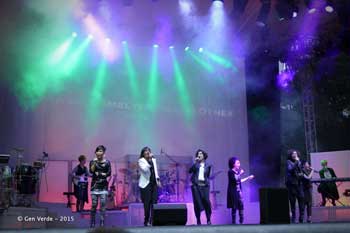 “On the Other Side”: During the concert, many songs were heard from “On the Other Side,” the latest album by Gen Verde, released less than a month ago. But what is “the other side”? is a spontaneous question many ask themselves. “It’s the person I have in front of me, the person who thinks differently than I; the person I don’t admire or even like,” explains Adriana Garcia, the group’s bass player from Mexico. A powerful show, engaging and at the same time capable of questioning positions, opinions and lifestyles as someone has said. Because what emerges from the music and the lyrics is the certainty that the solution to a broken world, divided by walls, comes from understanding the richness inherent in diversity. Among the eleven songs on the album there is the story of the difficult progress of an entire people in the piece “Voz de la Verdad,” about the Salvadorian bishop, Oscar Romero, or the very current and relevant song about the division of the two Koreas, built on K-pop melodies, almost as if to say that even among young Koreans the wound has not yet healed. “They are stories that do not permit us to fall into indifference,” comments one girl, “or to forget our brothers and sisters from whom we are separated by a border. We have felt strongly called even to give our lives for justice.” “Needless to say, the most powerful moment of the concert was the song “Chi piange per te,” (“Who cries for you”) a sweet lullaby dedicated to a baby girl entombed in the waters of the Sicilian Canal, perhaps because of the situation our country is living now with the immigration issue,” confided a friend who works with the media. And a Pastor of the Reformed Church, Gábor Czagány, one of the organizers of the Festival, stated: “What struck me the most were the faces of the young people from the schools that took part in the workshops. There was joy, participation, commitment. You could intuit the weight of the experience they had had: seven days that left their mark. Now it’s up to us to keep all this from getting lost or going to waste.”
“On the Other Side”: During the concert, many songs were heard from “On the Other Side,” the latest album by Gen Verde, released less than a month ago. But what is “the other side”? is a spontaneous question many ask themselves. “It’s the person I have in front of me, the person who thinks differently than I; the person I don’t admire or even like,” explains Adriana Garcia, the group’s bass player from Mexico. A powerful show, engaging and at the same time capable of questioning positions, opinions and lifestyles as someone has said. Because what emerges from the music and the lyrics is the certainty that the solution to a broken world, divided by walls, comes from understanding the richness inherent in diversity. Among the eleven songs on the album there is the story of the difficult progress of an entire people in the piece “Voz de la Verdad,” about the Salvadorian bishop, Oscar Romero, or the very current and relevant song about the division of the two Koreas, built on K-pop melodies, almost as if to say that even among young Koreans the wound has not yet healed. “They are stories that do not permit us to fall into indifference,” comments one girl, “or to forget our brothers and sisters from whom we are separated by a border. We have felt strongly called even to give our lives for justice.” “Needless to say, the most powerful moment of the concert was the song “Chi piange per te,” (“Who cries for you”) a sweet lullaby dedicated to a baby girl entombed in the waters of the Sicilian Canal, perhaps because of the situation our country is living now with the immigration issue,” confided a friend who works with the media. And a Pastor of the Reformed Church, Gábor Czagány, one of the organizers of the Festival, stated: “What struck me the most were the faces of the young people from the schools that took part in the workshops. There was joy, participation, commitment. You could intuit the weight of the experience they had had: seven days that left their mark. Now it’s up to us to keep all this from getting lost or going to waste.”  Young people offer hope for unity—Alessandra Pasquale, actress and singer in Gen Verde, is eager to clarify: “Our job is not to go on stage, sing, show off and then depart: we cannot exclude the building of authentic relationships with people, or exclude feeling what the people who come to our concerts experience, in what waters the teens with whom we do the workshops navigate.” It is for this reason that the video-interviews of the young participants of the workshops are projected before the beginning of the concert at Szeged, and were an integral part of the show, because these young people had in fact helped build it. Here are a few words from the teens: “The project, ‘Start Now!’ opened my eyes: it taught me not to judge foreigners. And this takes work: it takes tenacity and trust.” “I learned how we should pay attention to one another.” “I understood the importance of keeping a community together and that to be a family, humanity needs the collaboration of each one of us.” “I am very happy that my school participated in the project, “Start Now!” with the other school. In the beginning we didn’t know each other; it took time, but then we earned each other’s trust and now I can say that we move as a single person, we are absolutely happy.”
Young people offer hope for unity—Alessandra Pasquale, actress and singer in Gen Verde, is eager to clarify: “Our job is not to go on stage, sing, show off and then depart: we cannot exclude the building of authentic relationships with people, or exclude feeling what the people who come to our concerts experience, in what waters the teens with whom we do the workshops navigate.” It is for this reason that the video-interviews of the young participants of the workshops are projected before the beginning of the concert at Szeged, and were an integral part of the show, because these young people had in fact helped build it. Here are a few words from the teens: “The project, ‘Start Now!’ opened my eyes: it taught me not to judge foreigners. And this takes work: it takes tenacity and trust.” “I learned how we should pay attention to one another.” “I understood the importance of keeping a community together and that to be a family, humanity needs the collaboration of each one of us.” “I am very happy that my school participated in the project, “Start Now!” with the other school. In the beginning we didn’t know each other; it took time, but then we earned each other’s trust and now I can say that we move as a single person, we are absolutely happy.”
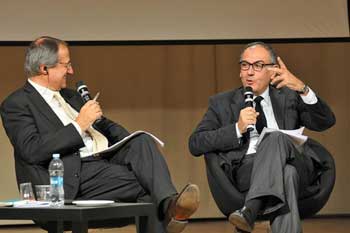
Sep 28, 2015 | Focolare Worldwide
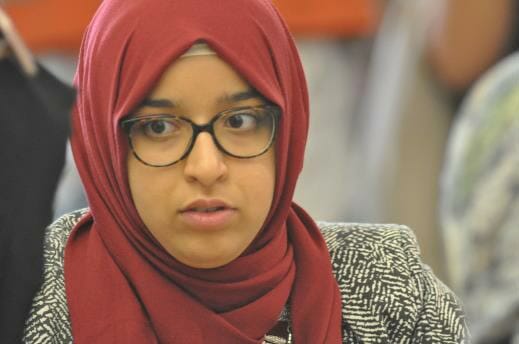 Ideas such as involvement as the method; the ability to dialogue respecting not only the differing ideas and convictions of others, but also their sufferings; biodiversity that values cultural riches; seeking greater justice; transforming indignation into collective action for changing the world – these were the main values behind the ten projects and initiatives that brought out the vitality of Italian society today. It concluded with a variety of voices, projects and events that started from the bottom of Italian society, including the sixth edition of LoppianoLab. More than 2,000 attendees emphasised the importance of sharing and dialogue amongst business leaders, politicians, educators, citizens, young people, communicators and local administrators – civil society in its diversity of expressions.
Ideas such as involvement as the method; the ability to dialogue respecting not only the differing ideas and convictions of others, but also their sufferings; biodiversity that values cultural riches; seeking greater justice; transforming indignation into collective action for changing the world – these were the main values behind the ten projects and initiatives that brought out the vitality of Italian society today. It concluded with a variety of voices, projects and events that started from the bottom of Italian society, including the sixth edition of LoppianoLab. More than 2,000 attendees emphasised the importance of sharing and dialogue amongst business leaders, politicians, educators, citizens, young people, communicators and local administrators – civil society in its diversity of expressions.
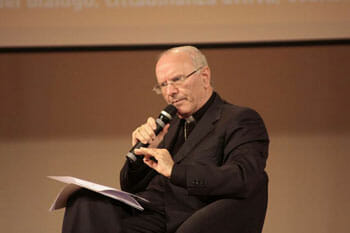
Msgr. Nunzio Galantino, Secretary General of the Italian Bishops Conference
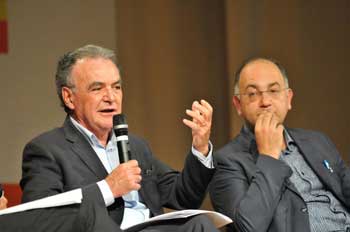
Luigi Bobba, Under Secretary of the Ministry of Social Politics and Work – Luigino Bruni, Economist

Vincenzo Morgante, Director of the TGR RAI – Michele Zanzucchi, Director Città Nuova

Sep 28, 2015 | Non categorizzato
 “Real kindness is an exchange with essentially unpredictable consequences. It is a risk precisely because it mingles our needs and desires with the needs and desires of others...” A. Phillips e B. Taylor, On Kindness “Businesses and organizations are good places for a good and fulfilling life if and until they let non-economic virtues live alongside with the economic-business ones. It is a decisive co-existence that is not easy at all, because it requires managers to give up total control over the behaviour of people, to accept an element of unpredictability in their actions and to be willing to relativize efficiency, which is becoming the real dogma of the new religion of our time. Generosity is one of these non-economic virtues that, however, are also essential to every business and institution. The root of generosity lies in the Latin word genus, generis, a term that refers to race, family, birth – this is also the first meaning of the word gender. This ancient etymology – that is lost now – tells us important things about generosity. First of all it reminds us that our generosity has much to do with the transmission of life: with our family, with the people around us, with the environment in which we grow up and where we learn how to live. We receive it as an inheritance when we come into the world. It is a gift that our parents and relatives pass on to us. Generosity is formed inside the family home. The generosity we find in ourselves is very dependent on that of our parents, how and how much love there had been amongst them before we were born, the life choices they made and the ones they make when we start looking at them. It all depends on their faithfulness, their hospitality, their attitude to the poor, their willingness to “waste” time to listen to and help their friends, the love and respect they show towards their parents. This primary generosity is not a personal virtue, but a gift that becomes part of the moral and spiritual standard of what is called character. It is a capital with which we come to the world, which was formed before our birth and is nourished by the quality of relationships in the earliest years of our life. It also depends on the generosity of our grandparents, great-grandparents, neighbours, and that of many others who may not be contributing to our DNA but are still present, in mysterious but very real ways, in our own generosity (and non-generosity). My generosity is influenced by the poets who have nourished the heart of our family. By the prayers of my people, the musicians I love and listen to, by the storytellers in village festivals, by the speeches and actions of politicians, by the sermons of preachers. By the martyrs of resistance, who gave their life yesterday for my freedom today. By the generosity of countless women of the past centuries (there is a great affinity between women and generosity), that many times placed the flourishing of the family they gave birth to before their own – and still continue to do so. Generosity generates gratitude towards those who have made us generous by their own generosity. Living with generous people makes us more generous – and the same is true for prayer, music, beauty…. The cultivation of generosity produces many more effects than the ones we can see and measure – and the same goes for our non-generosity and that of others. The stock of generosity of a family, a community or a people is something like the sum total of the generosity of each and every member of it. Every generation increases or reduces the value of this stock, and the latter is happening today in Europe where our generation, impoverished in ideals and great passions, is squandering the wealth of generosity it has inherited. A state that leaves half of its young people without work is not a generous state”. (Read more) by Luigino Bruni published in Avvenire ( (Italian newspaper) on 23/08/2015
“Real kindness is an exchange with essentially unpredictable consequences. It is a risk precisely because it mingles our needs and desires with the needs and desires of others...” A. Phillips e B. Taylor, On Kindness “Businesses and organizations are good places for a good and fulfilling life if and until they let non-economic virtues live alongside with the economic-business ones. It is a decisive co-existence that is not easy at all, because it requires managers to give up total control over the behaviour of people, to accept an element of unpredictability in their actions and to be willing to relativize efficiency, which is becoming the real dogma of the new religion of our time. Generosity is one of these non-economic virtues that, however, are also essential to every business and institution. The root of generosity lies in the Latin word genus, generis, a term that refers to race, family, birth – this is also the first meaning of the word gender. This ancient etymology – that is lost now – tells us important things about generosity. First of all it reminds us that our generosity has much to do with the transmission of life: with our family, with the people around us, with the environment in which we grow up and where we learn how to live. We receive it as an inheritance when we come into the world. It is a gift that our parents and relatives pass on to us. Generosity is formed inside the family home. The generosity we find in ourselves is very dependent on that of our parents, how and how much love there had been amongst them before we were born, the life choices they made and the ones they make when we start looking at them. It all depends on their faithfulness, their hospitality, their attitude to the poor, their willingness to “waste” time to listen to and help their friends, the love and respect they show towards their parents. This primary generosity is not a personal virtue, but a gift that becomes part of the moral and spiritual standard of what is called character. It is a capital with which we come to the world, which was formed before our birth and is nourished by the quality of relationships in the earliest years of our life. It also depends on the generosity of our grandparents, great-grandparents, neighbours, and that of many others who may not be contributing to our DNA but are still present, in mysterious but very real ways, in our own generosity (and non-generosity). My generosity is influenced by the poets who have nourished the heart of our family. By the prayers of my people, the musicians I love and listen to, by the storytellers in village festivals, by the speeches and actions of politicians, by the sermons of preachers. By the martyrs of resistance, who gave their life yesterday for my freedom today. By the generosity of countless women of the past centuries (there is a great affinity between women and generosity), that many times placed the flourishing of the family they gave birth to before their own – and still continue to do so. Generosity generates gratitude towards those who have made us generous by their own generosity. Living with generous people makes us more generous – and the same is true for prayer, music, beauty…. The cultivation of generosity produces many more effects than the ones we can see and measure – and the same goes for our non-generosity and that of others. The stock of generosity of a family, a community or a people is something like the sum total of the generosity of each and every member of it. Every generation increases or reduces the value of this stock, and the latter is happening today in Europe where our generation, impoverished in ideals and great passions, is squandering the wealth of generosity it has inherited. A state that leaves half of its young people without work is not a generous state”. (Read more) by Luigino Bruni published in Avvenire ( (Italian newspaper) on 23/08/2015
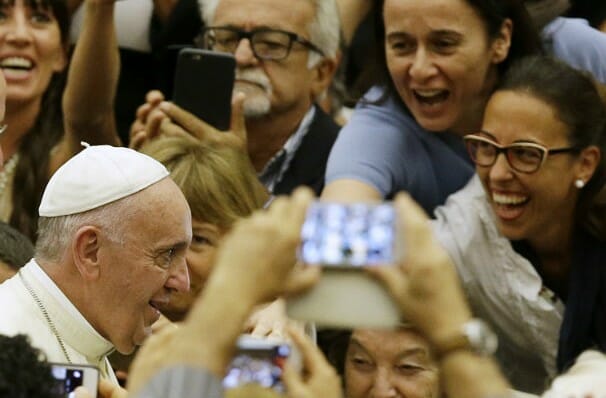
Sep 26, 2015 | Non categorizzato
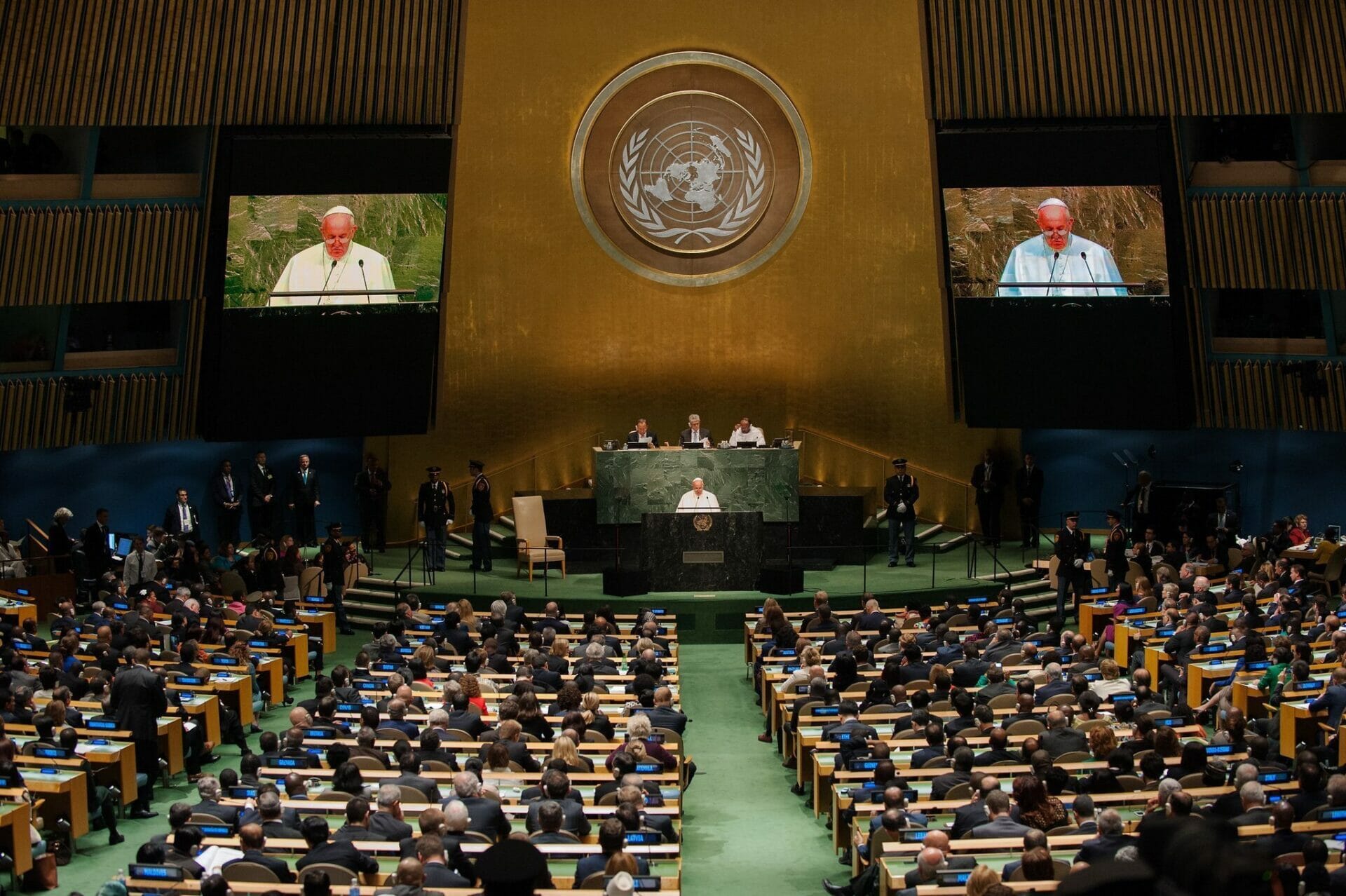 “Welcome, Holy Father” posters appeared all around the city already on Thursday. The taxi driver watching the Pope on TV was not indifferent: “So, you’re going to see the Pope tomorrow? Congratulations!” “Everyone finds the Pope appealing because he is authentic,” a non-Catholic man on the train said. He’s right: Francis does not need to attract attention or make himself appealing to all. And so he gave us a lesson before the UN’s General Assembly: on sustainable development, climate change and the issue of refugees: “We must not be appalled by the numbers… we have to look at their faces and listen to their stories,” he said in Washington. And at the UN: “Every man must be able to have concrete access to indispensible material and spiritual goods: a home, a dignified and well paid job, enough food, drinking water and religious freedom. ” He again strongly criticised drug trafficking, sexual exploitation of people, the arms rackets. In the same way as he had clearly denounced before the US Congress, he made another appeal to put aside divisions and antagonisms between political parties and to help the poor. The sacredness of each human being is a theme he strongly feels, and at the end of his speech, there were unending rounds of applause. He then left and greeted the people from his Fiat car which seemed so tiny amid the huge limousines.
“Welcome, Holy Father” posters appeared all around the city already on Thursday. The taxi driver watching the Pope on TV was not indifferent: “So, you’re going to see the Pope tomorrow? Congratulations!” “Everyone finds the Pope appealing because he is authentic,” a non-Catholic man on the train said. He’s right: Francis does not need to attract attention or make himself appealing to all. And so he gave us a lesson before the UN’s General Assembly: on sustainable development, climate change and the issue of refugees: “We must not be appalled by the numbers… we have to look at their faces and listen to their stories,” he said in Washington. And at the UN: “Every man must be able to have concrete access to indispensible material and spiritual goods: a home, a dignified and well paid job, enough food, drinking water and religious freedom. ” He again strongly criticised drug trafficking, sexual exploitation of people, the arms rackets. In the same way as he had clearly denounced before the US Congress, he made another appeal to put aside divisions and antagonisms between political parties and to help the poor. The sacredness of each human being is a theme he strongly feels, and at the end of his speech, there were unending rounds of applause. He then left and greeted the people from his Fiat car which seemed so tiny amid the huge limousines. 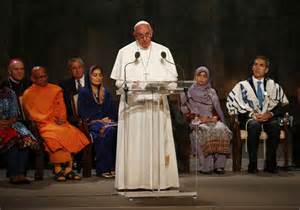 At Ground Zero, 500 representatives of various religions were all waiting to pray together for peace. Sue Kopp, a focolarina of New York who was able to participate in the rite, affirmed: “It was so meaningful also due to the diversity of this country. This place, which seemed so sacred to me, and marked by such immense suffering, has been transformed into a place of hope. The dream of a civilisation of love, is becoming a reality.”. Joe Klock, of New Humanity (an International NGO accredited at the UN) said; “The Pope underlined the importance of building unity in diversity, where peace and love reign among the nations and the hearts of all. This reality demonstrates that the world needs the spirituality of unity, which seems to be precisely tailored to this country!” Also in New York, the Pope visited some charitable organisations, among which a model school in Harlem. And then, in Central Park. The 80,000 lucky people were able to get entrance tickets, waited for hours, even to get just a glimpse of him. The Mass was celebrated at Madison Square Garden, where the seats are usually occupied by basketball stars and pop singers. The people waited for hours to enter but no one complained. Then the big surprise: Pope Francis arrived 20 minutes earlier than planned!
At Ground Zero, 500 representatives of various religions were all waiting to pray together for peace. Sue Kopp, a focolarina of New York who was able to participate in the rite, affirmed: “It was so meaningful also due to the diversity of this country. This place, which seemed so sacred to me, and marked by such immense suffering, has been transformed into a place of hope. The dream of a civilisation of love, is becoming a reality.”. Joe Klock, of New Humanity (an International NGO accredited at the UN) said; “The Pope underlined the importance of building unity in diversity, where peace and love reign among the nations and the hearts of all. This reality demonstrates that the world needs the spirituality of unity, which seems to be precisely tailored to this country!” Also in New York, the Pope visited some charitable organisations, among which a model school in Harlem. And then, in Central Park. The 80,000 lucky people were able to get entrance tickets, waited for hours, even to get just a glimpse of him. The Mass was celebrated at Madison Square Garden, where the seats are usually occupied by basketball stars and pop singers. The people waited for hours to enter but no one complained. Then the big surprise: Pope Francis arrived 20 minutes earlier than planned!  The altar, the chair and the pulpit were simply handcrafted . Cardinal Timothy Dolan had the impression that the Pope would have appreciated this more than if the items were made by a designer. And here, Francis became the pastor of the immense city, recalling the reading from the book of Isaiah 9.1: “The people walking in the darkness saw a great light.”. He spoke about the difficulties of the multicultural cities where the light is absent due to so much smog. “But Jesus walks down our streets today,” he said and continued to invite all to go out towards the others, with the heart of a “merciful father waiting for his children to come home.” The church is alive in the cities, the Pope stressed, and so Christians have to bear witness to the light of the Good News. The applause went on and on. As in all the other countries, also in the USA the Pope has touched the heart of each one of us.
The altar, the chair and the pulpit were simply handcrafted . Cardinal Timothy Dolan had the impression that the Pope would have appreciated this more than if the items were made by a designer. And here, Francis became the pastor of the immense city, recalling the reading from the book of Isaiah 9.1: “The people walking in the darkness saw a great light.”. He spoke about the difficulties of the multicultural cities where the light is absent due to so much smog. “But Jesus walks down our streets today,” he said and continued to invite all to go out towards the others, with the heart of a “merciful father waiting for his children to come home.” The church is alive in the cities, the Pope stressed, and so Christians have to bear witness to the light of the Good News. The applause went on and on. As in all the other countries, also in the USA the Pope has touched the heart of each one of us.
![At the conclusion of the Synod on the Family]()
Sep 26, 2015 | Non categorizzato, Word of
 Listen to the Word of Life
Listen to the Word of Life
We can be like the first Christians and replicate their dramatic effect on society around them, if we live like them. For this we must focus on the Gospel’s core message and love one another in the power and the style of Jesus. Here we have the badge, the mark, the typical brand of Christians. Or at least it ought to be, because Jesus saw his community in this way. A fascinating text from Christianity’s early centuries, the Letter to Diognetus, recognizes that ‘Christians cannot be distinguished from the rest of the human race by country or language or customs. They do not live in cities of their own; they do not use a peculiar form of speech; they do not follow an eccentric manner of life.’ They are ordinary people, just the same as others. And yet they have a secret and it allows them to influence society profoundly, becoming as it were its ‘soul’ (see chs 5-6). It is a secret that Jesus passed on to his disciples shortly before dying. Like the ancient sages of Israel, like a father for his child, so too he, the Master of Wisdom, left as his legacy the art of knowing how to live and to live well. He had taken it directly from the Father: ‘I have made known to you everything that I have heard from my Father’ Jn 15:15), and it was the fruit of the relationship between them. It consisted in loving one another. This is his Last Will and Testament, the life of heaven that he brought to earth, which he shares with us so that it can become our very own life. He wants this to be the identity of his disciples, who should be recognizable as his followers by their mutual love: ‘By this everyone will know that you are my disciples, if you have love for one another.’ Are Jesus’s disciples recognized by their mutual love? ‘The history of the Church is a history of holiness’ wrote John Paul II. Nonetheless ‘history also records events which constitute a counter-testimony to Christianity’ (Incarnationis Mysterium, 11). For centuries, in the name of Jesus, Christians have fought endless wars with one another and their divisions continue. There are people who still today associate Christians with the Crusades, with the Inquisition, or who see them as the defenders to the bitter end of an outdated morality, and as opposing the progress of science. It was not like that for the new-born community of the first Christians in Jerusalem. People admired the communion of goods they practised, the unity that reigned among them, the ‘glad and generous hearts’ that characterized them (see Acts 2:46). In the Acts of the Apostles we read that ‘the people held them in high esteem’ so that more and more ‘believers were added to the Lord, great numbers of both men and women’ (Acts 5:13-14). The living witness of the community had a powerful attraction. Why today are we not known as people who stand out because of their love? What have we done with the commandment of Jesus? ‘By this everyone will know that you are my disciples, if you have love for one another.’ Traditionally, in Roman Catholic circles, the month of October is dedicated to mission, to reflecting upon the command of Jesus to go into all the world and proclaim the Gospel, to pray for and support those who are in the frontline. This Word of Life could be a help for all to put into focus the fundamental dimension of every Christian proclamation. It is not about imposing faith on others, nor proselytism, nor a self-serving handout of aid to the poor so that they will be converted. Neither is it primarily a matter of the challenge to defend moral values or a firm stand against injustice and war, even though such stances are a duty the Christian cannot evade. Before all else the Christian proclamation is a witness of life that every disciple of Jesus must offer personally. People in the modern world ‘listen more willingly to witnesses than to teachers’ (Evangelii Nuntiandi, 41). Even persons hostile to the Church are often touched by the example of those who dedicate their lives to the sick and the poor and who are ready to leave their homelands, going far away to the toughest places and offering help and solidarity to those in most need. But above all the witness Jesus requires is that of a whole community which demonstrates the truth of the Gospel. It must show that the life he brought really can generate a new society, where we live genuinely as brothers and sisters, helping and serving one another, collectively attentive to the most fragile and needy. The life of the Church has seen these kinds of witness, such as the settlements for indigenous peoples built by Franciscans and Jesuits in South America, or monasteries with the townships that grew up around them. Today too ecclesial Movements and communities give life to little towns of witness where it is possible to see signs of a new society, the fruit of Gospel life, of mutual love. ‘By this everyone will know that you are my disciples, if you have love for one another.’ Without abandoning our homes and the persons we know, if among us we live that unity which Jesus gave his life for, we can create an alternative way of living and sow seeds of hope and new life around us. A family that every day renews their will to live mutual love in a practical way can become a ray of light in the mutual indifference of a housing block or a district. An ‘environmental cell’, in other words two or more persons who agree to put into practice the demands of the Gospel with total commitment – in the field of their work, at school, in local government offices, in administrative buildings, in a prison – will cut through the logic of the struggle for power and create a collaborative atmosphere that favours the birth of true fraternity, a fraternity previously unhoped-for. Did not the first Christians behave like this at the time of the Roman Empire? Is not this the way they spread the transformative new life of Christianity? In our own day it is we who are the ‘first Christians’, called, as they were, to forgive one another, to see each other as always new, to help one another – in a word, to love one another with the intensity that Jesus loved us, in the certainty that his presence in our midst has the strength to draw others too into the divine logic of love. Fabio Ciardi

Sep 26, 2015 | Non categorizzato
 A missing son “My son, in the critical age of adolescence, and probably due to bad company, disappeared without giving any news of himself. In the evening I would go and look for him among the vagabonds. My desperation created misunderstandings with my husband, and I was running the risk of neglecting not only him but also my two other sons. One day, I recounted that during my search around town, I had met many young people who were alone, and who had been reduced to living on the streets due to drug addiction. My other sons offered to come with me to take food and clothing. Since then, life in the family has changed. That tragedy was really an eye opener.” (M. J. – Switzerland) The hospital “The critically ill patient next to my bed confided to me that he was an agnostic and that he hoped to die soon. I listened to him lengthily and then I felt I had to say to him: ‘I think that our task as human beings is to value life at every stage, whether we are healthy (employed or with other commitments), or sick (with our therapies, pains, in our relationships with the nurses, relatives and the other patients). Death, however, may come, but we shall be what we have done in life and valuing the life we have received.’ The other patient seems to be serene now. In the evening, he who was always brooding even welcomed his daughter with a smile. I think he will sleep better tonight.” (D.B. – Trent, Italy) Prison visit “Rosa had to go the next day to teach in a military jail that was out of the way and did not have a car. I offered to accompany her, and moved some of my various commitments. The next day, on the way I tried to reassure my friend: I would make use of my time waiting outside the jail to say a prayer for her. So I did, while she was inside. After a few hours, I saw her come out all smiles due to the relationship she had established with the new students; she had felt my support through prayers. Now she goes to the jail on her own, but still treasures the experience we lived together.” (C. D. – Campania, Italy) The soldier of the Presidential guards “Corneille is a student at Kinshasha University. Last week he was there, in front of the faculty together with his friends, when a soldier of the Presidential guards approached them and begged for help for his child who was seriously ill. The students looked at one another, their hands in their pockets. Also Corneille put his hands in his pocket, and fumbled with: in the left pocket, the leaflet with the Word of Life, and in the right, some coins. After a moment’s hesitation, he offered the money to the soldier. When they were alone again, his friends said: ‘You must be mad, giving your money to him, above all!’ So Corneille gave them the Word of Life. They read it and one of them said: ‘You are really a coherent person. I like that.’ ((C. – Democratic Republic of Congo )
A missing son “My son, in the critical age of adolescence, and probably due to bad company, disappeared without giving any news of himself. In the evening I would go and look for him among the vagabonds. My desperation created misunderstandings with my husband, and I was running the risk of neglecting not only him but also my two other sons. One day, I recounted that during my search around town, I had met many young people who were alone, and who had been reduced to living on the streets due to drug addiction. My other sons offered to come with me to take food and clothing. Since then, life in the family has changed. That tragedy was really an eye opener.” (M. J. – Switzerland) The hospital “The critically ill patient next to my bed confided to me that he was an agnostic and that he hoped to die soon. I listened to him lengthily and then I felt I had to say to him: ‘I think that our task as human beings is to value life at every stage, whether we are healthy (employed or with other commitments), or sick (with our therapies, pains, in our relationships with the nurses, relatives and the other patients). Death, however, may come, but we shall be what we have done in life and valuing the life we have received.’ The other patient seems to be serene now. In the evening, he who was always brooding even welcomed his daughter with a smile. I think he will sleep better tonight.” (D.B. – Trent, Italy) Prison visit “Rosa had to go the next day to teach in a military jail that was out of the way and did not have a car. I offered to accompany her, and moved some of my various commitments. The next day, on the way I tried to reassure my friend: I would make use of my time waiting outside the jail to say a prayer for her. So I did, while she was inside. After a few hours, I saw her come out all smiles due to the relationship she had established with the new students; she had felt my support through prayers. Now she goes to the jail on her own, but still treasures the experience we lived together.” (C. D. – Campania, Italy) The soldier of the Presidential guards “Corneille is a student at Kinshasha University. Last week he was there, in front of the faculty together with his friends, when a soldier of the Presidential guards approached them and begged for help for his child who was seriously ill. The students looked at one another, their hands in their pockets. Also Corneille put his hands in his pocket, and fumbled with: in the left pocket, the leaflet with the Word of Life, and in the right, some coins. After a moment’s hesitation, he offered the money to the soldier. When they were alone again, his friends said: ‘You must be mad, giving your money to him, above all!’ So Corneille gave them the Word of Life. They read it and one of them said: ‘You are really a coherent person. I like that.’ ((C. – Democratic Republic of Congo )

 It was a living experience of the Church that was very important for them, a unique experience in their life that they will always carry in their hearts. That is how the family from Colombia described their experience – María Angélica, a dentist, and Luis, Director of the Ethics Department at the University of Gran Colombia, and their two sons of 18 and 20 years. From October 4th to the 25th, they attended the Ordinary Synod on the Family “The vocation and mission of the family in the Church and the contemporary world.” They have been working for families for over 20 years in connection with the Focolare Movement, accompanying couples in the process of preparing for marriage, and for the years that follow when the inevitable crises threaten to deteriorate the sacrament and the love. You had an active role in the work of the small groups. Which moments seemed important to you in making a contribution to the Synod? The experience in the small groups was quite beautiful, because we were able to offer our own experience and that of other families, presenting what we wish to live as a family: the dynamic of love that is lived in the Trinity – in which each of the Three Divine Persons is Love for the other. This is one thing we were able to contribute. Also: emphasising the importance of the Eucharist; we highlighted the need for the presence of Jesus amongst families through mutual love; and so we shared with them about the times we have asked forgiveness of one another when there was not full unity. Another contribution was the point about divorced and remarried couples. It is important to feel a particular love for these families. And that according to the measure in which the experience of faith in them begins to grow – accompanying them to the point that they feel that Jesus is also in their neighbour, in the Word of the Gospel that is meant to be lived, in the community that lives in mutual love – their nearness to Jesus grows. We felt that one important point to be presented to the Synod fathers was Jesus crucified and forsaken, since He took upon Himself the sufferings of humanity. In Him we see the one who was betrayed, humiliated, feeling alone, abandoned, culpable, left without an answer to His question. We are all joined in Him because He lived through all that, and in Him we can have this unique communion wherein all are contained in this yes to Him. This was our proposal: that there is no difference between the family that has not suffered failure and the one that has, because we have all feel accepted by Him. We described the experience of many families, also in the Movement, in which they had said this yes with the pain of not being able to receive the Eucharist, but still knowing that they were called to holiness. Therefore, they are not excluded from the invitation to holiness. As Pope Benedict once remarked: they highlight the beauty of the indissolubility of marriage; they are also builders of this indissolubility, so they make a huge contribution as they grow in this yes.
It was a living experience of the Church that was very important for them, a unique experience in their life that they will always carry in their hearts. That is how the family from Colombia described their experience – María Angélica, a dentist, and Luis, Director of the Ethics Department at the University of Gran Colombia, and their two sons of 18 and 20 years. From October 4th to the 25th, they attended the Ordinary Synod on the Family “The vocation and mission of the family in the Church and the contemporary world.” They have been working for families for over 20 years in connection with the Focolare Movement, accompanying couples in the process of preparing for marriage, and for the years that follow when the inevitable crises threaten to deteriorate the sacrament and the love. You had an active role in the work of the small groups. Which moments seemed important to you in making a contribution to the Synod? The experience in the small groups was quite beautiful, because we were able to offer our own experience and that of other families, presenting what we wish to live as a family: the dynamic of love that is lived in the Trinity – in which each of the Three Divine Persons is Love for the other. This is one thing we were able to contribute. Also: emphasising the importance of the Eucharist; we highlighted the need for the presence of Jesus amongst families through mutual love; and so we shared with them about the times we have asked forgiveness of one another when there was not full unity. Another contribution was the point about divorced and remarried couples. It is important to feel a particular love for these families. And that according to the measure in which the experience of faith in them begins to grow – accompanying them to the point that they feel that Jesus is also in their neighbour, in the Word of the Gospel that is meant to be lived, in the community that lives in mutual love – their nearness to Jesus grows. We felt that one important point to be presented to the Synod fathers was Jesus crucified and forsaken, since He took upon Himself the sufferings of humanity. In Him we see the one who was betrayed, humiliated, feeling alone, abandoned, culpable, left without an answer to His question. We are all joined in Him because He lived through all that, and in Him we can have this unique communion wherein all are contained in this yes to Him. This was our proposal: that there is no difference between the family that has not suffered failure and the one that has, because we have all feel accepted by Him. We described the experience of many families, also in the Movement, in which they had said this yes with the pain of not being able to receive the Eucharist, but still knowing that they were called to holiness. Therefore, they are not excluded from the invitation to holiness. As Pope Benedict once remarked: they highlight the beauty of the indissolubility of marriage; they are also builders of this indissolubility, so they make a huge contribution as they grow in this yes.  At times, it’s a matter of understanding the deep meaning of the sacrament. For many people of our day the sacrament of matrimony doesn’t say much, also because the couple has not been provided with an adequate formation, neither by parish nor ecclesial movement; whereas, it is a part of the journey of every human being to understand how to be human and to discover the transcendent dimension within oneself. It needs to be discovered how this sacrament can help in forming a family and why, through the family, we are responsible for children.” One day, coming out of the small group session, you felt the wish that the bishops would comprehend your deep love for the Church. . . “The relationship and the dialogue with the bishops has been drawing us closer and closer over the past few weeks, closer in knowing one another, listening to one another, also in trying to be ‘mothers’ towards them. For example, if they had a cough, a cold . . . we wished that they would be able to feel that we families also love the Church as they do; that we suffer for the Church as they do; that we also give our life for the Church. We’re on the same journey. As Chiara Lubich once told us: each one of us is like a piece of a mosaic, so our value lies in helping to create the beautiful reality that is the Church. It was very important that this was said – and heard.” One of your own offerings was included in the final document. “Yes, in the final small group meeting the relator asked if we would describe our experience as a family. Then, what was proposed for the final document also contained what each one of us had said. You can’t even tell, really, what was proposed by a family and what was proposed by a Synod father: it was everyone’s proposal, unanimously agreed upon.” What would your wish be for the conclusion of the Synod? “Many best wishes! The hope that, little by little, all families will discover the richness contained in them, no matter what their situation – ‘regular’ or ‘irregular’ – if they live as a real family, to make society better: for the growth of humanity.”
At times, it’s a matter of understanding the deep meaning of the sacrament. For many people of our day the sacrament of matrimony doesn’t say much, also because the couple has not been provided with an adequate formation, neither by parish nor ecclesial movement; whereas, it is a part of the journey of every human being to understand how to be human and to discover the transcendent dimension within oneself. It needs to be discovered how this sacrament can help in forming a family and why, through the family, we are responsible for children.” One day, coming out of the small group session, you felt the wish that the bishops would comprehend your deep love for the Church. . . “The relationship and the dialogue with the bishops has been drawing us closer and closer over the past few weeks, closer in knowing one another, listening to one another, also in trying to be ‘mothers’ towards them. For example, if they had a cough, a cold . . . we wished that they would be able to feel that we families also love the Church as they do; that we suffer for the Church as they do; that we also give our life for the Church. We’re on the same journey. As Chiara Lubich once told us: each one of us is like a piece of a mosaic, so our value lies in helping to create the beautiful reality that is the Church. It was very important that this was said – and heard.” One of your own offerings was included in the final document. “Yes, in the final small group meeting the relator asked if we would describe our experience as a family. Then, what was proposed for the final document also contained what each one of us had said. You can’t even tell, really, what was proposed by a family and what was proposed by a Synod father: it was everyone’s proposal, unanimously agreed upon.” What would your wish be for the conclusion of the Synod? “Many best wishes! The hope that, little by little, all families will discover the richness contained in them, no matter what their situation – ‘regular’ or ‘irregular’ – if they live as a real family, to make society better: for the growth of humanity.” 



 “I live in Nicosia and was born and grew up in an Orthodox family that was Christian in name only. There was no depth, no relationship with Jesus. Indeed, God was the ally of my parents, and they seemed to have a monopoly on Him when they wanted us to obey them. When I finished high school, I received a scholarship to study orthodontics in Hungary. It was difficult for me to get used to the new sitaution. For the first time I was far from my family, living with people I didn’t know. Back then, we were far from the multicultural spirit that prevails today. I was filled with prejudices, with an attitude of rejection. During that year I encountered many disappointments, also from my friends. Meanwhile, the deep search for a more authentic life had begun in me. At the new college I met a
“I live in Nicosia and was born and grew up in an Orthodox family that was Christian in name only. There was no depth, no relationship with Jesus. Indeed, God was the ally of my parents, and they seemed to have a monopoly on Him when they wanted us to obey them. When I finished high school, I received a scholarship to study orthodontics in Hungary. It was difficult for me to get used to the new sitaution. For the first time I was far from my family, living with people I didn’t know. Back then, we were far from the multicultural spirit that prevails today. I was filled with prejudices, with an attitude of rejection. During that year I encountered many disappointments, also from my friends. Meanwhile, the deep search for a more authentic life had begun in me. At the new college I met a 




















 Now, the school does exist and it’s named is “Drop by Drop”. It’s an unlikely pairing between Latina and the mire of Mae-Sot: injustice, illness, rape, abuse, and so on. Some do well, and some thank God that they are still alive in the morning. . . and at night! Like one of the children at the school. I ask his mother: “What is your son’s name?” “Chit Yin Htoo,” she tells me. It means: “If you love me answer me.” “Did you give him the name when he was born?” I ask. “Maybe 3 or 4 years ago, maybe 5 or 6.” At this point I stop and am unable to go on writing. I can only pray that I don’t cry in front of this mother. How can this be? This project was a “loving folly“’ that only the mind of a child could dream up. And that’s what love is, it makes the desert flower, it spurs you to do the impossible, and it makes you glad! We adults follow these children with fear and trembling and respect, I would say: “Their angels gaze upon the Father in Heaven.” When I’m with “If you love me, answer me” I find it hard to make him smile. He’s shy and reserved. Only after much time am I able to take him in my arms: 6 years old, or perhaps 5. . . nobody is really sure . . . fragile and light as a feather. What have his small eyes seen? With a faint voice he’s just able to whisper a message. We distribute food, milk and especially puppets and toys: lanterns, then clothes that make everyone happy. “We don’t have enough for everyone, but let’s ask for a miracle,” I suggest. Let’s try to love one another and take care of each other as we do of ourselves.” Their eyes brighten when they see the football and football uniforms that have been given by a Football Academy of Priverno, Italy. So much love arrives, and the children are gladdened because they feel the love. It changes their sad eyes.
Now, the school does exist and it’s named is “Drop by Drop”. It’s an unlikely pairing between Latina and the mire of Mae-Sot: injustice, illness, rape, abuse, and so on. Some do well, and some thank God that they are still alive in the morning. . . and at night! Like one of the children at the school. I ask his mother: “What is your son’s name?” “Chit Yin Htoo,” she tells me. It means: “If you love me answer me.” “Did you give him the name when he was born?” I ask. “Maybe 3 or 4 years ago, maybe 5 or 6.” At this point I stop and am unable to go on writing. I can only pray that I don’t cry in front of this mother. How can this be? This project was a “loving folly“’ that only the mind of a child could dream up. And that’s what love is, it makes the desert flower, it spurs you to do the impossible, and it makes you glad! We adults follow these children with fear and trembling and respect, I would say: “Their angels gaze upon the Father in Heaven.” When I’m with “If you love me, answer me” I find it hard to make him smile. He’s shy and reserved. Only after much time am I able to take him in my arms: 6 years old, or perhaps 5. . . nobody is really sure . . . fragile and light as a feather. What have his small eyes seen? With a faint voice he’s just able to whisper a message. We distribute food, milk and especially puppets and toys: lanterns, then clothes that make everyone happy. “We don’t have enough for everyone, but let’s ask for a miracle,” I suggest. Let’s try to love one another and take care of each other as we do of ourselves.” Their eyes brighten when they see the football and football uniforms that have been given by a Football Academy of Priverno, Italy. So much love arrives, and the children are gladdened because they feel the love. It changes their sad eyes. 































 “One day we were closing, when at 4:30 p.m. a mother with a baby about 8 months old arrived for a blood sample withdrawal.” Aline M. is a nurse and a biologist in the university clinic of Kinshasa. In the Congo/DRC, the birth rate is very high, as is the mortality rate and the infant mortality rate. Life expectancy at birth and the average age of the population are both very low. “My colleagues had already closed the registration books and wanted to leave. But the words of the Gospel, which say to love one’s neighbour as oneself, came to my mind: ‘I have to welcome even this mother,’ I thought. I took a blood sample from the little one, and as I was finishing, the mother said to me with a firm voice, ‘God bless you, ma’am!”
“One day we were closing, when at 4:30 p.m. a mother with a baby about 8 months old arrived for a blood sample withdrawal.” Aline M. is a nurse and a biologist in the university clinic of Kinshasa. In the Congo/DRC, the birth rate is very high, as is the mortality rate and the infant mortality rate. Life expectancy at birth and the average age of the population are both very low. “My colleagues had already closed the registration books and wanted to leave. But the words of the Gospel, which say to love one’s neighbour as oneself, came to my mind: ‘I have to welcome even this mother,’ I thought. I took a blood sample from the little one, and as I was finishing, the mother said to me with a firm voice, ‘God bless you, ma’am!” 

 “Start Now!” That is, start here and now, to build authentic relationships and to generate trust. It is an invitation worth its weight in gold, you might say, and it was the title
“Start Now!” That is, start here and now, to build authentic relationships and to generate trust. It is an invitation worth its weight in gold, you might say, and it was the title “On the Other Side”: During the concert, many songs were heard from “
“On the Other Side”: During the concert, many songs were heard from “
 Ideas such as involvement as the method; the ability to dialogue respecting not only the differing ideas and convictions of others, but also their sufferings; biodiversity that values cultural riches; seeking greater justice; transforming indignation into collective action for changing the world – these were the main values behind the ten projects and initiatives that brought out the vitality of Italian society today. It concluded with a variety of voices, projects and events that started from the bottom of Italian society, including the sixth edition of
Ideas such as involvement as the method; the ability to dialogue respecting not only the differing ideas and convictions of others, but also their sufferings; biodiversity that values cultural riches; seeking greater justice; transforming indignation into collective action for changing the world – these were the main values behind the ten projects and initiatives that brought out the vitality of Italian society today. It concluded with a variety of voices, projects and events that started from the bottom of Italian society, including the sixth edition of 



 “Welcome, Holy Father” posters appeared all around the city already on Thursday. The taxi driver watching the Pope on TV was not indifferent: “So, you’re going to see the Pope tomorrow? Congratulations!” “Everyone finds the Pope appealing because he is authentic,” a non-Catholic man on the train said. He’s right: Francis does not need to attract attention or make himself appealing to all. And so he gave us a lesson before the UN’s General Assembly: on sustainable development, climate change and the issue of refugees: “We must not be appalled by the numbers… we have to look at their faces and listen to their stories,” he said in Washington. And at the
“Welcome, Holy Father” posters appeared all around the city already on Thursday. The taxi driver watching the Pope on TV was not indifferent: “So, you’re going to see the Pope tomorrow? Congratulations!” “Everyone finds the Pope appealing because he is authentic,” a non-Catholic man on the train said. He’s right: Francis does not need to attract attention or make himself appealing to all. And so he gave us a lesson before the UN’s General Assembly: on sustainable development, climate change and the issue of refugees: “We must not be appalled by the numbers… we have to look at their faces and listen to their stories,” he said in Washington. And at the 

